
Sunday, May 19, 2024 VOLUME LXXXVII, ISSUE 12 Medford/Somerville, Mass. THE INDEPENDENT STUDENT NEWSPAPER OF TUFTS UNIVERSITY EST. 1980 The Tufts Daily Commencement 2024
Q&A: University President Sunil Kumar reviews his first year in office Page 4

SCIENCE
Incoming BME chair aims to grow department, increase diversity
Page 19
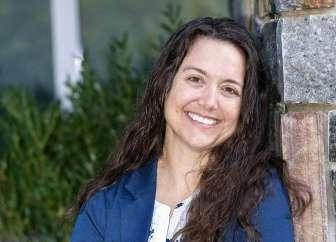
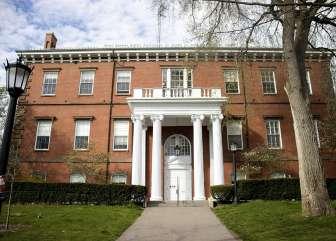
University prepares to take belt-tightening measures Page 5
FEATURES

Roommates flourish over four years of cohabitation Page 22

Professor of the practice union goes to the drawing board with university Page 6

Double trouble: Seniors graduating with unique degrees Page 23

No encore for music dual degree program Page 28
Tufts 3Ps, Torn Ticket II seniors take final bows Page 28 Professor Tasha Oren spotlights film and media studies program Page 36

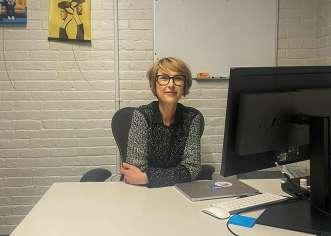

Jumbos en route to Paris Games 2024 Page 46 Russell racks up records on women’s basketball Page 46

delivers standout senior season Page 47
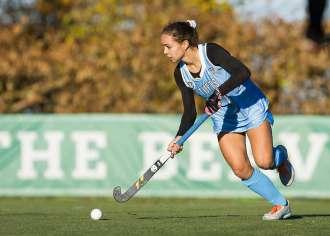
Zeta Phi Beta, historically Black sorority, arrives to Tufts’ campus Page 14
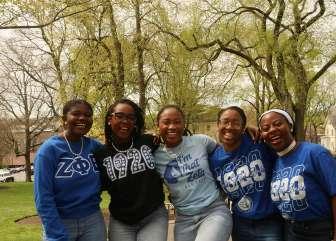
CS TAs close computers, touch grass in thrilling soccer league Page 26
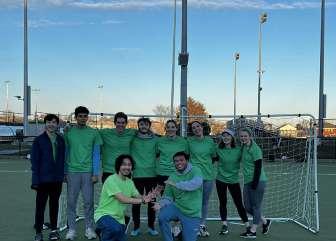

Editorial: Reveal course reviews before registration Page 38
COMMENCEMENT 2024 2 SUNday, May 19, 2024 THE TUFTS DAILY Letter from the editor 21 45 NEWS In This Issue News editoriaL sCieNCe features fuN & games games opiNioN sports 4 38 19 28 39 46 arts & pop CuLture
OPINION
ARTS
SPORTS
FRONT/BACK PHOTO CREDIT: VERONIKA COYLE 3
DelGiudice
dear Class of 2024, friends and family,
Today marks a key moment in your Tufts journey and a well-deserved waypoint of celebration. your contributions have illuminated campus over the past several years as leaders, artists, scholars, advocates, friends and Jumbos. Many of you received your high school diploma in the glow of a computer screen or standing six feet apart, socially distanced from your peers. For that, we are ever more grateful to see you come together as a class one final time before dispersing into the wider world. Beyond the symbolic events of today, the graduates’ efforts on any ordinary day exemplify the sustained dedication and perseverance that have led them to this point and that will serve them well in the future.
as you hear the Goddard Chapel bells ring a final time as Tufts students, I hope you take a piece of Tufts with you wherever you go next. Near or far, the daily serves to keep you informed and connected to the university community.
LETTER FROM THE EDITOR IN CHIEF
Congratulations, Class of 2024
This semester, the daily’s reporters closely followed campus protests, standoffs with administration and student government resolutions amid an international movement of solidarity with Palestine. We covered developments impacting Tufts’ host communities, from the closure of a state prison to new business activity in davis Square. We recorded a rare moment of stillness on campus during the solar eclipse one april afternoon.
as our flagship print edition of the year, the Commencement Issue represents a time capsule of the Class of 2024’s Tufts experience. These pages highlight seniors’ achievements of every kind and bonds forged over four years. at the same time, we look toward Tufts’ future via the annual interview with the president and profiles of incoming student and faculty leaders.
This 52-page issue rests in your hands thanks to the combined effort of the daily’s staff.
I am deeply grateful to everyone who has written, snapped photos, edited, designed or craft-
ed anything for “the newspaper club,” which grows stronger with each individual contribution.
To the 89th Executive Board, thanks for being dedicated leaders of your respective sections and, personally, thank you for your friendship and feedback. Shoutout to the spectacular crew of: adi, Bex, Carl, Carmen, Caroline, Charlene, Chloe N.S., Claire, devna, Estelle, Josue, Kathryn, Matthew, Max a., Max S., Megan, Meghna, Michelle, Mike, Natalie, Nate, Nina, Rachel W., Sam, Sarah, Siya, Spencer, Toby, Tom, Ty and Veronika. I am excited to see where you go next!
To the 89th Managing Board — arielle, Izzy, Julieta, Marlee, Merry and Olivia — I am proud to call you my friends and co-leaders. Time and again, I have leaned on your insight and your distinct perspectives. you’ve given so much to this organization and you do it with unwavering care and compassion. This semester has been one to remember and I am lucky to have you by my side. To the incoming Managing Board, I
look forward to cheering on your accomplishments in the fall. Thank you to the daily’s graduating class — besides the seniors named above, I would like to thank Julia and Chloe C.B.; my co-associate editors aaron and Maddy; and Copy section legends Chris, abi and Megan; among others. Best wishes to everyone in the future! a major thanks, as well, goes to the broader daily alumni community for their continued advice and support.
To our readers, thank you for engaging with our work as an independent student-run newspaper. This semester, nearly 500 of you responded to our audience survey, and we are eager to implement your ideas and feedback as we enter our 45th year of existence. If you have additional feedback, story ideas or contributions, don’t hesitate to reach out at daily@tuftsdaily.com.
Finally, congratulations to our newest Tufts alumni — please stay in touch!
Pax et Lux, Rachel Liu Editor in Chief, Spring 2024


COMMENCEMENT 2024 3 SUNday, May 19, 2024 THE TUFTS DAILY Visit tuftsdaily.com/tips P.O. Box 53018, Medford, M a 02155 T he T uf T s D aily Rachel Liu Editor in Chief Julieta Grané Merry Jiao Managing Editors Marlee Stout Arielle Weinstein Associate Editors Olivia White Production Director Isabel Francis Business Director Matthew Sage Carmen Smoak Nate Hall Toby Winick Spencer Rosenbaum Adi Raman Estelle Anderson Maxwell Shoustal Nina Zimmerman Chloe Nacson-Schechter Veronika Coyle Michelle Shiu Bex Povill Rachel Wong Sarah Feinberg Josue Perez Carl Svahn Megan Amero Sam Berman Siya Bhanshali Mike Kourkoulakos Charlene Tsai Devna Aggarwal Claire Wood Natalie Bricker Kathryn Hood Max Antonini Meghna Singha Tom Jamieson Amber Abdul Anne Li Melinda Yung Ty Blitstein Caroline Vandis Executive News Editor Executive Features Editor Executive Arts Editor Executive Opinion Editor Executive Sports Editor Executive Science Editor Executive Investigative Editor Executive Editorial Editor Executive Audio Producer Executive Video Editor Executive Photo Editors Executive Graphics Editors Intentionality & Inclusivity Chairs Education Chair Social Chairs Assistant Production Directors Executive Layout Editors Executive Copy Editors Executive Social Media Managers Executive Newsletter Editor Assistant Business Director Ad Managers Alumni Liaisons Editorial Multimedia Committees Production Business Founded in 1980, Land Acknowledgement Story tips? Questions? Concerns? The Tufts daily is the entirely student-run newspaper of record at Tufts University in Medford, Mass. an editorially and financially independent organization, the daily’s staff of more than 100 covers news, features, arts and sports on Tufts’ four campuses and in its host communities. The Tufts daily office is located on the colonized land of the Massachusett people and within the territories of the Nipmuc and Wôpanâak (Wampanoag) tribes. Let us know! visi t tuftsdaily.com/masthead
REYA KUMAR / THE TUFTS DAILY
The 89th Managing and Executive Boards are pictured outside the Daily’s newsroom.
Q&A: University President Kumar talks future of budget, admissions, campus speech
Matthew Sage and Rachel Liu Executive News Editor and Editor in Chief
Nearing the close of his first year in office, University President Sunil Kumar sat down with the daily on april 29 to discuss all matters Tufts and the university‘s future, reflecting on the year marked by student activism.
Editor’s note: This interview has been edited for length and clarity.
The Tufts Daily (TD): We wanted to start by asking: What have been the most significant accomplishments — and of course, challenges — that the university has faced this year?
Sunil Kumar (SK): There have been a lot of accomplishments. We recruited a large number of new faculty, with a new faculty cluster in climate. We will announce a housing supplement program for faculty, because it’s becoming increasingly hard for our faculty to live in this area — it’s gotten more expensive. The nutrition school started the Food is Medicine Institute, a very large research enterprise. On student life, we will announce a fairly major initiative on social mobility, increasing access to our programs and wraparound services. We have a proposal to set up a new, previously existing student pub on campus.
But of course the year has been challenging, with the IsraelHamas war and its implications on our campus. It’s also been challenging to see lowered enrollment in some of our master’s programs. and of course, the whole landscape of higher education with the Supreme Court decision on affirmative action is also in flux. That’s a challenge we’ll have to deal with.
TD: I’m sure you read the april Fools’ email announcing your supposed death. We’re wondering what ran through your mind when you read that rather shocking email, and what you think of the concerns raised by that email about Tufts Technology Services’ vulnerabilities.
SK: The way I characterize this to people — I don’t know if this is an unfunny joke or not — but was that the announcement was accurate, it’s just hopefully a few years premature. So I can roll with it. But a portion of that email got edited and sent to my family in India without the april Fools’ part, so there was a little bit of panic back home in India — which is not so funny. TTS has fixed the vulnerability, but there were other ways the vulnerability could have been exposed.
TD: Students have noted that we don’t really see you very often walking around campus or interacting with students that often. Can you speak more on why that is?
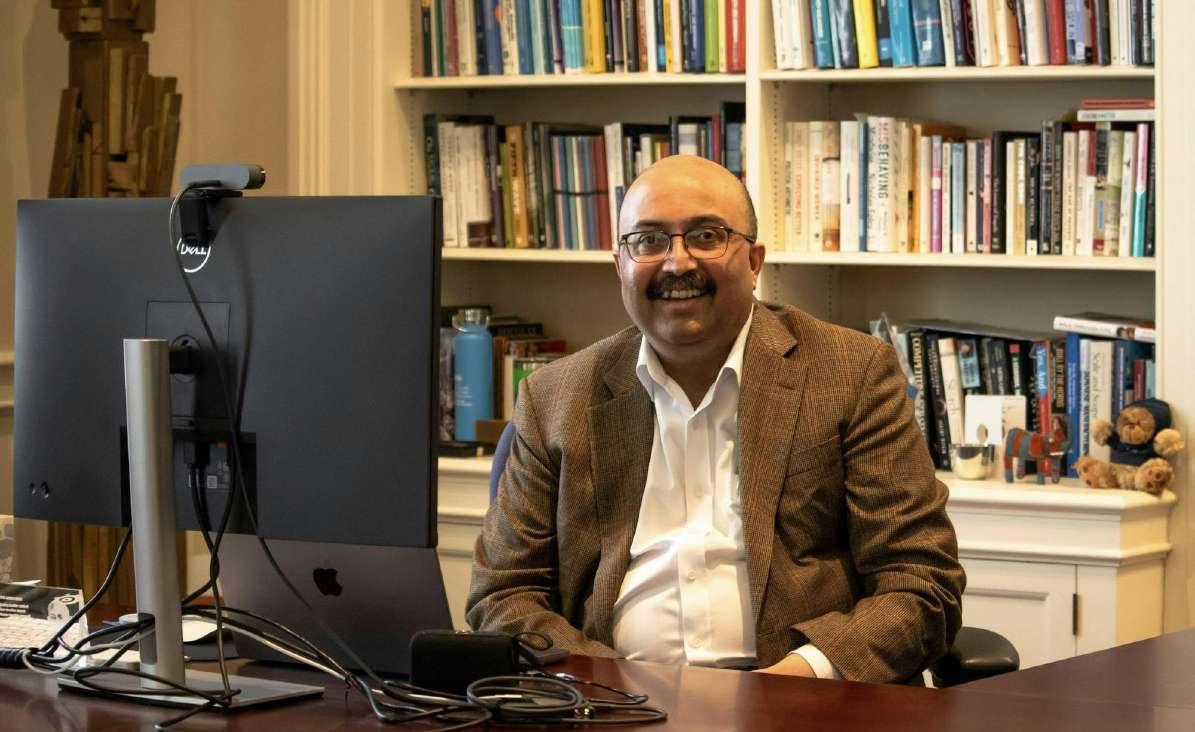
SK: If you look at my waistline, you’ll realize I don’t walk much. But I go to a lot of events, so I think it’s the chance encounter that they’re missing. In fact, I’ve gone to eight or nine various sporting games, including a rowing regatta. I went to dinner at the delta Tau delta fraternity house. I do these structured events a lot. That said, I want to change one thing next year: I am going to start hosting breakfast with small groups of students who have been randomly chosen, so that I can get to know you all as individuals.
TD: In light of recent campus events, we’ve sensed an apparent lack of trust in the administration in its ability to listen to student voices. do you see this as being true, and if so, is it warranted?
SK: In some student groups, I think there is some lack of trust. I think it comes from the fact that those groups assume that because I don’t do exactly what they say, I’m not hearing them — I am hearing everyone. I talk with the [Tufts Community Union] leadership on a frequent basis. When the TCU Senate resolutions passed, and after I wrote the leadership response, I met with them immediately. The fact that I couldn’t do what the resolutions asked me to do does not mean I don’t respect or listen to the TCU Senate.
Given how difficult the last year has been, I’ve had to say “no” more often than any president likes to do. I would like all of our students to believe that I have their best interest at heart, and to know that I’ll work towards that. But at the same time, I have to make decisions that are in the best interest of the universi-
ty, which is sometimes not what people want to hear.
TD: Given all that happened at the TCU Senate’s March 3 meeting to vote on four Israeli-focused resolutions and the administration’s immediate response the day after, what do you think the role of the TCU Senate should be?
SK: I think the TCU Senate is extremely important. With that meeting and that set of resolutions, they were in an extraordinarily difficult position. Given that, I don’t think that’s the standard by which the relationship between the TCU and me and my office should be judged. On lots of other things, I take the TCU Senate extremely seriously and I want to work closely with them. I intend to work closely with [incoming TCU President] Joel [Omolade], in the same way I work with arielle [Galinsky]. That should not be seen as somehow being dispositive of the relationship — it was just an extraordinarily difficult situation.
TD: With student protests and arrests across the country, where do you see the fate of students’ freedom of speech on college campuses going from here?
SK: I speak for my campus primarily. We have well-established guidelines for the freedom of expression on campus. I consider that a binding document. I believe that the university should, as far as possible, allow for the free expression of ideas, debate, conversation and dialogue, even when sometimes it is uncomfortable.
But there are limits to what you can say and do. The part that I find the most worrisome, the limit I feel cannot be easily crossed, is saying that my right to speech
should take away yours — that my freedom of expression must come at the expense of somebody else’s. I don’t think that freedom of expression translates to a veto on other people’s right to speak.
The second is a more nuanced one. It’s more about norms rather than rules: Just because you can say something, doesn’t mean it must be said. If you intend it to be deliberately hurtful, then that is a problem. When it rises to the level of intimidation or harassment, we have processes. But short of that, I think a university should be a place where people feel free to engage in discourse, however disconcerting it might be.
TD: Shifting tides a bit, we know that tuition is rising — we’ve just surpassed a $90,000 sticker price — and we know that the university plans to take budget cuts. What gives?
SK: There’s a straightforward reason for this. a significant portion of our collected undergraduate tuition simply goes back into financial aid. So if you look at net tuition, which is collected tuition minus tuition given out in financial aid — the actual amount of money that the university collects post-financial aid has actually declined. Last year, I think we gave $145 million in financial aid, because we meet demonstrated financial need for all our students.
yes, it’s a budget difficulty, but it’s a relatively small magnitude, [approximately 3%], because of our weakness in master’s enrollments across the professional schools primarily.
That said, we would like to think of the undergraduate tuition as essentially having very limited growth, and we want to keep increasing our finan -
cial aid budget. and in terms of the headcount, we’ve reached our max undergraduate student enrollment for the next few years. In particular, I’d like about 70% of my students to be on campus, and we’re not there yet. With the new residence hall, we’ll get there.
TD: Can you share more about the new residence hall?
SK: It’s still early. We’re working with development firms; it will be along Boston avenue, and it will be a substantial residence hall with a few hundred beds. How exactly the university will pay for it is still being worked out, but this fall [will probably be] when we go to the trustees for final approval.
TD: Now onto admissions: affirmative action was ruled out, nearby schools like Harvard have reinstated test requirements and Tufts is still need-aware, not need-blind. Where do you see the future of admissions going? are you worried about any impact on diversity?
SK : The Supreme Court decision will impact diversity in some way and so we have to work to live up to our values. JT duck, our dean of admissions, has been working to substantially increase the number of high schools we visit. The first thing you’re worried about is that not a sufficiently broad array of students will apply because they’ll think it’s not affordable.
On the SaT, we’re doing the analysis right now. I’m trained as a probabilistic statistician. We are running logistic regressions to see what impact SaT scores have.
NEWS 4 SUNday, May 19, 2024 THE TUFTS DAILY NEWS
VERONIKA COYLE / THE TUFTS DAILY
The Daily sat down with University President Sunil Kumar for an annual interview.
see KUMAR, page 5
UNIVERSITY
Sunil Kumar sits for annual Daily interview
KUMAR continued from page 4
In particular, there are two countervailing forces here. One is, we’re worried that students who can do very well at Tufts are not applying to Tufts because the SaTs are one way in which they are distinguishing themselves. On the other hand, there are lots of students who believe their SaTs score isn’t high enough. If you had insisted on SaTs, they might not apply.
We don’t want to make a sudden decision because high school counselors advise students as to when to take tests. you don’t want them scrambling at the last minute because some school that they would love to apply to in the fall suddenly said, “Well, you’ve got to take a test in the next two months and submit scores.” It’s not fair. We’ll give a little bit of leeway to figure out when the test will be due.
Now let me turn to needaware versus need-blind. We don’t have the resources to be need-blind. The philanthropic aid we will need in order to go need blind is currently beyond our reach, but we will work towards it.
TD: Now, you’re coming to the close of your first year at Tufts, and James Glaser, dean of the School of arts and Sciences, is set to depart at the end of this school year. How do you see this new senior leadership team, you and the new dean, changing the trajectory of Tufts as an institution?
SK : First, I want to thank Jim for all that he’s done. He’s been here 32 years, and he’s been a terrific dean. We’re all going to miss him. With the new dean, there are three areas where I would like this person to concentrate on.
One is, continue to prioritize undergraduate education and the student experience, both curricular and cocurricular.
The second is: a rts and Sciences has an amazing number of outstanding scholars on its faculty. It has very good graduate programs and so on. I would like the new dean to be a scholar who appreciates the value of scholarship and can grow the scholarly footprint of the school as well.
To do both of these things, the new dean will have to raise more resources in order to be able to afford supporting faculty scholarship as well as the undergraduate experience in the best possible way. We need somebody who has the right priorities and values and the ability to raise money to support those priorities.
TD: How do you believe your leadership differs from past presidents?
SK: I never worked for [former University Presidents] Larry Bacow or Tony Monaco, so all I can say is about my leadership style. I’m a careful, data-driven person who likes to look at all the evidence and consult broadly before I act.
TD: I wanted to return to the social mobility initiatives you brought up previously, as a lot of recent graduates are concerned about the job market.
SK: This is a very high priority for me. It’s not just about getting people a job. One of the huge advantages of a school like Tufts, which provides a broad based liberal arts education, is that practically every avenue is open for you. But, you don’t know which avenues are open for you, and which avenues you like, unless you sample them. We want to find ways for people to use internships to spend time in a lab, an NGO, middle school teaching, working in the corporate world — whatever it is — so that they form an opinion of what their purpose is in life. For me, I discovered this entirely by accident. I didn’t set out to be a faculty member. I see this as an investment in not just improving its transactional efficiency — the ability to get more jobs for students — but serving as a partner to the curriculum, as people figure out where in the real world they want to make their mark.
TD: What do you think are the biggest obstacles facing Tufts right now, and for the next five years?
SK: One is, of course, the landscape of higher education as a whole and how that’s evolving. This is an extremely competitive market. you only have to go two T stops to find another decent university and another two T stops to find another decent university.
For Tufts, it’s maintaining its unique kind of niche. It’s a major university that masquerades as a liberal arts college, which is a great thing. We want to keep that intimate feel, while at the same time having all the resources of the university. For example, how can the undergrads take full advantage of all the opportunities the university has to offer? you know, I would love to know how many undergrads actually spend time in Grafton. Grafton is where our veterinary school is — it’s got puppies. How do we take advantage of the university part to strengthen the liberal arts college part and take the liberal arts college part and strengthen the university?
TD: How do you think your first year at Tufts has gone?
SK : I could have picked an easier year to be a president. That said, I wouldn’t miss it. My wife and I love living on campus. Our favorite time is Saturday mornings when there’s a dog convention on President’s Lawn. We sit outside; I find a spot where people can’t see that I’m in my pajamas. People have been very welcoming, very kind, of course.
TD: What’s your message to the graduating class?
SK : Take risks; go through any open door, because your Tufts degree is your best insurance policy.
UNIVERSITY
Faculty told to prepare for upcoming budget cuts
Ella Kamm Senior Staff Writer
d ue to budget challenges at the university level, administrators and deans of the Schools of a rts and Sciences and the School of Engineering have instructed faculty to prepare for budget cutting measures that will aim to address financial challenges forecasted in the fiscal year ahead.
d epartment heads were told in a February meeting that while a &S and the university as a whole are expected to be in a minor budget surplus next year, there is pressure on the university to bolster that surplus in order to support investments in infrastructure and the endowment.
“While the university’s overall financial situation is healthy, we are facing some near-term challenges, as many colleges and universities are,” Patrick Collins, executive director of media relations, wrote in a statement to the daily.
Collins wrote that there has been “a softening in the market for graduate education.” decreased nationwide demand for residential master’s programs comes at a time when demand for Ph.d. programs, an expenditure, is increasing. Undergraduate enrollment remains stable, and while total student charges will be increasing by 4.4% from Fy2024 to Fy2025, this increase is on track with the average annual increase for peer colleges and universities.
In the same statement, Collins also cited “a tightening labor market increasing competition for faculty and staff.” Increased expenses in healthcare benefits and wages also raise university expenses.
Finally, inflation of the cost of goods and services is also a factor in budget considerations, particularly the cost of construction services, which typically inflates at around twice the rate of consumer goods.
In response to these fiscal concerns, the adminis -
tration has instructed the a S&E schools to prepare for belt-tightening measures.
Silke Forbes, a professor of economics, said that the administration has described these measures as cautionary rather than in response to an emergency situation.
“a s faculty and staff we received an email from the president and the provost outlining the austerity situation,” said Forbes, who is a member of the Budget and Priorities Committee but on a one-year sabbatical. “[We] were told that this will directly impact compensation. So, the intended merit raises that we usually receive year over year will be lower than planned. Not dramatically lower, but lower. … That’s the only concrete thing I’ve received.”
Some departments have already felt the effects of the university’s budget cuts: In May, nine employees in Tufts Technology Services were laid off.
“In response to the financial challenges facing colleges and universities nationwide, including Tufts, the university’s leadership asked all schools and units to identify revenue enhancements and expense reductions to improve the budget situation,” Collins wrote in a statement.
“TTS does not expect any of these changes to impact its core functions or to adversely effect the classroom experience, which is our highest priority,”
James Glaser, dean of the School of a rts and Sciences, and Kyongbum Lee, dean of the School of Engineering, told the d aily that faculty are accustomed to budgetary ebbs and flows and that generally salaries are not on the chopping block.
“d epartments and faculty may feel some of the measures but the schools’ leadership will protect certain areas like faculty compensation and stu -
dent-faculty ratios,” Glaser and Lee wrote in a joint statement.
The rest of the specific budget cuts have yet to be announced, though faculty have been given a general idea of what measures are being considered. Glaser and Lee told the daily that excessively small class sizes will be reevaluated.
“Really small courses are not efficient,” they wrote. “We do expect classes to meet certain thresholds as we try to maximize our resources and offer the broadest curriculum possible. This is not new and has been our policy for some time. Cancelling very small courses also allows us to invest in areas where there is greater student interest.”
There will also likely be cuts to the facilities budget, which concerns buildings, furniture and equipment, as well as reduced funding for extra expenditures such as food at events.
“Often what happens is that capital spending, so investments, are drawn out over time,” Forbes said. “There are a lot of buildings on the quad that are old and they’re scheduled for renovations and upgrades, and I assume, that’s my speculation, that that will slow down.”
Forbes, Glaser and Lee all said that students will likely not notice the impact of budget cutting measures in any significant way. additionally, according to James Hurley, vice president for finance and treasurer, undergraduate financial aid will not be affected.
“There shouldn’t be a dramatic impact,” Forbes said. “We’re not going to shut things down.”
“There’s a general understanding that our two schools are stronger because we’re part of a larger constellation,” Glaser and Lee wrote to the daily. “That said, faculty are concerned about any potential erosion in the quality of education or any potential loss of ground in our research profile. an extended period of austerity is more likely to draw out those concerns.”
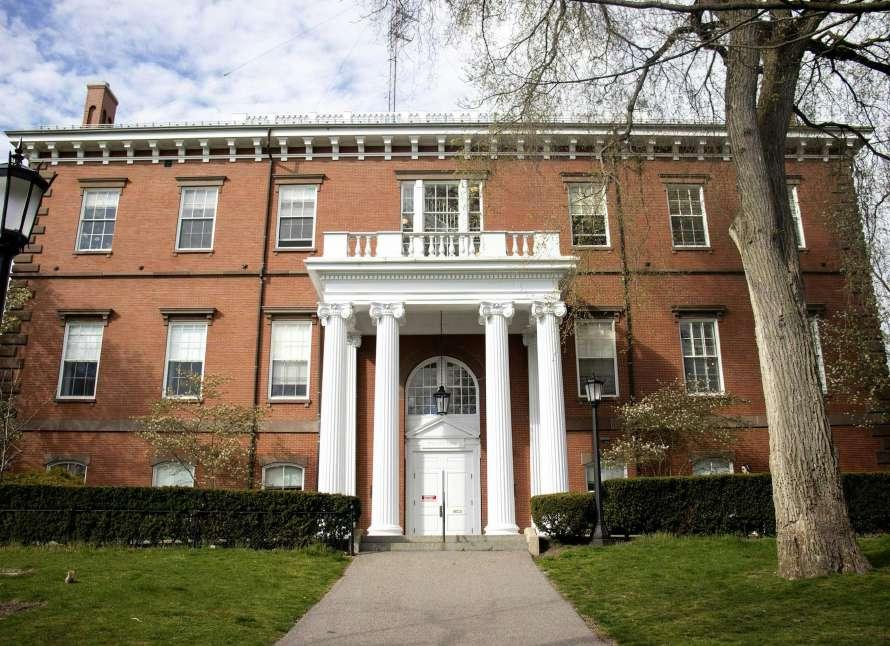
NEWS 5 SUNday, May 19, 2024 THE TUFTS DAILY
VERONIKA COYLE / THE TUFTS DAILY Ballou Hall is pictured on April 29.
SMFA professors of the practice hold first contract negotiations
Samantha Eng Assistant News Editor
Professors of the practice at the School of the Museum of Fine arts at Tufts held their first-ever bargaining session with the university on april 24, seeking a contract that would guarantee wage increases, enhanced research support and more transparent employment policies, among other negotiations. This marks the first time that SMFa professors of the practice have initiated a bargaining agreement since SMFa merged with Tufts in 2016.
SMFa professors of the practice are represented by Service Employees International Union Local 509, which also represents part-time lecturers at the School of arts and Sciences, part-time lecturers at the SMFa and Tufts graduate student workers. In august 2022, part-time lecturers from both schools established a five-year contract with the university, which SMFa part-time lecturers reopened in September to address faculty compensation structures.
“First-time contracts, like the one the professors of the practice are bargaining for here, often take a year or more to negotiate,” Patrick Collins, executive director of media relations, wrote in a statement to the daily. “The university believes that there are opportunities for alignment between the professors of the practice and the a&S faculty, includ-
Daniel
ing the full- and part-time lecturers, while also being mindful that each negotiation is unique and presents unit-specific circumstances that must be addressed.”
PoPs, who comprise many of the full-time faculty at the SMFa, are in charge of conducting research, teaching and advising students and developing the SMFa’s curriculum, among other responsibilities.
“We have … really world-class faculty. That’s part of what … is unique in this group of PoPs. They’re just incredibly impressive people and artists, thinkers [and] makers,” Reiss said.
This year, Reiss was one of 11 individuals at Tufts to receive a Springboard Fellowship, a grant program offered by the university.
“Other PoPs include Tanya Crane, a 2024 U.S. artists Fellow; and Rachelle Mozman, a 2024 Guggenheim Fellow.” However, despite support from fellowships, Boston’s high cost of living makes it difficult for PoPs to support themselves.
“[There are] really prestigious and fantastic opportunities for our faculty. and yet, we’re all in a similar struggle to live in the Boston area. We’re struggling to be able to afford to buy homes and in many cases maintain studio space,” Reiss said.
Through their contract, the union aims to give professors of the practice the support that they need to devote sufficient time and energy into teaching their students.
Dennett,
Tufts
Reiss explained that there is a direct relationship between the quality of professors’ working conditions and the quality of the support they can offer their students.
“How much better could we support our students if we had more time ourselves and more clarity on our workload and different research funding supports?” she asked.
at the beginning of the bargaining process, the union sent surveys to PoPs in which they could lay out their priorities for the negotiations. One of the main priorities that emerged was introducing a system of rank and progression, which would provide mentorship for new faculty and allow PoPs to build their careers within the university.
acquiring more research funding is also a key priority for the union. as McMillan explained, professors of the practice often incorporate their research into their own teachings.
“We’re always trying to innovate in terms of curriculum development and see how we can make very real-world experiences for our students,” she said.
In a statement to the daily, SEIU Local 509 President david Foley wrote, “We are determined to win a strong contract that recognizes the labor of SMFa Professors of the Practice. Local 509 members at Tufts University know firsthand the work it takes to keep the prestigious universi-
UNIVERSITY

ty running and we stand behind Professors of the Practice as they fight to have their work valued and fairly compensated.”
In recent weeks, many SMFa students have expressed their support for PoPs through attending events hosted by the Tufts Labor Coalition, signing the professors’ online petition and spreading awareness about the union’s ongoing negotiations.
“It’s been incredible to see the student support. … I’m just incredibly humbled by that,” Reiss said. “It’s part of the reason why we’re all here. Our community is remarkable and people are dedicated and really so committed to the work of civic engagement on many levels, and that takes place right here in our community in a big way.”
The second bargaining session is scheduled for May 29, according to Collins. The university previously requested to cancel a May 15 session so that faculty members can attend the final a&S faculty meeting with outgoing dean James Glaser. The union requested that the June bargaining sessions be cancelled as well.
“due to the departure of the union’s long-time business agent, Chaz Carroll, the union requested that the parties cancel their June sessions,” Collins wrote. “We want to be clear that these cancellations do not reflect a lack of commitment by either party. We look forward to our next session and to our continued work with the professors of the practice.”
professor emeritus and renowned philosopher, passes away at 82
Nicholas Prather Assistant News Editor
On april 19, daniel dennett, University and Fletcher Professor of Philosophy Emeritus, passed away at the Maine Medical Center in Portland, Maine. His death was caused by complications from interstitial lung disease.
Known globally for his works on consciousness, religion and evolution, dennett came to Tufts in 1971 and served as a professor of philosophy until his retirement at the end of 2022. dennett also established and directed the Center for Cognitive Studies at Tufts and was a key figure in the establishment of Tufts’ first computer science program through his work on the Curricular Software Studio. dennett is survived by his wife of over 60 years,
Susan Bell dennett, as well as their son, daughter and six grandchildren, and his two sisters.
a statement issued by the Tufts department of Philosophy commended dennett for his “wisdom, sense of humor, dedication, and generosity,” and stated that it was “a privilege and an inspiration” to work with dennett. a separate statement from James M. Glaser, dean of the School of arts and Sciences, hailed dennett as a “once-in-a-generation scholar, teacher, and colleague,” citing both the 21 books that dennett wrote and the 18 written about him as testaments to his status as an esteemed international intellectual figure. The Tufts department of Philosophy plans to hold a larger memorial event to celebrate dennett’s legacy this October.
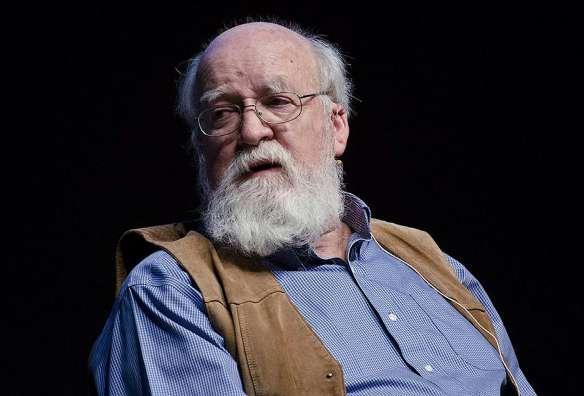
George Smith, fellow professor of philosophy emeritus, was d ennett’s closest colleague at Tufts. The two knew each other for 51 years, worked together for 46 years and even retired together at the end of 2022. In dennett’s final memoir, “I’ve Been Thinking,” published last year, he dedicated an entire chapter to his relationship with Smith. Smith also cited this memoir as where Tufts students interested in d ennett should begin exploring his work.
Smith described what he wanted people to take away from d ennett’s life and work, namely his effort to eliminate what he considered sources of confusion generated by belief in the supernatural.
“Philosophers think that one of their duties as professional philosophers is to identify sources of confusion, expose them and convince people to give up these sources of confusion,” Smith said. “Now what unified all of dan’s thoughts is that he thought one single element was the greatest source of confusion in all of human thought: namely, any kind of appeal whatsoever to the supernatural.”
Teresa Salvato, the program administrator of Tufts’ cognitive science Ph.d. program, was dennett’s assistant for over 25 years. She cited the clarity and eloquence of dennett’s writing
style as one of his most important scholarly contributions.
“I think one of his greatest contributions is that he was thought-provoking,” Salvato said. “He was an engaging writer that could be read by people from all fields and he asked a lot of thought-provoking questions. Whether you ultimately agreed with him or disagreed with him, he made you think. and I think that was one of his greatest gifts.”
Professor avner Baz, chair of the department, explained how dennett’s influence changed his own thinking.
“Nowadays, I will be much more open to taking into consideration, even as I speak about experience, phenomenology, perception [and] empirical findings in a way that I wasn’t open to before,” Baz acknowledged.
Baz also shared how dennett helped fundamentally change the course of the department of Philosophy.
“He has contributed to the department being a very ambitious department. and a department of many people who are, in one way or another, outsiders who don’t think within the box,” Baz said.
Similarly, Salvato shared details about dennett’s creation of the Center for Cognitive Studies.
“Tufts administration wanted to keep [dennett] and they said, ‘What do you want?’
Salvato said. “So they created this place that was like a fun playroom, from an academic point of view, a place where he could do whatever he wanted. So he did all the research that he wanted to do, and the postdocs who came were people that were eager to do that work with him.”
as for his personality outside of the classroom, Smith highlighted his consistency in manner and demeanor across all walks of life.
“d an in public was exactly the same person as d an in private,” Smith said. “He just lived life to the hilt, all the time. So how he presented himself to students, how he presented himself to colleagues [and] how he presented himself to other philosophers, is exactly how he was. a nd I can’t say the same thing about myself.”
Likewise, Salvato described d ennett’s affability, easygoing nature and close-knit relationships with students and faculty.
“[ d ennett] loved to tell stories. He did a ton of traveling and had a lot of experiences, so he always had a story ready to tell you,” Salvato said. “He would often host parties at his house for students and postdocs and visiting fellows. … He would have cider-bottling days, where everyone would
NEWS 6 SUNday, May 19, 2024 THE TUFTS DAILY
UNIVERSITY
CHARLENE TSAI / THE TUFTS DAILY
The School of Museum of Fine Arts is pictured on April 5, 2023.
VIA AEGIR PHOTOGRAPHY/FLICKR
see
Daniel Dennett is pictured in 2012.
DENNETT, page 7
Outgoing TCU President Arielle Galinsky talks Senate initiatives, relationship with administration
Matthew Sage Executive News Editor
arielle Galinsky, the outgoing Tufts Community Union president, sat down with the daily to reflect on her fourth and final year on student government, highlighting accomplishments and responding to criticism.
Editor’s note: This interview has been edited for length and clarity.
The Tufts Daily (TD): Tell me about who you are, where you’re from and what else you do on campus.
Arielle Galinsky (AG): My name is arielle Galinsky. I’m a current senior and soon to be Tufts grad, from Canton, Mass. — not too far from Tufts’ campus. Beyond the TCU Senate, I’m very involved in TEdxTufts and the Legacy Project, which is a club I helped to co-found during my sophomore year.
TD: Tell me about your senior year and your year as TCU President in review. What did you get done, and what are you most proud of?
AG: I’m very proud of a multitude of things that we were able to accomplish. First, we institutionalized a lot of different projects. We were able to do that with the menstrual product project and TCU Senator anand Patil’s first-aid kit project. We were able to work with Generation Conscious to get [sustainable laundry products] in the Mayer Campus Center and [the] FIRST [Resource] Center. The Wellness Space has opened up in Stratton Hall, which is really exciting, now that it’s also in partnership with many other different campus partners. The Jumbo Spring Break trip was something that came out of the TCU Senate. We worked with the dean of Students Office and other campus collaboratives to ensure that it could grow and continue in future years.
We really tried this year to build community. So for the first time, we had leadership lunches by reaching out to student leaders. We put on three Tufts Tables events, which ultimately sought to bridge differences. We did town halls — a continuation from last year — to build community. Our two caucuses, the Black senate caucus and the Jewish senate caucus, were pretty active this year. We also hosted the leadership gala, which sought to uplift student leaders and to award a few who really went above and beyond this year in their student organizations.
Lastly, I’m really proud of the heightened transparency of the TCU Senate. For the first time we
started a campus-wide newsletter, highlighting what the Senate was doing and how to get in contact with members of the executive team. We also had a project to post all of our past resolutions and past minute notes, and more.
TD: How do you think your leadership style shaped this year for the student body and for the TCU Senate?
AG: I’ve always known the importance of making sure you’re entering diverse spaces to get diverse perspectives — not being in an echo chamber, if you will. I tried to expose myself to and enter myself into spaces where I knew there was a diversity of thought, so I could make sure I was getting a 360 degree view of campus perspectives so I could accurately uplift that. Being a listening ear, to not insert myself but rather to gather those kinds of perspectives and utilize that as a driving force behind the TCU Senate’s efforts.
TD: Now, a bigger question: Tell me about March 3, the 4 ½ hourlong TCU Senate meeting to vote on four resolutions to distance Tufts from Israel. Can you tell me about how you chose to run that meeting and how you handled its aftermath?
AG: I want to backtrack to the broader topic. We, as the TCU Senate body, never posted a positional statement about the issue of what’s happening in Israel and in Gaza. I don’t think that’s in line with what the TCU Senate has done in the past, and it was not necessarily well supported by everyone. as a representative body of students on this campus with such a diversity of perspectives, I felt very strongly that we could not encapsulate all of those perspectives in an Instagram post or in a statement. Instead, I recommended that we utilize our position as senators to be individual advocates for our communities, and instead advocate for a list of different things that we could support students on.
Some have said that the TCU Senate had no business in facilitating this conversation — I think that’s potentially true. Regardless, it is what happened. I will say that there were imperfections with how everything went down, but I will not say that we were unprepared or did not think through different scenarios. This was our main primary focus and our lives leading up to this meeting. There was significant conversation in preparation to ensure that physical safety was prioritized for all students in that room, so that no
one felt like they couldn’t share their perspectives.
We had created a set of guidelines for respectful conversation. Transparently, we didn’t have a ton of enforcement mechanisms. I’m apologetic for the fact that a lot of students were hurt through that. We were very clear in the beginning through our guidelines that any form of hateful rhetoric or speech was something we would condemn, but a lot of that didn’t come to surface until after the meeting’s actual procedures.
There [were] a lot of [questions] as to why we didn’t stop people from saying certain things, but from my perspective, that wasn’t our place. We were facilitating a conversation. By nature of the topic, it was going to be uncomfortable, it was going to be tense and we wanted to provide a physically safe environment for that.
In the aftermath of the meeting and the university president’s email, no one was particularly happy. as president, I tried to reach out to the different communities that felt most impacted — the resolutions’ authors as well as students against the resolutions — and speak with them to see how we could support them. I think a lot of people lost faith in the Senate that evening, and for understandable reasons. We tried to maintain and build up that trust again.
TD: University leadership put out a statement just 12 hours later disavowing the three resolutions passed by the TCU Senate. What does this reveal about the nature of the relationship between the student body, the TCU Senate and the administration?
AG: Largely, the TCU Senate and the administration have a very good relationship. This was potentially an outlier.
We were not aware that they were going to respond so quickly, one way or the other. I spoke to President Kumar and asked exactly about this, because I think a lot of senators were more upset by the rapid nature of the email. He noted that the email’s quickness was because they had already known their decision and did not feel it fair to students to delay their response. I think it caused a mistrust of the administration — and as an extension, the Senate — as a result of the rightful feeling that some of the processes we went through were futile.
TD: That segues well into my next question. What misconceptions do you think students typically

have about both your role and the TCU Senate as a whole?
AG: I can think of a few. There’s the misconception that senators don’t do anything, and that nothing comes out of the Senate. In part, that’s potentially something we need to continue working on — uplifting the work that we do. I think senators are consistently working very hard and are often disheartened by this common misconception. a nother misconception is that the Senate is a full-time job. a lot of students aren’t super forgiving that [senators] are also students, while balancing this massive role. That leaves a bad taste when things take longer than students want, but it’s because we are also balancing the same academics as everyone else.
That is also reflected in the budgeting process. We try to make everything as accessible as possible, but we have a limited budget that we’re allocating. Not every single group can get everything that they’re requesting, and that often leaves mistrust in the Senate. We’re trying to disperse it in a way that’s equitable and fair among the over 300 student groups.
There’s another misconception among some students that we’re against them or that we’re friends with the administration instead of supporting students. I want to dispel that myth: We have this partnership with administration for the purpose of uplifting students’ voices.
Lastly, I think a lot of people view our organization as a monolith, which is not true. We are purposely a body of students that are semirepresentative of the larger student body with a multitude of different perspectives, projects and things we care about. you might think one way or another, but you can still be a part of our
body because that’s the beauty of having diversity.
TD: Going forward, what needs to change about the TCU Senate?
AG : The TCU Senate has made a change over the past few years toward more events and programs over policy changes. There’s some beauty to that in that the Senate is more student facing, but we’re also spending less time on creating long term institutionalized change. I will really promote this switch to my successor, Joel [Omolade] — not to say we’ll get rid of all our programs.
TD: do you have any fun anecdotes from the year?
AG : at every meeting of the allocations Board, we ask students a goofy question, where we sought to create a less intimidating environment. We would start with [something like], ‘If you were in a vending machine, what would you be?’ in order to break the ice.
TD: Well, if you were in a vending machine, what would you be?
AG: a Celsius.
TD: What are your plans postgraduation, and what will you take with you from your time as TCU Senate president?
AG : Right after graduation, I’ll be going to d.C. to work for a U.S. Senate committee. In the fall, I’ll come back to Cambridge and attend the Harvard Kennedy School for a master’s degree in public policy. Beyond that, I hope to pursue a career in healthcare policy.
I keep telling people that this year has been a leadership crash course, especially as it relates to the importance of putting yourself in a position where you can hear opposite perspectives and then form a path forward. It’s something that I’ll carry with me for quite some time into my future.
continued from page 6
turn up [at d ennett’s farm] and help with bottling the cider.”
Enoch Lambert, a lecturer in the department of Philosophy, described his time under dennett’s wing as a postdoc in an email to the daily.
“In the classroom, one thing d an liked to do was present a slide with something quite provocative, often one of
his more controversial ideas about consciousness, and then sit back and field objections,” Lambert wrote. “In the classroom he couldn’t be more open to criticisms, taking them in, showing students how seriously he took their ideas, responding as a partner in the cooperative intellectual enterprise he always took himself and his students to be engaged in.”
Similarly, Smith conveyed his experience co-teaching with d ennett in the 1990s, when the two taught a seminar on d escartes’ corpus.
“He was very easy to teach with because he thought of the classroom as a vehicle for him to learn. a nd when it was co-taught, we were learning from one another,” Smith said.
In regard to how dennett impacted Tufts as an institution,
Smith related how d ennett’s major academic standing bolstered the university’s international recognition significantly.
“I think [ d ennett] did more than anyone at Tufts to make Tufts recognized worldwide,” he said.
When asked why d ennett’s work matters today, Smith detailed how many fellow philosophers, incensed by d ennett’s fervent beliefs,
seemed unable to comprehend d ennett’s greater purpose.
“Other professional philosophers very often asked me how we could have coexisted all this time, and my reply is always how that was never a problem at all,” Smith relayed. “They just see [ d ennett] as this barracuda attacking other people’s precious ideas. a nd he saw himself as trying to do the world a favor.”
NEWS 7 SUNday, May 19, 2024 THE TUFTS DAILY
UNIVERSITY
COURTESY ARIELLE GALINSKY
Outgoing TCU President Arielle Galinsky is pictured.
Colleagues remember late philosophy professor DENNETT
Cover to cover: The Class of 2024’s four years at Tufts, reviewed
BY CHLOE COURTNEY BOHL
Editor’s note: The 2020–21, 2021–22 and 2022–23 recaps in this article are reprinted from the 2023 Commencement Issue of the Daily, with light edits.
2020–2021
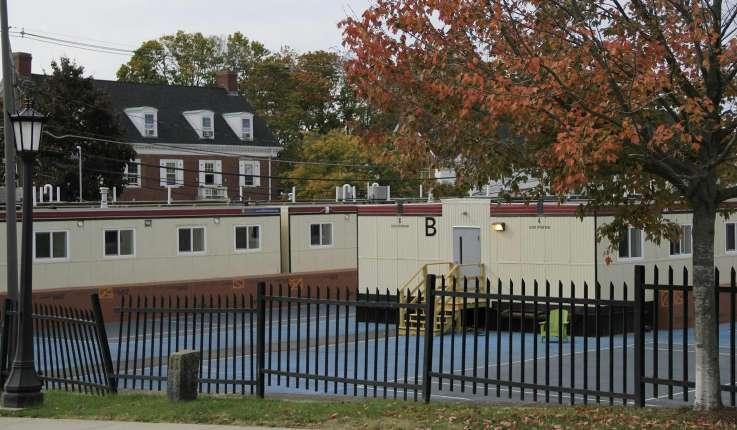
The Class of 2024’s first year on the Hill began unconventionally, with Tufts’ academics and activities adapted to a hybrid model in adherence with COVId19 public health guidelines. While much of the student body was present on-campus through the year, some opted to take classes virtually.
Tufts implemented a number of measures to keep the community healthy, including routine testing for students, pooled testing that extended to Somerville and Medford residents and the creation of The Mods, quarantine housing for students who tested positive for COVId-19 and their close contacts.
Online programming allowed for a robust lineup of speakers through Jonathan M. Tisch College of Civic Life’s distinguished Speaker Series. ThenSpeaker of the House Nancy Pelosi, dr. anthony Fauci, voting rights activist and former gubernatorial candidate Stacey abrams and author Ijeoma Oluo were only a few of the speakers to visit Tufts virtually in the 2020–21 school year.
The division of Student diversity and Inclusion was renamed as part of a larger restructuring effort. This change additionally welcomed three new full-time staffing positions.
The year was also marked by student activism and political engagement. Members of the Tufts community marched in support of the Black Lives Matter movement, formed new campus organizations focused on anti-racism and reevaluated the lack of representation in departmental curricula. This came after a summer of protests and a national reckoning with police brutality and white supremacy in the wake of the murder of George Floyd in May 2020. Student organizations also phone-banked, assisted with voter registration and worked at the polls leading up to the presidential election in November.
Shortly after Joe Biden’s victory in the presidential election was announced, Tufts faced challenges within its own student government when the Tufts Community Union Judiciary suspended the Senate Executive Board and Elections Commission in November.
The Judiciary believed that the Senate Executive Board and ECOM were planning to appoint students to vacant Senate seats — a violation of the TCU Constitution. The Judiciary then revoked its suspension after
less than 24 hours, having resolved what had been a miscommunication between the three branches.
TCU also held a special election at the end of November, which included referenda by Tufts Students for Justice in Palestine and Tufts for a Racially Equitable Endowment, both of which passed. although 42% of the student body voted — the highest turnout for a special election in Tufts’ history — the university announced that it had no plans to take action on either referendum.
Many students left campus early in fall 2020, with Tufts asking those who traveled for Thanksgiving to remain home and complete classes virtually. Students did not return to campus until late January for the spring semester, which began Feb. 1. Most study abroad programs were suspended and spring break was condensed into a three day weekend, in part due to traveling risks posed by COVId-19.
Tufts and its surrounding communities were affected by multiple acts of hate early in 2021. Many reacted to the insurrection at the Capitol that took place on Jan. 6, as well as the involvement of Jessica Turner, a member of the Somerville affordable Housing Trust Fund.
The university shared the results of an investigation in February regarding a September incident involving Tufts University Police department’s response to three women of color hanging a mask on the Jumbo statue as part of a university-sponsored effort to promote JumboVote and Healthy@Tufts. The investigation concluded that discrimination did not factor into the incident.
This announcement came only days before two Zoom bombing incidents — one at a diversity, equity and inclusion event — occurred back to back. Former University President anthony Monaco subsequently announced the creation of Bias Education Response Teams in March, which are designed to address the impact of hateful and discriminatory acts, as well as provide support to the community.
The Board of Trustees voted to ban direct investments in 120 coal and tar sands companies, which was announced in a Feb. 10 email to the community. However, many environmental organizations on campus remained unsatisfied with the decision, citing a lack of divestment in current holdings.
Monaco also shared the recommendations of five workstreams created in July 2020
as part of the university’s commitment to becoming an anti-racist institution in a Feb. 17 email. The workstreams — Institutional audit and Targeted action, Campus Safety and Policing, Public art, Compositional diversity and Equity and Inclusion — were composed of faculty, staff and students.
The Class of 2024 arrived on campus in time to witness the monumental reform and restructuring of Greek life on campus as health protocols prevented traditional rush. Following discussions prompted by the online account “abolish Greek Life at Tufts” over the summer, all members of alpha Phi and the majority of members in Chi Omega disaffiliated from their national chapters, creating local sororities The Ivy and Thalia, respectively. New members were welcomed through virtual recruitment in the spring.
The university announced that it would close the Confucius Institute in March. The
decision came after months of weekly protests from the local Tibetan, Uighur and Hong Kong communities.
a record-low 11% of students were offered admission to the Class of 2025, and the accepted students comprised the most ethnically and racially diverse undergraduate class in Tufts history and are part of the first class that applied under the university’s new test-optional policy.
Former TCU President amma agyei (E’22) made history in april as the first Black woman elected to the TCU presidency. agyei won over Tim Leong (La’22), who served as TCU vice president.
For the second year in a row, the university planned a virtual Senior Week and Commencement, despite concerns voiced by the senior class. Tufts welcomed civil rights lawyer and author Bryan Stevenson to deliver the 2021 commencement address on May 23.
2021–2022

The Class of 2024’s second year at Tufts saw the return of majority in-person classes, extracurricular activities and study abroad programs, though new variants of COVId19 left many pandemic guidelines in place, like masking indoors and routine testing.
With the newly relaxed public health protocols, the Class of 2024 was finally able to gather together for its illumination ceremony — the candlelit tradition that normally takes place during the first weeks of new student orientation.
To facilitate a return to in-person activities, the university required that all students arrive at Tufts fully vaccinated, assisting international students with vaccinations if they were not yet available in their home countries.
However, not all students were able to live on campus. approximately 100 firstyear students were assigned housing at the Hyatt Place in Medford.
The first week of academic classes was marked by an act of hate. a student reported the removal of a mezuzah — a traditional Jewish symbol — from their doorpost in early September. Later that month, another mezuzah was stolen, and Black Lives Matter posters were found purposefully torn down on campus.
The beginning of the academic year saw a number of changes in leadership, with the arrival of dayna Cunningham as the new dean of the Jonathan M. Tisch College of Civic Life, Kyongbum Lee as the interim dean of the School of Engineering and yolanda Smith as executive director of public safety.
Tufts mourned the passing of community members in the fall and spring, including students Madie Nicpon ’23 and Cher Xiong ’24; Margaret Rose Vendryres, who was the incoming dean of the School of the Museum of Fine arts; danielle abrams, professor of the practice in the performance department at the SMFa; and Sheldon Krimsky, the Lenore Stern professor of humanities and social sciences in the department of Urban and Environmental Policy and Planning.
Tufts students rallied around local campaigns leading up to the 2021 mayoral elections in Medford, Somerville and Boston on Nov. 2. Somerville saw the election of Katjana Ballantyne, its first new mayor in 18 years, while Boston elected Michelle Wu, who is the first woman and first person of color to hold the position in the city’s history.
NEWS 8 SUNday, May 19, 2024 THE TUFTS DAILY
NICOLE GARAY / THE TUFTS DAILY
The Mods, COVID-19 quarantine housing, are pictured on Oct. 25, 2020.
QUAN TRAN / THE TUFTS DAILY
Students attend the Student Resources Fair at the recently opened Joyce Cummings Center on April 6, 2022.
The university announced its intent to establish an Indigenous student identity center under the d ivision of Student d iversity and Inclusion in November, hiring Vernon Miller as its director in February. In april, the community voted in favor of a referendum proposed by the Tufts Community Union to add an Indigenous community senator seat to its organization.
a fter years of construction, the Joyce Cummings Center finally opened its doors to students in late November. The six-story building, for which planning began in 2015, houses the departments of computer science, economics and mathematics, and is regularly used to host large-scale student gatherings.
The fall semester was cut slightly short when a december outbreak of the omicron variant of COVId-19 led the university to move all finals online after dec. 17. The first three days of the spring semester were held remotely due to high caseloads in January.
In February, Monaco announced his intent to step down as university president during the summer of 2023, marking the end of a 12-year tenure. Tufts later announced that Sunil Kumar, formerly of Johns Hopkins, would move into Gifford House and take the reins of the presidency from Monaco.
Following Russia’s invasion of Ukraine on Feb. 24, students rallied to support Ukraine by protesting, compiling resources on the war and putting on a concert to raise money for medical aid to the country.
Tufts saw yet another increase in the number of applications and offered
admission to a record-low 9.7% of applicants to the Class of 2026. To compensate for a lack of housing for these incoming first-year students, the university announced its intent to build temporary, dorm-like structures in place of The Mods on the tennis courts on Professors Row.
The Working Group on TUP d a rming announced its recommendation on March 29 that TUP d alter its arming status to a “hybrid model,” comprising a combination of armed officers and unarmed security professionals. This announcement came a year after five workstreams released report recommendations on how the university can become an anti-racist institution.
The School of Medicine announced plans to open a new Center for Black Maternal Health and Reproductive Justice on april 8. The center works to address and combat structural racism experienced in health care fields.
The Class of 2024 finally got to experience Spring Fling — Tufts’ first since 2019 — featuring performances from Tufts student Ella Jane, BI a and a miné. Senior week also featured in-person events for the first time in three years.
The Class of 2022 celebrated Commencement on May 22, while the Class of 2020 had an in-person ceremony on May 27. award-winning scholar Erika Lee (L a’91) delivered the commencement address for the Class of 2022, while Neil Blumenthal (L a’02), co-founder and co-CEO of the eyeglasses company Warby Parker, delivered the commencement address for the Class of 2020.
2022–2023

Baker, Sen. Elizabeth Warren and then-University
Monaco inaugurate the Medford/Tufts station on Dec 12, 2022.
Students returned to campus in fall 2022 without COVId-19 as a major concern for most community members. Mask mandates were nixed and testing requirements abandoned as, for the first time since the Class of 2024 matriculated, students were able to gather without the looming possibility of a school-mandated, multiday isolation.
To that end, the university eliminated the units of modular quarantine housing that for two years sat atop the varsity tennis team’s former home, replacing them with an archipelago of first-year housing stock. The modular-style dorms, which accommodate 150 first-years, were branded as “The Court at Professors Row.” as the university plows forward in its plan to grow enrollment, The Court will remain a standard among other, more traditional firstyear living arrangements — but likely only until 2025, when the university is projected to finish construction of a multi-story residence hall on Boston avenue.
The Class of 2024’s third year was also marked by a string of racist and antisemitic incidents in a pattern that has grown familiar to the community. a club sports team was suspended and faced with an investigation by the university after some of its members were allegedly involved in an antisemitic incident at a competition off campus. and in april, racial slurs sent via a chat box on Zoom interrupted a Solomont Speaker series event with the rapper dee-1. Monaco condemned both incidents and reiterated the university’s commitment to anti-racism and the fight against antisemitism.
attacks against Tufts’ work to fight racism continued during finals week in the fall, when seven bomb threats were sent to a flurry of university departments from an unknown emailer over the course of nine days. The threats, listing “anti white racism” as one motivator, prompted evacuations from residence halls, the Campus Center, dowling Hall and a spate of academic buildings, pushing finals online.
Tufts’ upper leadership faced criticism this year after a pair of daily investigations uncovered a series of high-level departures and a culture in two administrative departments that former staffers described as toxic. The diversity office opened the academic year with a third of its positions empty after two of its chief officers quietly departed in august. Their departures followed a restructuring in the provost’s office — which oversees the university’s diversity work — and an alleged consolidation of administrative power.
The admissions office, too, was reported to be under investigation by an outside law firm following current and former staffer allegations of racist and antisemitic behavior on the part of the dean, JT duck. The investigation came as the attack on affirmative action reached the Supreme Court and as the university pledged its support for Harvard and the University of North Carolina in their ongoing legal battle against the group Students for Fair admissions. deans Glaser and Lee of the Schools of arts and Sciences and Engineering later shared that a thorough internal investigation into the Tufts admissions office found no evidence of discrimination by duck.
Tufts resident assistants announced their intention to unionize in November. after
the administration declined to voluntarily recognize the United Labor of Tufts Resident assistants, Ras voted 99–3 with 72% turnout to form a union. ULTRa engaged in negotiations with the university over the course of the spring semester, but would not ink a contract until the following year.
It was another record-breaking year for undergraduate admissions, when Tufts delivered offers to 9.5% of applicants to the Class of 2027, the lowest acceptance rate on record. The pool was historically diverse and represented nearly a 50% spike in applications from 2020, when the Class of 2024 was admitted. also in the 2022–23 school year, Kyongbum Lee became the dean of the engineering school, Scheri Fultineer took the helm of the SMFa and Howard Woolf announced his retirement as ExCollege dean following 40 years in the office.
Spring Fling was headlined last year by the 2010s pop sensation Flo Rida, who arrived more than an hour late and after many students had already left the annual music festival. Flo Rida was preceded on stage by the dJ trio Cheat Codes, TikTok music star Charlie Curtis-Beard and the Tufts student band Fease.
The performances came a day after the Class of 2024’s arielle Galinsky, the TCU Senate vice president, declared victory in the race for TCU Senate president. She succeeded Jaden Pena (La’23).
The final weeks of the Class of 2024’s junior year were marked by an end to the national COVId-19 emergency — and to the university’s vaccination requirement. The move represented the elimination of the last of Tufts’ major COVId-19 mitigation policies, which defined much of the graduating class’s tenure at Tufts. at the 2023 Commencement ceremony — Monaco’s last as university president — United Nations deputy Secretary-General amina J. Mohammed delivered the keynote address. Mohammed is known for her work fighting climate change.
Monaco passed the presidential baton to Sunil Kumar on July 1, 2023. Kumar is Tufts’ 14th president and the first person of color to fill the position. Before coming to Tufts, he served as provost and senior vice president for academic affairs at Johns Hopkins University following stints at the University of Chicago Booth School of Business and the Stanford University Graduate School of Business.
2023–2024
The campus’ expansion was a major theme during the Class of 2023’s time at Tufts.
Following years of construction and myriad delays, the MBTa’s Green Line Extension opened its doors on the final day of classes in december. dozens of students packed the station before dawn to get a seat on the first train as it rolled toward East Somerville and into downtown Boston. Senators Elizabeth Warren and Ed Markey — plus former Massachusetts Gov. Charlie Baker — headlined the station’s long-awaited ribbon-cutting ceremony later that morning, in a celebration largely symbolic of the university’s geographic expansion over the last decade.
Tufts also broke ground on — and later opened — a new baseball field named after former provost and professor emeritus Sol Gittleman. Renovations are also underway at Eaton Hall, the historic quad-facing academic building that most recently housed departments like religion, sociology and anthropology.
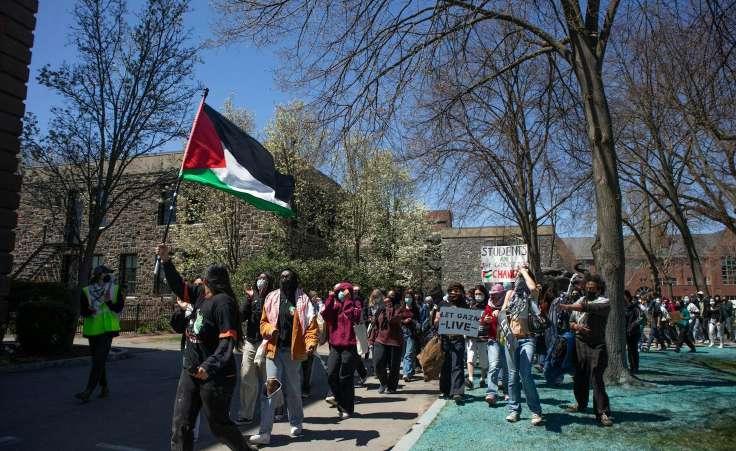
The Class of 2024’s final year began with a flurry of union organizing on campus. amid contract negotiations with Tufts, the newly unionized undergraduate resident assistants went on strike on first-year move-in day to demand that Tufts pay them a stipend. Weeks later, Tufts agreed to compensate the Ras with 80 meal swipes and a $1,425 stipend each semester.
On Sept. 25, the union voted by an overwhelming majority to sign its inaugural contract with the university. The contract represents the culmination of seven months of negotiations and will be valid for three years.
Tufts dining workers, represented by the labor union UNITE HERE Local 26,
NEWS 9 SUNday, May 19, 2024 THE TUFTS DAILY
AARON GRUEN / THE TUFTS DAILY Mass. Gov. Charlie
President Anthony
MATTHEW SAGE / THE TUFTS DAILY
see RECAP, page 12
Over 300 Tufts students, faculty and local residents march in solidarity with Gaza on April 26.
The Daily Class of 2024, in their own words
Editor’s note: The Daily’s editorial department acknowledges that this article is premised on several conflicts of interest. This article is a special feature for Commencement 2024 that does not represent the Daily’s standard journalistic practices.
as Tufts’ newspaper of record, the daily sees many students contribute to its black-and-white newsprint pages, but not all work their way up to its masthead. The daily staff spoke with eight members of the Class of 2024 who have all served on the newspaper’s managing or executive board and left their mark on the organization’s history.
Aaron Klein associate Editor, Spring 2023 Executive audio Producer, Spring and Fall 2022 by Michael Onysko, Assistant News Editor
aaron Klein’s journalism experience started many years ago, working for both his middle school and high school newspapers. He served as editor in chief of the latter.
Coming to Tufts during the COVId-19 pandemic, Klein decided he wanted a break from the world of journalism and initially strayed away from the daily’s doors. But come his sophomore year, Klein’s friend and fellow senior Peri Barest persuaded him into joining the daily. Barest, a former associate editor, knew Klein had multimedia experience and could help her run “The Rewind” — the daily’s news podcast.
Klein said that he worked on just a few stories and only minorly helped with editing. But, “lo and behold,” one of his projects caught the eye of the then-executive audio producer Hannah Harris (La’22), who showed it to the Managing Board. The daily’s managing editors asked him to become the next audio executive, and the rest is history.
“It was a rapid exposure to the daily,” Klein said.
Klein reflected on his time serving as executive audio producer two semesters in a row before eventually moving onto the Managing Board, serving as an associate editor in spring 2023.
“There’s part of me that will always be a creative-minded person and loves getting my hands dirty and loves putting in the hours to develop and edit podcasts,” Klein said. “There’s also a part of me that liked being in a more managerial, oversight role when it comes to the M-Board. … I might give the slight edge to audio [executive], just because it was a unique and fun role, and I had a lot of room to play with it. But I loved my time on the M-Board too.”
Klein added that one of his favorite memories was when the daily’s Executive Board embarked on a trip to the Tufts Mountain Club’s Loj, located in New Hampshire.
“That was just such a great time,” he said. “We went on hikes through the rain and just made s’mores, sat around a bonfire [and] shared stories and laughter. [It] brought me closer to a lot of people. … I think that trip honestly is where a lot of
my serious friendships in the daily were really solidified.”
Klein said that he loved writing satirical content and overseeing the april Fools’ paper design, which was a mock tabloid in spring 2023. Because Tufts’ admitted students day fell on the same week, Klein said, he enjoyed seeing parents pick up the satire edition and either put it down or “laugh their heads off.”
“That was just hilarious to me,” he said.
as audio executive, Klein started an initiative called “The daily Read,” having reporters read aloud their articles to be embedded on the daily’s website as an audio recording. He called the initiative one of his most meaningful contributions.
He also expressed his appreciation for the daily’s community and for allowing him to grow as a person.
Klein also noted that he believes he holds the daily’s record for having his jokes quoted the most times in a single night in the organization’s Slack channel: around 30 times.
“[That] should tell you something about me,” Klein said. “Perhaps good, perhaps bad, but I always like to try to bring laughter. I’m the self-dubbed newsroom clown, and I’m thankful for the people in the daily who are more serious and keep me grounded — and for the people in the daily who laugh at all my stupid jokes.”
Caroline Vandis associate Editor, Fall 2023
Executive Social Media Manager, Fall 2022 alumni Liaison, Spring 2024 by Ishaan Rajiv Rajabali, Deputy Arts Editor
Caroline Vandis began her time at the daily during her first semester at Tufts, but because of COVId19 restrictions, found little in the way of what she was looking for in the daily’s office: community. Now famous for coining the term “dailmunity,” she pinpointed the spring of her sophomore year as a specific turning point in her daily journey.
“Coming into the office was so, so fun when you actually meet people there,” she said. “I looked forward to it so much, and I really wanted to be more involved. [But] I did not want to become an executive copy editor because it was too much of a time commitment.”
She shied away from the position due to time constraints, but in a twist of fate, ended up spending just as much, if not more, time in the daily office regardless — but as the executive social media manager.
“I loved every minute of that,” she said. “The managing board at the time — Chloe, Ty, Julia, delaney, abi and Charlene — they were the best.”
Vandis considers her “Friday advice” Instagram series from the same semester to be her most meaningful contribution to the daily.
“People would come up to me and say, ‘I love your advice column,’ and I would say ‘Oh my God, that’s crazy!’” she said.
She also holds the distinct mantle of having written an article in all the daily’s major written sections: news, arts, features, opinion and sports.
“I was talking to daniel Vos, former executive news editor, and Matthew Sage, current executive news editor, and they were both like ‘How are you on M-Board if you’ve never written an article?’ and I was like, ‘So true.’” Vandis laughed, then made it her goal to fix that.
“I feel like I really got to know the daily better and build my understanding of what the organization is,” she said.
Winning MVP of the daily’s 86th Managing Board remains one of her highlights till date.
“It gave me validation that what I was doing was meaningful,” she says.
Moving onto the Managing Board herself, however, Vandis said she sought to expand the daily’s reach.
“I think the daily has sort of a reputation on campus of not really reflecting the student body properly,” Vandis said. “I knew our relationships were kind of fractured with a lot of the student organizations on campus. So last fall, when I was on the Managing Board, I was trying to work with these organizations to rebuild those relationships so we could really make our coverage well-rounded.”
She continued that while it was difficult to separate personal relationships from professional ones at the time, she is ultimately glad that it broadened the scope of the daily’s reporting.
Vandis has held many titles at the daily — copy editor, executive social media manager, ‘M-boarder’ and more. But most daily members recognize instead for her warmth, humor and positivity that she consistently brought into the office.
“The daily, to me, means community,” Vandis said. “It’s such a special environment where there [are] so many different people … and getting to work with all those different personalities … is so special. I feel I’ve found my place at Tufts through the daily.”
Charlene Tsai
Production director, Fall 2022
Executive Layout Editor, Spring 2022
assistant Production director, Spring 2024
Social Committee
Co-Chair, Spring 2023 by Shannon Murphy, Local News Editor
It was fall of 2020, and firstyear Charlene Tsai was taking all her classes from home. Looking for something to do remotely, she started attending the daily’s layout section training sessions on Zoom.
“I think I just really liked the idea of having a physical product, and they said you don’t need any experience to join. So that’s what drew me to [the Layout section].” Tsai said.
Four years later, Tsai’s daily career has included being executive layout editor in spring 2022, production director in fall 2022 and Social Committee co-chair in spring 2023.
Pursuing degrees in both psychology through the School of arts
and Sciences and studio art on the School of the Museum of Fine arts campus, Tsai has a creative spirit and a passion for seeing her work come to life.
One of Tsai’s favorite contributions during her time at the daily was overseeing the production of the weekly print paper containing an investigative piece in fall 2022.
“I just remember Chloe [Courtney Bohl] telling me that Ethan [Steinberg] and aaron Gruen wanted a very specific attention-grabbing front page,” Tsai said. “So, I just got really excited hearing that because usually we just have the same kind of format for the front page, [and] it was nice to hear that they already had a vision.”
To Tsai, this project was special because it involved close collaboration across multiple sections.
“It was really nice because … we were able to work across multiple sections, like layout, photo and editorial.” Tsai said.
One of her favorite memories outside of the office was a trip to the Tufts Mountain Club Loj with the Managing and Executive Boards in fall 2022. after several semesters of social distancing measures in place, Tsai emphasized the success of this trip in creating a more bonded community within the daily.
“It was nice to be able to hang out with people outside the office, and I think that was our first time,” Tsai explained. “Because for the execs, we all just get together once a week on a Sunday evening in a random room in [the Joyce Cummings Center] and … [sit] around a table and talk. So, it [was] nice to just not [do that]. … Everyone was just able to hang out, have fun and not have to talk about anything dailyrelated.”
However, working in production roles at the daily has not been without its challenges. Tsai referred to the newspaper as “the biggest on-campus group project.”
“When you’re working with so many people, everyone has very different working styles and people also care about different things,” Tsai said. “you might care about this one little detail about the print paper and then no one else cares about it. So, [you learn] how to advocate [for] what you care about and make space for other people to share.”
Tsai has never written an article for any of the editorial sections of the daily and does not plan to pursue a career in journalism, but she believes her time with the newspaper has still given her valuable insight for the future.
“I’m going into education, so I don’t see how [the daily] necessarily relates to it,” Tsai said. “But I will say that a lot of the skills you learn from the daily are very transferrable.”
Chloe Courtney Bohl Editor in Chief, Fall 2022 Executive News Editor, Spring 2022 Executive Investigative Editor, Fall 2023 by Estelle Anderson, Executive Investigative Editor Chloe Courtney Bohl is known as a legend among the staff of The Tufts daily.
In the words of Ty Blitstein, fellow senior and former associate editor, ”[Courtney Bohl] is one of the best leaders I have ever worked with. She is so dedicated, intentional, capable. [She’s] the rare person that can come up with great ideas and then also put them into practice.”
Before her tenure at the daily, however, Courtney Bohl knew little about journalism, let alone whether it was the path she wanted to pursue. What she did know was that she had a passion for writing, which led her to join the daily on a whim during her first year.
“I signed up for the daily News section because I … wanted to see what it was all about,” Courtney Bohl reflected. “I didn’t know at the time that it was going to become one of the biggest parts of my college experience.”
It didn’t take long for Courtney Bohl to rise in the ranks of the News section. as an assistant news editor, she covered the Tufts Community Union Senate beat, attending and reporting on weekly Senate meetings. The next semester, she served as a deputy news editor and co-produced “The Rewind,” a podcast dedicated to discussing Tufts news. during her sophomore year spring, Courtney Bohl was promoted to executive news editor, before assuming the role of editor in chief the following fall.
“Being news [executive] was hard. It was intense. It was a lot of work. Being EIC was the same thing: just feeling the responsibility and wanting to be supporting all the people that you’re working with, who are working for free to do something really important. It can be emotionally intense and labor intensive,” Courtney Bohl reflected. “[But] if I had to go back and do it again, I would do it again 100 times over.”
Throughout her time on the daily, one of Courtney Bohl’s main goals has been increasing coverage of Tufts’ host communities.
“This was something that was important for me to focus on beginning when I was editing the News section,” she said. “Each of [Medford and Somerville’s] legacy weekly print papers had been bought by … a hedge fund and merged into one digital paper, so basically … the local news ecosystem in our host communities was really suffering. Papers were disappearing, following trends in local journalism all around the country.”
as executive news editor, Courtney Bohl prioritized assigning and encouraging more local news pitches. Later, as editor in chief, she published a Host Communities special edition, featuring local content across all sections.
“The types of local journalism that the daily can do extend beyond news and can be really meaningful and impactful for people in our host communities. [The daily’s articles] can also raise awareness among the Tufts community of the wonderful, amazing [and] complicated things happening in their backyard,” Courtney Bohl said. “Bursting that campus bubble a bit … was some-
NEWS 10 SUNday, May 19, 2024 THE TUFTS DAILY
thing that was really important for me to focus on.”
after spending a semester abroad in Paris, Courtney Bohl returned to the daily as the executive investigative editor. That same semester, she co-taught the daily’s Experimental College course, where she coordinated reporting field trips for the class and brought in guest speakers, including former NBC President Neal Shapiro (La’80).
“She’s an ‘I-knew-her-when’ sort of person,” Ty Blitstein, Courtney Bohl’s co-teacher and former associate editor, said. “We’re all going to be able to say someday, ‘I knew her when she was editor in chief of her college newspaper.’ She’s off to do great journalism things. We’ll be reading her byline for a long time.”
after graduation, Courtney Bohl will join the 2024 cohort of Report for america, a service-oriented fellowship that places emerging journalists in local newsrooms across the country. Courtney Bohl is headed to North Carolina, where she will report on local politics and government for INdy Week, a durhambased newspaper.
“I would never have gotten this job or even realized that journalism was my passion without the daily,” Courtney Bohl said. “you can draw a straight line from me joining in fall 2020 to where I am now, which I feel super lucky for. It’s changed everything for me, in that way.”
Elizabeth Foster associate Editor, Spring 2022 alumni Liaison, Spring 2023
Education Committee Chair, Fall 2023
Executive Layout
Editor, Spring 2021 by Teagan Mustone, Staff Writer
Elizabeth Foster joined the daily in fall 2020 amid the COVId19 pandemic with two clear goals: “learn adobe Indesign and see people in person.”
despite the six feet between her and her colleagues, Foster immediately found a supportive community within Tufts’ student newspaper.
One of her fondest memories is the late-night push to finish the Commencement Edition during her sophomore year spring as an associate editor.
“We finally finished it and we celebrated by popping bottles of champagne,” Foster said. “again, this is still spring 2022 so everyone’s still masked — you can be a little closer than six feet — but the pictures of that era remind me of so much.”
during her junior fall abroad, Foster kept close ties to the daily through her column, “Liz in London.”
“It encouraged a lot of reflection and … required me to journal in order to have things to share,” Foster said. “I’m really grateful for that opportunity to be able to have some recording of my time abroad.”
Thanks to the online daily archive, Foster can see how she has grown so much even just a year and a half later.
“I think I wrote at some point about … realizing you’re not afraid to go out to dinner alone,” Foster said. “That’s still an experience I really enjoy — being able to read a book and go to a restaurant and have that to myself and not neces-

sarily bring technology and not be limited by other people’s schedules.”
as a senior, Foster is the author of the column “Confessions of a Cooking Fanatic” where she shares recipes and her love for food.
Graduating is bittersweet for Foster, but she looks forward to the new challenges. at commencement, Foster will graduate with a master’s of science in computer science. She currently holds a bachelor’s degree as a part of a makeshift 3+1 program.
Foster plans to move to Minneapolis to begin her career as a software engineer, but she sees journalism in her future.
as an avid Strands and Wordle player, Foster’s dream job is as a software developer for New york Times games. She also thinks about the possibility of being a technology correspondent, employing both her computer science background and experience at the daily.
“It would be really fun to be a quantum computing correspondent, especially as it becomes a more viable technology,” Foster said. “So I do see journalism down the road or at least like to include it somewhere in the mix.”
Through all her roles and experiences — in the basement of Curtis and the pubs of London — the people Foster surrounded herself with at the daily were a cornerstone of her time at Tufts.
“I’m really happy with how things have evolved and the more female leadership that has blossomed within the daily,” Foster said. “That’s been really cool to witness and contribute to. So many of my closest friendships have been formed from very late nights and debrief sessions after heavy meetings.”
No matter where her future takes her, Foster will always be “rooting so hard for the people who are still around here.”
“I think when you have a culture of people willing to commit the time and buy-in, you can create a really valuable experience.”
Emily Thompson Executive News Editor, Spring 2022 by
Matthew Sage, Executive News Editor
as a first-year student, Emily Thompson kept readily up to date on the daily’s coverage and saw the publication as a lifeline during the waning restrictions of the COVId-19 pandemic — but not yet as a contributor.
“I was in my bedroom alone most of the time,” she said of her hybrid-style first-year experience. “I was reading daily articles to keep up with [COVId-19] numbers and what was happening on campus because I had no idea, since I never stepped outside. … For me, it was a way to connect to the campus.”
But while Thompson said she never planned to explore student journalism, she had always had an interest in writing and already closely followed the news. When she saw the daily as one of the only student organizations still functioning during the pandemic, she saw her opportunity.
“It was something I could latch on to,” she said. She quickly joined the News section her first spring semester.
“I really found a joy in the interview and reporting process,” she said. “I was always hesitant toward writing, but being able to talk to people on campus — even on Zoom — was really a connecting power for me.”
That’s why she decided to stay with the daily, she said, and become a beat reporter the next semester. Soon, she found herself a deputy news editor under the section’s executive editor, Chloe Courtney Bohl, and host of the daily’s news podcast — something she recalled fondly, despite it admittedly falling outside her comfort zone.
But on one rainy afternoon, Thompson was sent on assignment to cover a tenant union protesting a landlord in nearby davis Square. at the time, she
had no idea she would eventually become the subject of her own story. The tenants’ landlord later sued Thompson and then-editor in chief alexander Janoff for her coverage, claiming “emotional distress damages.”
While legal experts assured the pair that they were legally protected, Thompson said the ordeal “took a toll,” and forced her to reconsider her relationships with others at the newspaper. The case would later be dismissed with prejudice, but Thompson said she found the entire situation “uncomfortable” and “ethically challenging.”
“Immediately, it got coverage from all these news outlets, which was the overwhelming part of it,” Thompson said, “because all of a sudden, it wasn’t the [tenant] union who was in the spotlight, like they were in my article — it was me.”
despite the challenge, Thompson became the News section’s executive editor for her next and final semester at the daily. after the lawsuit and a stressful semester as an executive editor, Thompson chose to take a step back from her commitment to the newspaper. While she always intended to return as a staff writer, she never did, finding other commitments on campus that she said were, “in this period of my life, more meaningful to me.”
Even though she doesn’t plan to pursue journalism professionally, Thompson’s fondness for the daily always lay in her reporting — something she isn’t quite ready to give up on, she said.
“you’re going to meet amazing people who have interesting stories to share, and it is truly an honor to be able to hold those stories and to translate them into print,” she said. “Even at its hardest moments, it is so rewarding to put out stories every day. … I really love talking to people, and a part of me wants to figure out how to incorporate that in my life later.”
Julia Shannon-Grillo Editor in Chief, Spring 2023
Managing Editor, Fall 2022
Executive Copy Editor, Spring 2022
Executive Editorial Editor, Fall 2023 by Rebecca Barrie, Assistant News Editor
Julia Shannon-Grillo came to Tufts as a varsity athlete and aspiring engineer. Little did she know, the daily would come to define her college experience and shape her future.
“I was involved in my high school newspaper, and when I got to Tufts, I knew I wanted to stay in touch with the world of journalism,” Shannon-Grillo said. “But I was really nervous about spreading myself too thin. ... I decided to join the Copy section because I had been told that it was a more social section, a good way to meet people and I really did enjoy the editing side. So that was my initial entry into the daily.”
at the end of her first-year fall, Shannon-Grillo realized that hybrid learning — Tufts’ then response to the COVId-19 pandemic — was not working for her, so she took the following spring semester off of school. When she returned, she decided to make some changes to her involvement in the daily.
“I wanted the daily to mean something to me,” ShannonGrillo said. “It was something I had been doing for a year, but I felt like I hadn’t really made any friends through it. I wasn’t part of the journalism conversations that I was used to in high school.”
“I was trying to think of ways that I could make it mean more to me, so I applied to be the executive copy editor and ended up doing that my sophomore spring,” she said. By the end of her sophomore year, she had made friends in
NEWS 11 SUNday, May 19, 2024 THE TUFTS DAILY
VERONIKA COYLE / THE TUFTS DAILY
see SENIOR PROFILES, page 12
Members of the Daily’s senior class are pictured.
Eight senior members of the Daily reflect on accomplishments, memories, future plans
SENIOR PROFILES
continued from page 11
the daily, notably her co-executive copy editor, abi Vixama, and finally felt integrated into the community. In fact, she credits the student newspaper as the reason she decided not to transfer schools.
“you’re spending so much time in the office [as a copy exec]. It’s really easy to meet people. … I realized throughout that sophomore spring how much I had missed being in that environment and how much I love people who work in journalism,” Shannon-Grillo said.
during her junior fall, ShannonGrillo became a managing editor, requiring her to be in the office anywhere from 30–50 hours a week. despite this, she continued to sail for Tufts’ varsity team.
“I started out that year trying to do both, and about a month in, I felt like I wasn’t doing either job well,” Shannon-Grillo said. “I felt really bad on both sides, just guilty that I wasn’t living up to the expectations on either end.”
after being hospitalized following a sailing incident, ShannonGrillo realized something had to go. She took a break from the sailing team, and in her junior spring, became the daily’s editor in chief. during her time as editor in chief, Shannon-Grillo tackled a series of bomb threats made
against the university during finals week with the help of her friend and former editor in chief Chloe Courtney Bohl. She also published a controversial Letter from the Editor on “the right to protest” and the role of student journalism.
By the time her senior year arrived, Shannon-Grillo decided to rejoin the sailing team. She also became chair of the Editorial Board and helped usher in the next editor in chief and Managing Board.
Now, Shannon-Grillo is looking ahead to a future in journalism. She will pursue a master’s degree in investigative journalism at Columbia University in the fall.
“I’m just so grateful,” ShannonGrillo said, “I will look back at my time at Tufts, and there will always be a warm, fuzzy feeling in my soul when I think about the daily. … I’m so grateful that I found such a close community of people on campus, and I hope that everyone gets a chance to be a part of that.”
Ty Blitstein
associate Editor, Fall 2022 Executive Video Editor, Fall 2021, Spring 2022 alumni Liaison, Fall 2023, Spring 2024 by Josue Perez, Staff Writer
Ty Blitstein, a current alumni liaison and former associate edi-
tor, found his start at the daily in the fall of 2020 while fully remote and at home because of the COVId-19 pandemic.
“I spent my entire freshman year as a remote student, which was a really strange start to college,” Blitstein said. “But the daily was one of the main ways I tried to get involved and stay connected.”
Blitstein spent his first year as a copy editor and eventually an audio reporter for the daily’s weekly news podcast, “The Rewind.”
But going into his sophomore year, the outgoing executive video editor reached out to Blitstein to apply for the position. “I was asked if … I would be interested in applying for executive video editor a few hours before the application was due because no one else was interested,” Blitstein said. “The outgoing executive knew that I had multimedia experience working with audio and I had made videos on my own in high school.”
Blitstein was then the executive video editor for the entire 2021–22 academic year, wherein he worked to revive the then dormant section of the daily. Blitstein said that he especially enjoyed kickstarting a beloved tradition of the daily, which still continues to this day: The Newsroom Concert Series, which features student
bands performing in the daily’s newsroom.
“The Tiny desk concerts have been one of my favorite projects that I’ve worked on. I always say content and community, all in one,” he said. “We’ve done several at this point and to start that up has been amazing, to be able to give people in the Video and audio sections a chance to work with some really cool artists and put together these videos, but also to bring people into the office. It makes me so happy when the office is full.”
after serving as executive video editor, Blitstein assumed the role of associate editor for the fall 2022 semester, alongside then-editor in chief Chloe Courtney Bohl, on the 86th Managing Board.
“Truly no project or task was too big or too small for [Blitstein] to get involved in, whether that [was] publishing the daily’s inaugural diversity & Inclusion Report or poring over every last comma, ellipsis and punctuation mark in every single PdF at 3 a.m. on production nights,” Courtney Bohl said. “He has really made the daily a better place in so many ways from his presence on the paper.”
Blitstein was also a member of the diversity & Inclusion Report Committee during his time as an associate editor, and
A look back at newsworthy moments of 2020–24
RECAP
continued from page 9
also won a major collective bargaining victory at the start of the school year. In September, they signed a new contract with Tufts guaranteeing them a $9.92 increase to hourly wages to be rolled out over the next 4 ½ years.
Unionized SMFa part-time lecturers reopened contract negotiations with Tufts in the fall, calling for pay parity with part-time lecturers in the School of arts and Sciences. SMFa dean Scheri Fultineer announced in October that those negotiations had concluded, without disclosing the terms.
Graduate students in the School of arts and Sciences also raised their voices to demand higher pay and better benefits. Represented by Service Employees International Union Local 509, the grad students entered negotiations over — and subsequently signed — their next five-year contract. They staged a walkout at University President Sunil Kumar’s Oct. 6 inauguration ceremony to draw attention to their cause.
The Tufts community reacted with shock and grief to Hamas’ deadly attack on Israeli civilians on Oct. 7. as Israel began a brutal campaign of bombing and ground invasions of Gaza, students staged a series of protests, walkouts, sit-ins and die-ins to call attention to the mass killings of Palestinians.
at one protest outside Ballou Hall on Nov. 17, students alleged that TUPd officers physically and verbally harassed them and made them feel unsafe. The protest ended
with 18 students facing disciplinary violations and one losing their study abroad privileges for blocking the doors to Ballou in violation of university policy.
Eleven student groups founded the Coalition for Palestinian Liberation at Tufts to call for an immediate ceasefire, now totaling over 40 member organizations. The coalition also demanded that Kumar condemn the genocide in Gaza and that Tufts divest from Israel and end all partnerships with Israeli institutions.
In a series of messages to the university community, Kumar denounced the Hamas-led terrorist attacks, mourned the loss of Palestinian lives in Gaza and condemned all forms of antisemitism and Islamophobia. He affirmed students’ right to protest but cautioned that “disruption cannot take the place of dialogue.”
The Pulitzer Prize-winning journalist Jodi Kantor, Massachusetts attorney General andrea Campbell and Congressman Maxwell Frost were among the civic life leaders invited to campus for Tisch College’s fall Solomont Speaker Series.
Tisch College also welcomed hip-hop artist and activist david augustine, known as dee-1, as its inaugural artist/Scholar-inResidence. In spring 2024, augustine taught a course about the intersection of hip hop and social change.
dean of the School of arts and Sciences James M. Glaser announced in december he will depart Tufts this summer after 33 years. Glaser joined the department of Political Science in 1991 and has
served as dean since 2014. Bárbara Brizuela, dean of the a&S graduate school, will be the interim dean while the university searches for Glaser’s replacement.
Pro-Palestinian activism continued into the spring semester as the Israel-Hamas war passed the 100day mark and the death toll mounted. Calls for a ceasefire extended into Tufts’ host communities, with the Somerville and Medford city councils both passing ceasefire resolutions in February.
In March, the TCU Senate passed three resolutions proposed by CPLT calling on Kumar to recognize the genocide in Gaza, for the university to divest from Israeli companies and for it to stop selling Sabra products. a fourth resolution pressing the university to end approval for study abroad programs at universities in Israel did not pass. about 300 students came to the meeting to speak in favor of and against the resolutions. afterward, students reported antisemitic, Islamophobic and anti-arab remarks and actions made by their peers during the meeting.
Less than 12 hours after the vote, Kumar condemned the resolutions and said that Tufts will maintain all of its business and academic relationships with Israeli institutions.
Later in the month, a group of Tufts students participated in the first-ever Jumbo Spring Break — a five-day program with a civic engagement and community service focus. The students volunteered for Habitat for Humanity in Malden and met with Medford Mayor Breanna Lungo-Koehn, among other activities.
was involved in the publishing of the first diversity & Inclusion Report in december 2022.
“The d iversity Report fell into my lap [while] in progress in fall 2022,” Blitstein said. “I really wanted to get it over the finish line and get this out into the world because [the committee] had done such a good job surveying everyone and collecting the data.”
Thanks to the inaugural survey, Blitstein said, the d aily was able to expand its fundraising and bolster its financial aid stipend program, ultimately allowing a more diverse range of the Tufts community to participate in student journalism than ever before.
“To be involved in that process, from publishing the d iversity Report to helping to organize and conceptualize the expanding access fundraiser, … I’m really proud to have been part of those teams,” Blitstein said.
Ending with four full years on the daily’s masthead, Blitstein said that filling out his initial application for the Executive Board was one of the “best decisions” he made at Tufts.
“I found my community at The Tufts d aily,” Blitstein said, “and I hope that I’ve helped other people find theirs.”
Tufts accepted 10% of applicants to the Class of 2028, a slight increase from last year. It was the fourth year of Tufts’ six-year test-optional pilot program, and 60% of accepted students submitted test scores with their applications.
The daily reported that the sticker price for the incoming class will surpass $92,000, a record-breaking figure that includes tuition, housing and personal expenses like textbooks. Tufts will continue to meet 100% of students’ demonstrated financial need, and the university has earmarked more than $125 million for undergraduate financial aid in the 2025 fiscal year, representing a 4.7% increase from this past fiscal year.
On april 8 — one of the first truly sunny and warm days of the spring semester — hundreds of students gathered on President’s Lawn to admire the partial solar eclipse through protective glasses and makeshift pinhole cameras. Many others traveled north to experience totality.
Jordin Sparks headlined the Class of 2024’s final Spring Fling on april 20 with openers Tkay Maidza, Iyaz and student band Sunnydaze.
The 2024–25 TCU presidential election was a tight three-way contest between juniors Krystal Mutebi, Joel Omolade and Mikayla Paquette. Omolade was temporarily disqualified from the race by the Elections Commission for alleged campaign misconduct, but the TCU Judiciary quickly reversed the decision and allowed him to resume his campaign. Omolade ultimately won the presidency with 54% of the vote.
Fellow Class of 2025 senator Nessren Ourdyl will serve as vice president. Tufts students set up a “Gaza Solidarity Encampment” on the academic Quad in april, part of a nationwide surge in pro-Palestinian student activism. Universities around the country drew scrutiny for forcefully cracking down on their protesters and, in many cases, calling in the police to make arrests. Meanwhile at Tufts, under a no trespass warning and threats of suspension, the protesters deconstructed their encampment and left voluntarily on May 3. They did not offer a public explanation for why the encampment came down, but said they had not negotiated an agreement with the university.
Professors of the practice of the SMFa, capping off a year of union activity, began negotiations for a new collective contract with the university on april 24. If negotiations are successful, SMFa’s professors of the practice will join Tufts’ dining workers and resident assistants in securing higher working standards during the 2023–24 academic year.
Senior Saffiyah Coker won the Wendell Phillips award and will deliver an address to the senior class at Saturday’s Baccalaureate Ceremony.
Fiona Hill will deliver the Commencement address on Sunday. Hill is the chancellor of durham University and a former adviser to three U.S. presidents, specializing in Russian and European affairs.
Rebecca Barker, Robert Kaplan and Ethan Steinberg contributed to this article.
NEWS 12 SUNday, May 19, 2024 THE TUFTS DAILY
Incoming TCU President Joel Omolade champions inclusivity
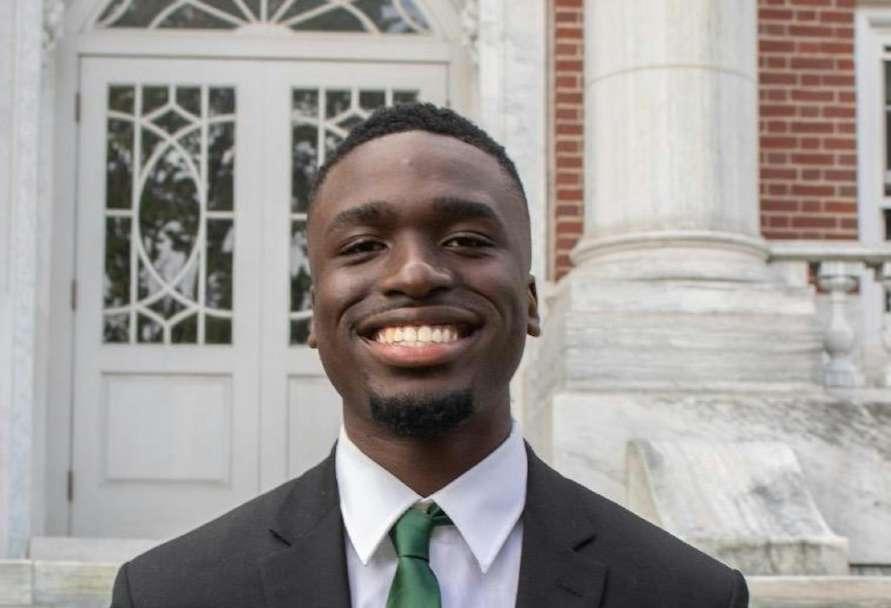 Almer Yu Staff Writer
Almer Yu Staff Writer
“If you’re not on the table, you’re on the menu,” Joel Omolade says. “a nd I really want to make sure that more students are able to be a part of that table, to be a part of the conversations that are happening.”
Omolade will serve as president of the Tufts Community Union Senate for the 2024–25 academic year. In an interview with the d aily, he looked ahead to his term as president, pledging to embody the ethos of his “Better Starts Now!” campaign and prove his commitment to bringing meaningful change to the community.
Omolade, a junior, is pursuing a double major in community health and political science. He became interested in both fields during the COVI d -19 pandemic when he witnessed medical mistrust and political disillusionment prevalent in the Bronx, where he grew up.
“I thought that working in public health and working in politics would be a great intersection to help my community,” Omolade said.
Omolade is passionate about fostering dialogue between diverse student communities, and as president, he wants to involve more students from outside the Senate in important campus discussions. He pointed to the Senate’s “What you Missed” series on Instagram, an effort he led to make the body more transparent to the broader Tufts community.
Omolade is the Senate’s outgoing diversity officer, meaning he chaired a committee of senators who represent students from underrepresented or marginalized identities at Tufts. The role has made him conscious of disparities in privilege and representation on campus.
“a s diversity officer, that’s one thing I’ve been pushing a lot for all the senators,” Omolade reflected. ”[I was able to] think about who doesn’t have the same abilities that [others] do. [I thought] about who doesn’t have the same access and the same support systems that [others] have. a nd I think those people who don’t have [as many] opportunities should be the people that [we] are making these projects for.”
Omolade stressed that he doesn’t just want the senators to broaden their inclusivity efforts, although that’s a great start. He is committed to directly involving more students in the decision-making processes.
This year, Omolade helped create the SWa N a community senator seat to represent Tufts’ Southwest a sian and North a frican students. He also spearheaded the formation of the Senate’s Intercultural Council, a forum that brought the senators together with leaders of Tufts’ cultural clubs to talk about how student government can better meet their needs.
“We’ve been putting a lot of pressure on senators to do a lot of this work [with Tufts’ cultural clubs because] there [are] a lot of students on our campus who really want to be engaged and want to make [changes], but [who] don’t necessarily have the best venue to do that,” Omolade said.
To that end, he plans to create more subcommittees accessible to the entire Tufts student population, as well as new liaison roles to bridge gaps between different campus groups.
Omolade believes the Senate has “a bit of a PR issue,” he said. “[Tufts students] don’t necessarily trust the system and only see it from afar. I think the best way to navigate that is to create more opportunities for students to sit on these committees, to
Search underway for new dean of the School of Arts and Sciences
Tufts has begun the search for a new dean of the School of a rts and Sciences to succeed dean James M. Glaser. Glaser, who has been the dean of the School of a rts and Sciences since 2014 and a Tufts faculty member since 1991, will assume the position of executive vice president and provost at Santa Clara University in July.
will invite the second-round candidates back to campus to be interviewed by faculty, senior leadership, student leaders and other stakeholders, who will report their feedback back to Genco.
“I will then confer with President Kumar and we will select a final candidate, who will require the approval of the Board of Trustees,” Genco wrote.
be a part of these rooms and to really be a part of this dialogue.”
In addition to expanding on his current work on diversity, equity and inclusion, Omolade also campaigned on the promise of many other big changes for the upcoming year. His vision includes updating gym equipment and Safe Ride options; revamping the Student Information System website to be mobile app-friendly; establishing grants to fund independent and student-led engineering initiatives; making laundry free for all students; collaborating with the Office of Equal Opportunity and pre-orientation groups to provide antisemitism and anti-Islamophobia training for incoming first-years; and developing a Survivors’ Bill of Rights that outlines the rights and resources available to survivors of sexual assault, among other initiatives.
Reflecting on his campaign, Omolade attributed his success to his team: “If I don’t have a good team, then there’s no point in me even running in the first place. and I’m so proud that I have the best team in the world.”
Outside of student government, Omolade is the president of Tufts’ undergraduate resident assistants’ union and a member of Tufts’ nationally ranked mock trial team, the Pre-Law Society and the competitive african dance team C.O.C.O.a and in his (limited) free time, he’s teaching himself to play the saxophone.
“I’ve been able to find home and joy in each of those different activities. I’m blessed with so many different families on this campus,” Omolade said.
Omolade is eager to step into his new role and has already begun preparing to take over from outgoing TCU President arielle Galinsky.
“ you don’t have to wait for that future to happen,” Omolade said, echoing his campaign slogan. “It can start now.”
Shortly after Glaser announced his departure in december 2023, the Office of the Provost began arrangements for the hiring of a new dean. While the office is currently searching for an individual to permanently fill the position, it recently appointed Bárbara Brizuela, current dean of the Graduate School of arts & Sciences, as the interim dean. Brizuela will assume the position on July 1.
Caroline Genco, provost and senior vice president, explained the process of hiring a permanent dean, which is estimated to take around five months.
“We have engaged Isaacson, Miller, a leading executive recruitment firm specializing in higher education, to facilitate the search and recruit a diverse pool of candidates,” Genco wrote in an email to the daily.
a search committee primarily composed of a&S faculty has been working with Isaacson, Miller to create the job position and conduct the recruitment process. The committee is responsible for vetting candidates, conducting first-round interviews and recommending candidates for further consideration.
Kyongbum Lee, dean of the School of Engineering, serves as the chair of this committee.
“I think dean Glaser and I probably have the closest relationship of all the deans because the two of us are largely responsible for the undergraduate experience at Tufts,” Lee said. “So he and I need to work together all the time. … Of all the deans at the university, I probably had the closest insight into what the dean of arts and Sciences does on a day-to-day basis.”
a fter the first stage of recruitment, the committee
The committee aims to find a strong leader who, as Genco wrote, will “follow in Glaser’s footsteps.” The dean of the School of a rts of Sciences is in charge of supporting the operations of the entire school through overseeing faculty governance, curriculum development and facilities design, among other responsibilities.
“I lead the school — all 26 departments and roughly 10 programs — [and] report up to a structure that we have in place here. So the management of the departments, curriculum [and] faculty is our responsibility to oversee,” Glaser said.
Glaser explained the challenges that a future dean may face in the role.
“It’s a high-pressure job. There are a lot of things that come your way that are unpleasant or difficult or emotional, and you have to have the temperment to deal with them without letting them take you down,” he said.
Lee expressed that he would like to see a dean who is “collegial, collaborative and transparent.”
“[Glaser] was a very successful dean of a rts and Sciences,” Lee said. “I think that’s something that most people would agree with. So I’d say some of the qualities we’re looking for are the ones that d ean Glaser embodied. One is that he deeply cares about the student experience.”
The search for the permanent dean will continue over the summer.
“I think it’s important that people understand that this is a wonderful place. I get the privilege of being part of the leadership for a period of time, and then I will pass it onto others,” Glaser said.

NEWS 13 SUNday, May 19, 2024 THE TUFTS DAILY
UNIVERSITY UNIVERSITY
COURTESY ALONSO NICHOLS / TUFTS UNIVERSITY
Dean James Glaser, left, and incoming dean ad interim Bárbara Brizuela, right, are pictured.
Carly Cohen and Shannon Murphy University and Local News Editors
COURTESY JOEL OMOLADE
Joel Omolade, the next TCU president, is pictured.
UNIVERSITY
Affirmative action for the rich? Reexamining legacy admissions in a post-affirmative action
Grayton Goldsmith Staff Writer
It’s no secret that the college admissions process is in turmoil. Regardless of political conviction, higher education has become a prime target for those who are disgruntled with both the current state of american society and its projected future. What was once deemed the “great equalizer” is now viewed by many on both sides of the political spectrum as distinctively elitist, further entrenching socioeconomic divides rather than breaking down barriers.
In response to the Supreme Court’s move to upend race-based affirmative action last summer, left-leaning activists have shifted their focus to another oft-criticized facet of the admissions process: legacy preferences.
One political action committee, democrats for Education Reform, has been part of the charge to strike down legacy admissions. Mary Tamer sits at its helm as the state’s executive director.
In an interview with daily, Tamer discussed the group’s efforts to overturn the practice of legacy admissions, which gives preference to graduates’ children.
world
“We knew that the practice was built on bigotry and racism. We knew it was a practice that has been in existence for a hundred years,” Tamer said. “and frankly, as we look to creating more equitable systems in our education ecosystem, this is such a tangible way that we can help to address what is a very unlevel playing field when it comes to students trying to get into certain colleges.”
dubbed by many as “affirmative action for the rich,” there is no question as to the type of student that benefits from legacy preferences. Regardless of whether or not their legacy status is considered, legacy admits are already advantaged by virtue of one or both of their parents having attained a college degree. Studies have repeatedly confirmed that those with college-educated parents are significantly more likely to attend and graduate college themselves compared to first-generation students.
Luke Greenberg, a current firstyear student planning to co-major in education and economics, is conscious of his privileged status as a legacy admit. Still, he does not support the practice.
“I’m not personally a fan,” Greenberg said. “I think it [uses] someone’s legacy status, which is
something that they do not have control over. It’s something that significantly helps students who are already doing quite well, like upper-middle-class students. I think if you’re looking to increase the diversity of the student population, this is one of the first things on the chopping block.”
Still, the debate over legacy admissions is not all cut and dried Proponents of the practice have argued that it is in fact a net benefit to the diversity of a student body, especially at private universities, which are often more reliant on tuition dollars. Some individuals argue that legacy admits, who are more likely to pay full-fare for their education, can help foot the bill for their peers’ financial aid packages through later donations.
Tamer remains unconvinced. Citing an empirical analysis of the impact of legacy preferences on alumni giving, she argues that there is in fact no meaningful correlation between legacy preferences and institutional investment in financial aid.
“The perception is that [legacy preferences have stayed in place] because of the money,” she said. “But very often, the families whose children are the beneficiaries of legacy preference are not necessarily the
UNIVERSITY
families that are having buildings named after them.”
according to JT duck, Tufts’ dean of admissions, the university is still evaluating its use of legacy preferences in the wake of the Supreme Court’s 2023 ruling in Students for Fair admissions v. Harvard, which overturned racebased affirmative action.
“In light of the Supreme Court ruling, we have been examining admissions policies holistically and in the context of accessibility and we can only complete the work once the current admissions process is completed and the waitlist process ends, which is when we can evaluate our results,” duck wrote in an email to the daily. “How the university will treat applicants with family members who have affiliations with Tufts is part of that review, along with the analysis we are doing on the use of standardized testing. Because this work is ongoing, we are unable to comment in detail but we are confident that we will end up with policies that allow the university to live up to our values and commitment to diversity while following the law.”
Regardless of the university’s ultimate findings, it may not have a choice but to end
legacy preferences. a fter being reported favorably by the Massachusetts Joint Committee on Higher Education, Bill S.2687 has been referred to the Senate Committee on Ways and Means. The bill, sponsored by Sen. Lydia Edwards, proposes an end to legacy preferences for both public and private institutions. If passed, the law would take effect in the 2025–26 admissions cycle.
Edwards’ office did not respond to requests for comment.
affirming his support for Bill S.2687, Greenberg said “ you can’t advertise that you’re a meritocracy and then have a country club behind the scenes. That’s not how things should work.”
Still, the bill’s passage is far from guaranteed.
“The formal [legislative] session ends on July 31,” Tamer said. “We certainly hope that this bill is going to come to a vote prior to the session ending, so we’re doing our due diligence and trying to keep this issue front and center.”
“We are truly thrilled by the level of support that [Bill S.2687] has had on both the House side and the Senate side,” she continued. “We remain extremely hopeful for its chances.”
Historically Black sorority Zeta Phi Beta establishes Tufts chapter
Rose Hollander Staff Writer
This semester, Incorporated, the delta Chi chapter of Zeta Phi Beta Sorority — a historically Black sorority — opened at Tufts. The chapter currently has just five members and the Zetas will seek new sisters in the fall.
“The goal is to make Zeta a permanent structure — a permanent home on Tufts campus,” Saffiyah Coker, treasurer of the Tufts Zeta chapter, told the daily.
Zeta was founded at Howard University in 1920 by five female students. Now, it boasts over 100,000 members within hundreds of chapters across the world.
“One of the principles of Zeta that is really beautiful — and that I was drawn to personally — is scholarship,” Coker said. “and people here are very bright, in so many different ways. So we hope that Tufts students are continuously drawn to the type of scholastic excitement that Zeta is about.”
along with scholarship, Zeta was founded on the principles of service, sisterhood and finer womanhood. Its rich history and strong ideals attracted Coker to the sorority.
“Zora Neale Hurston [is] a Zeta and she’s one of my favorite writers ever,” she said. “Seeing that there are these giant [figureheads in Zeta], who’ve contributed so much to Black life and thought in america, I was like, ‘that is so cool to be able to call myself a member of the same organiza-

tion as that other person.’ So it’s just a really beautiful opportunity to make so many connections, not even just on this campus but in the broader world.”
Zeta Phi Beta is linked with the other members of the “d ivine Nine” — a group of nine historically Black sororities and fraternities. There are citywide chapters of other d ivine Nine sororities and fraternities, but Zeta is the only member with an active chapter at Tufts.
The Zeta chapter offers a new alternative to local sororities The Ivy and Thalia, which do not have a national affilia-
tion, and nationally recognized Chi Omega and Kappa alpha Theta. The exclusionary history associated with the current national chapters of Greek life on campus may be unsettling to possible recruits.
“The only people I know in [Tufts] sororities and fraternities are not white, but when I think of them as a whole, when I think rushing [and] when I think sororities and fraternities, I think [about the stereotypes] I see in movies, [like] a bunch of blonde girls and frat boys, and I don’t see people of color,” Jahnea Potts, president of the Tufts chapter of Zeta, said.
Zeta wants to market itself as a space for Tufts students who are deeply involved in multiple different disciplines.
“I would say we’re drawn to passionate people, people who care deeply about the things that we do,” Coker said.
“We’re all chronically busy, not out of a desire to get the best GPa or do the most things, but because we care about so many different things.”
The establishment of a Zeta chapter at Tufts has been in the works for several years now. Mary Kate Kelley, fraternity and sorority life adviser, commented on the process.
“Our office started talking with the extension team of Zeta Phi Beta Sorority, Inc. a couple of years ago,” Kelley wrote in an email to the d aily. “Last summer, I worked with volunteers from Zeta Phi Beta Sorority, Inc. to create a plan for them to establish a chapter at Tufts.”
When evaluating a potential sorority or fraternity chapter, the university considers how a new chapter would impact campus life.
“We looked at the types of organizations we have on our campus and we wanted to allow for more opportunities for our multicultural organizations to be more involved in our fraternity and sorority life community,” Kelley wrote.
The chapter looks forward to growing in the upcoming semesters and establishing its place within the Greek life scene at Tufts.
“One of the beautiful things about starting a new chapter is we get to learn from the other chapters around us but also put in our ideas,” Coker said. “We have so many ideas about events we’ll have next semester and just exciting stuff we want to do to help the community grow.”
Potts echoed this sentiment: “It’s nice that [in] starting this chapter, we can make this chapter our own and base it off the needs of the people that are in it and people that may be willing to join or may be a good fit for it.”
NEWS 14 SUNday, May 19, 2024 THE TUFTS DAILY
COURTESY SAFFIYAH COKER
From left to right, chapter members Jahnea Potts, Kimberly Pothemont, ReAnna Barclay, Alvalyn DixonGardner and Saffiyah Coker are pictured.
Timeline of 2023–24 student activism for divestment from Israel
Almer Yu and Josue Perez Staff Writers
Hamas’ Oct. 7 attack on Israel and the subsequent bombing and ground invasion in Gaza sparked widespread protests and activist demonstrations on campuses across the country, including at Tufts University. Throughout the last eight months, students have urged Tufts to divest from its Israeli connections and acknowledge a genocide of Palestinians in Gaza. The following article provides an overview of recent activism on campus.
Oct. 25, 2023
SJP organized a walkout from classes, leading to a rally outside Olin Hall. Students then marched to Kumar’s office at Ballou Hall, where dozens entered the building and staged a sit-in on the first floor.
Nov. 14, 2023
The newly founded Coalition for Palestinian Liberation at Tufts, composed of 11 student groups, organized a walkout and 10-hour sit-in for Palestine in the Mayer Campus Center with over 250 students in attendance.
Jan. 16, 2024
Kumar issued a video to the Tufts community addressing the campus climate and the role of student activism for the first time since Nov. 8. “disruption cannot take the place of dialogue,” he stated in reference to the recent protests.
Feb. 13, 2024
CPLT staged a walkout alongside similar demonstrations at other schools on National Student day of action for divestment.
March 3, 2024
Over 300 undergraduate students attended an open Senate meeting to debate the four resolutions introduced by the coalition in the prior week, in deliberations lasting 4 ½ hours. The Senate voted to pass three of the four resolutions at 3 a.m. The resolution calling on the university to end approval for study abroad programs at universities in Israel failed to pass.
March 5, 2024
In response to Kumar’s email condemning the resolutions, protesters staged a die-in at Barnum Hall. The protesters marched to Gifford House — Kumar’s residence — and plastered flyers reading “Shame on Sunil Kumar” and “Shame on Tufts” on the door.
April 21, 2024
Students rebuilt the “Gaza Solidarity Encampment” in the evening following the arrest and suspension of over 100 Columbia University students at their campus encampment over the weekend.
April 28, 2024
The university addressed the encampment for the first time. In an email, the administration requested the removal of tents to facilitate preparations for Commencement. In response, Tufts SJP affirmed its intent to maintain the encampment until its demands were met by the university.
May 3, 2024
after three days under trespass warning, students dismantled the Gaza Solidarity Encampment for reasons unrelated to the negotiations. No deal has been reached with the university as of May 9.

Oct. 10, 2023
University President Sunil Kumar first addressed the attacks in an email to the Tufts community. The next day, Kumar sent a follow-up entitled “a personal note,” condemning the Oct. 7 attack as “pure barbarism.” The university denounced an email sent by Tufts Students for Justice in Palestine to its e-list on Oct. 9, which referred to the “creativity” of Hamas’ surprise attack.
Nov. 5, 2023
Protesters interrupted an open Tufts Community Union Senate meeting with President Kumar, demanding divestment from Israeli companies. They staged a die-in, lying on the floor and obstructing Kumar’s ability to leave until Tufts University Police department officers escorted him out. Three days later, the university reiterated its free speech policies in an email.
Nov. 17, 2023
Students protested outside of Ballou Hall, blocking the entrances of the building. Following the protest, the university issued disciplinary violations to 18 students and revoked one student’s study abroad privileges. a daily investigation documented that TUPd officers engaged in physical and verbal harassment of protesters at the scene.
Jan. 30, 2024
CPLT held a protest for Palestine at the Campus Center, reengaging in its campaign for divestment from Israel.
Feb. 25, 2024
CPLT introduced four resolutions to the TCU Senate. The resolutions called for the Tufts Global Education Office to end study abroad programs in Israel; Tufts dining to end the sale of products connected to Israel at Tufts; an acknowledgment of genocide in Palestine and an apology from the Office of the President and the deans of the school; and the Tufts Investment Office and the Tufts administration to disclose all of Tufts’ investments and divest from all companies directly and indirectly tied to Israel.
March 4, 2024
Kumar and other administrators denounced the resolutions in an email sent to the community less than 12 hours after the Senate announced the results of the votes, and condemned antisemitic, Islamophobic and anti-arab incidents reported at the meeting.
April 7, 2024
Protesters first set up tents on the academic Quad but temporarily took them down on april 17. They installed a separate demonstration, a mock “apartheid Wall,” on the President’s Lawn the same day.
April 26, 2024
In the largest protest of the academic year, over 300 Tufts students, faculty, nearby residents and Somerville High School students rallied in solidarity with Gaza in a march across campus and around the perimeter of the academic Quad.
April 30, 2024
Tufts’ Office of General Counsel issued a “no trespass order” to students remaining at the encampment on the academic Quad after negotiations with students previously failed.

NEWS 15 SUNday, May 19, 2024 THE TUFTS DAILY
MATTHEW SAGE / THE TUFTS DAILY
The “Gaza Solidarity Encampment” is pictured in the early afternoon of April 30.
MATTHEW SAGE / THE TUFTS DAILY
After leaving classes around 2 p.m. on Feb. 8, student protesters marched down Talbot Avenue and continued on to Ballou Hall.

Congrats
to our
2024
graduates!
Antonio Alphonse
Saffiyah Coker
Freya Gupta
Kimmy Henry

Violet Johnson
Oumou Juwara
Lily Pearl Langos
Brian McHugh
Theresa Nguyen
Anelise Pardo
Emma Sodie
Ryan Syblis
Olivia Tan
Gus Tringale
Maddy Wilson
Sarah Wriggins
WE ARE SO PROUD OF OUR SENIORS!
THANK YOU FOR EVERYTHING YOU’VE CONTRIBUTED TO OCL AND TO TUFTS! WE WILL MISS YOU!
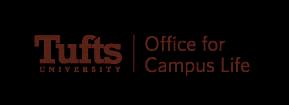



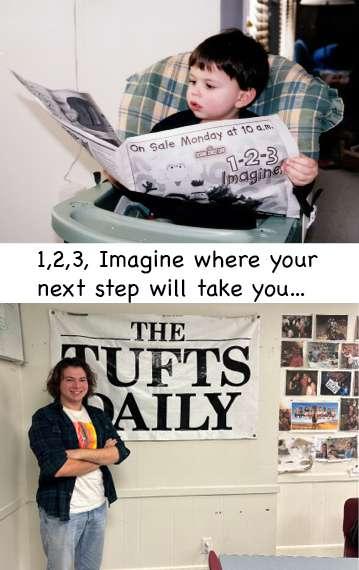
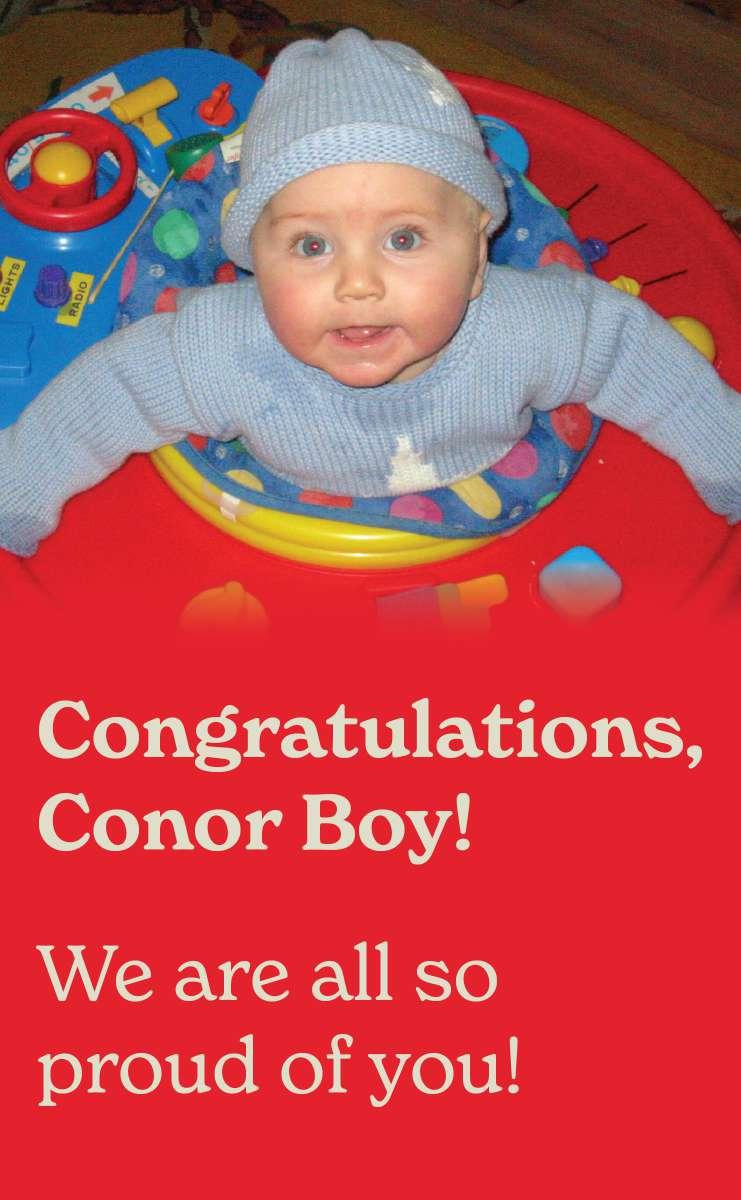

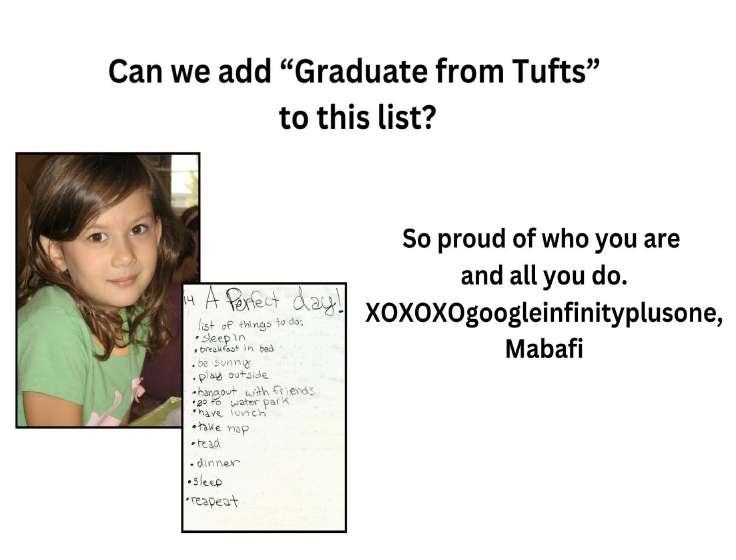

Tufts denies Medford Alpha Epsilon Pi’s affiliation request
Michael Onysko Staff Writer
In March, several Tufts students approached the university with intentions of reestablishing the Medford a lpha Epsilon Pi Eta d euteron fraternity chapter on campus. Tufts denied the request to officially recognize a EPi, and the chapter remains unaffiliated with the university.
“Student life and [the Interfraternity Council] are committed to supporting the organizations that are currently established and recognized on campus and to enhancing their growth and development,” Mary Kate Kelley, Tufts’ fraternity and sorority life advisor, wrote in an email to the daily. “We are not open to adding additional chapters at this time.”
The original Tufts a EPi chapter, which was founded in 1940, disaffiliated from the national organization in 2015, believing that their long term goals did not align with each other. The chapter established itself instead as local fraternity Pi d elta that same year. In 2017, Pi delta closed as an alternative to resolving allegations of misconduct and no longer has affiliation with the university.
Currently, the chapter is known as Medford a EPi and has six members. The members had been working with the national a EPi organization to gain recognition from Tufts and create an official chapter.
“a EPi [has] a long history with students from Tufts University in Medford,” Jon Pierce, who handles a EPi communications, said. “We offer our students
opportunities to learn about leadership, advocacy [and] philanthropy within the Jewish community, so we offer maybe a little different twist on the usual, more traditional fraternity experience. We had students who approached us and were interested in restarting a EPi with Tufts students in Medford and we have begun working with them on that.”
Eli Tenenbaum, current sophomore and president of Medford a EPi, expressed his disappointment at the university’s decision not to affiliate with the chapter, which inhibits participation in mixers and other social events with officially recognized fraternities and sororities.
“For now, the biggest issue we have … is that we’re unrecognized and we’re not part of the Greek community [at Tufts],” Tenenbaum said. “So we really can’t do events with other Greek organizations on campus.”
Tenenbaum believes having an a EPi chapter at Tufts would create a space of exploration and connection for Jewish students on campus.
“I feel like I didn’t find a place for myself in the current Greek life scenario at Tufts,” he said. “My dad told me about how he was in a EPi at Tufts. He loved it. It was something that helped him a lot in his career and his life. … I’ve been getting more in touch with my religion recently, so I wanted the Jewish fraternity experience so I can have that Jewish brotherhood without having to relearn what it means to be Jewish.”
d espite not being affiliated with Tufts, the chapter has been collaborating with other organizations outside of
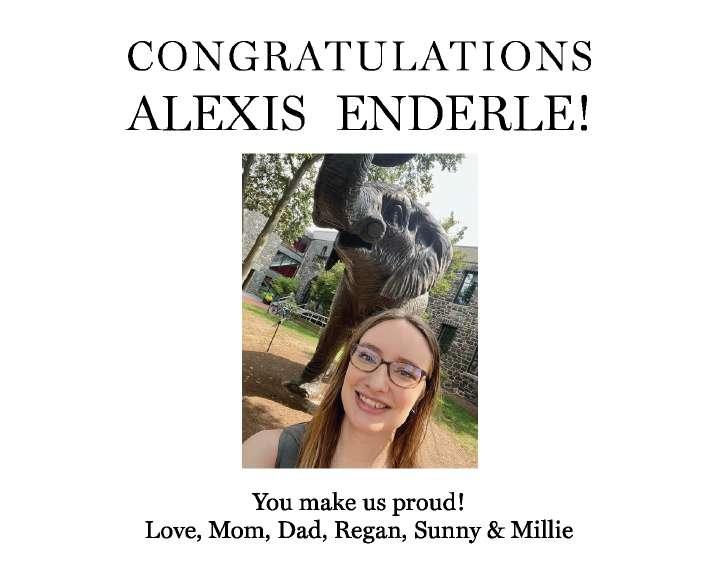
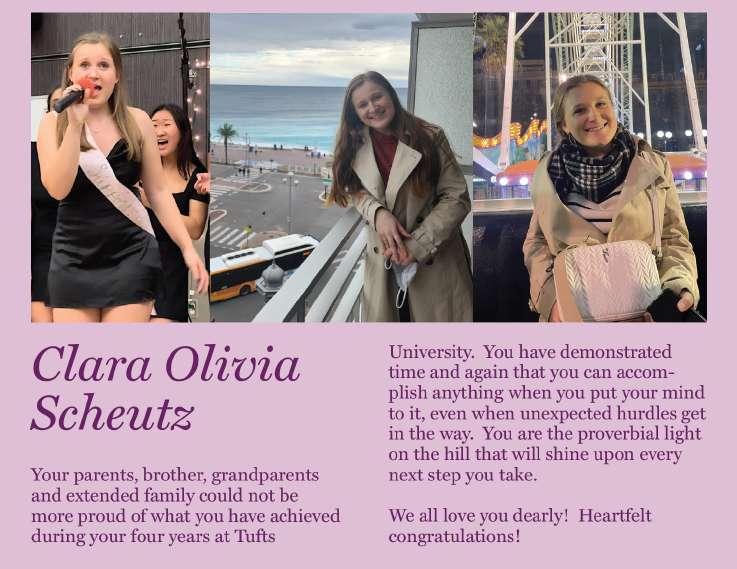

the university. This included hosting philanthropy events to donate to charities in the Boston area.
“We’re hoping to do our best with the situation we have,” Tenenbaum said.
“We have been doing events with other a EPi chapters in Boston like the [ones] in Northeastern and BU, they’ve been a fantastic help. Truly for a chapter just starting out, they have been a tremendous help to get us situated.”
Pierce explained that while recognition from the university is a long-term goal, the chapter is currently focused on recruiting new members and determining the level of interest from the community.
“We’ve had a cordial relationship with the university and we’re working towards that recognition in the future,” Pierce said. “But for right now, we’re
just looking to find students who are interested in joining the Medford, Mass. chapter of a EPi … working within the Jewish communities at Tufts to gauge interest and to drive interest.”
Tenenbaum hopes that the chapter will be recognized by Tufts in the near future, but in the meantime plans to adhere to university rules while gathering support and possible new membership.
“We’re hoping to continue to market through word of mouth,” Tenenbaum said. “We don’t want to break any Tufts rules, we don’t want to get in trouble with the administration and we want to be recognized eventually. So we’re trying to work around whatever parameters we can, so we can be recognized properly and go through the proper steps.”
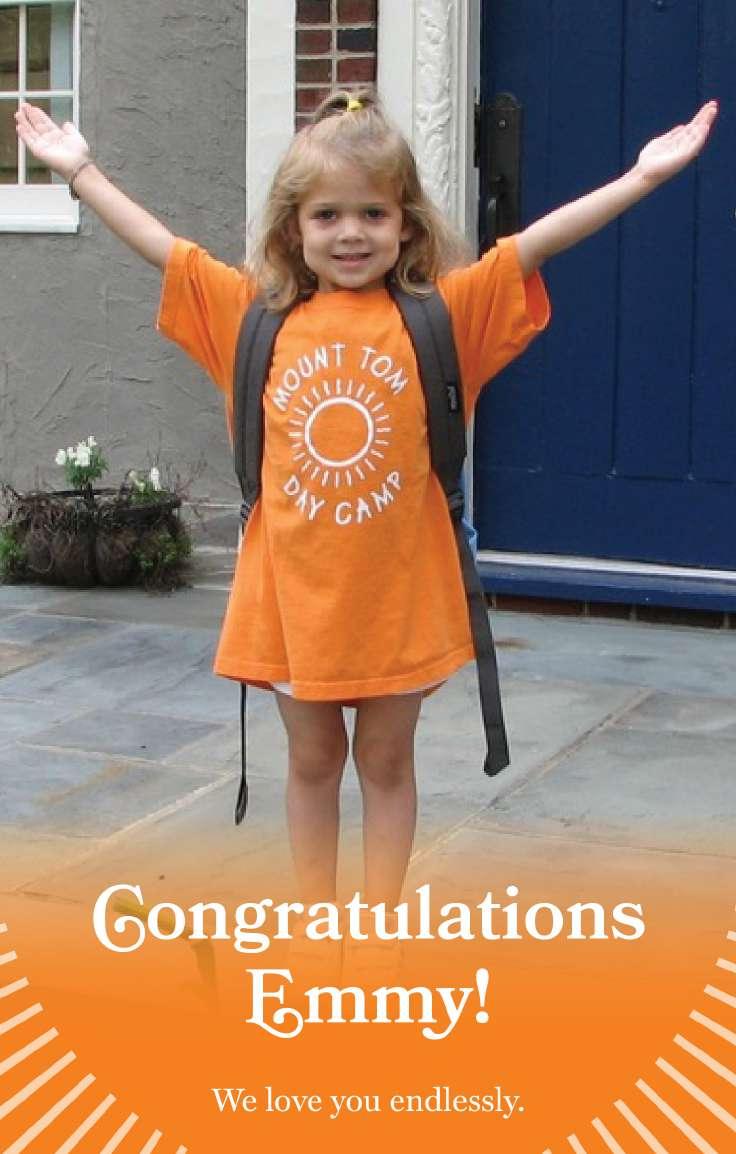
NEWS 18 SUNday, May 19, 2024 THE TUFTS DAILY UNIVERSITY
NICHOLAS PFOSI / THE TUFTS DAILY
The former Tufts AEPi house is pictured in 2015.
SCIENCE
Meet Professor Shelly Peyton, incoming biomedical engineering chair
Professor Shelly Peyton will be joining the Tufts department of Biomedical Engineering in July. The department was founded in 2002 and chaired by Professor david Kaplan. Kaplan stepped down in 2022, and Professor Sergio Fantini has served as the interim chair over the past two years until Peyton takes over. Recently, I was able to sit down and interview her about her background and her plans as the new chair.
Peyton is currently a chemical engineering professor at the University of Massachusetts amherst, where she has been working since 2011. despite her degrees being in chemical engineering, Peyton assures that her “work is squarely biomedical engineering.”
The Peyton Lab designs new materials to grow cells in — a field called tissue engineering. They use these materials to understand how the environment surrounding cells influences cell growth and how diseases develop and progress. Peyton is especially focused on researching cancer from this material perspective, which can provide new insight into why cancer spreads to certain locations in the body. as she put it, she studies “what about the brain environment is really hospitable for breast cancer cells to grow, but [what about] the kidney
environment is not.” The biomedical engineering department has a strong tissue engineering emphasis, so Peyton’s research and chemical engineering background fit well into the department.
When I asked Peyton about her plans as department chair, she started by saying that she is not trying to make major changes since practices that worked at UMass might not work at Tufts because the schools are so different. UMass amherst has an enrollment of over 28,000 students, in comparison to Tufts, which has about half of that number.
The changes to the department that Peyton will oversee are dictated by the current faculty. The first plan Peyton mentioned was to expand the department which currently has eight full-time professors. The department has strengths in tissue engineering, biomaterials (substances created to interact with the body for medical purposes) and optics (using light for medical imaging, diagnosis, therapy and research). They are trying to keep these research focuses strong and hire new faculty that can cross these boundaries — faculty such as Peyton, whose research incorporates both biomaterials and tissue engineering.
Logistically, expanding the department is quite a complicated issue, but Peyton is prepared to tackle this challenge. The bio-
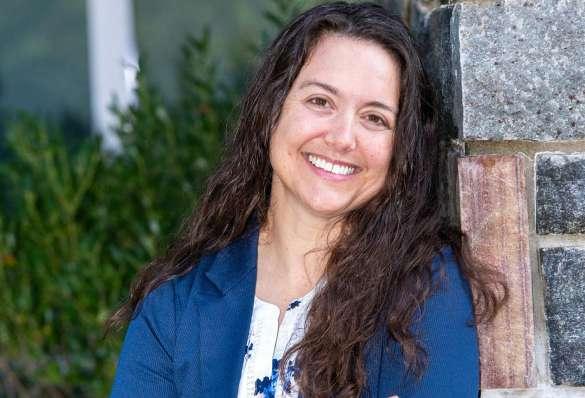
medical engineering department is based out of the Science and Technology Center, an older building on the other side of the train tracks from 574 Boston ave. The Peyton Lab, among others, has been moving into the Science and Technology Center, but finding lab space for these potential new faculty has been a challenge. To make this happen, Peyton discussed getting creative with fundraising from inside and outside the university. Peyton also plans to improve connections between Tufts alumni, making it easier for alumni with similar interests or in similar areas to connect and network. She wants to grow the Tufts network outside of just the connections students make while being enrolled.
“I think that there also is a want to connect more with our alumni, because I think people that leave Tufts are really proud of the education that they got here. … I want to keep those threads connected,” she said.
Finally, Peyton has a history of advocating for more diversity in academia, which she will bring to the department. She has worked with BME UNITE — Underrepresented Needs in Technology and Engineering — to publish a paper on equitable hiring practices, and she hopes to apply these findings as the department plans to hire new faculty. “[I want to make] sure that we’re growing the number of faculty that represent the students that come to Tufts as well,” she said.
Outside of these department-wide changes, Peyton has programs in her lab that will be moving to Tufts with her. The Peyton Lab runs a summer program for high schoolers called “Engineering the Cell.” The program supports rising juniors from underrepresented racial and ethnic groups recommended by their guidance counselors or science teachers. In the Peyton Lab, these students learn about different aspects of research each week, learning all about cell culture, biomaterials, 3d printing and chemical synthesis.
The summer program is clearly very meaningful to Peyton. She is proud of the way this program has shaped the lives of many of the students, saying that all the previous students have “gone to college, which is awesome, and many of them were on the fence about whether they wanted to do higher education or not.” In previous years, the program recruited from the Springfield and Holyoke areas, but since the Peyton Lab is moving to Tufts, they will start recruiting in the Boston schools.
We ended the interview with her asking me about my experience in the BME department for the last four years. She was very interested in what went well in addition to any improvements that she could implement. “I want to see change,” she said.
Life in STEM: Mike Kourkoulakos on the Daily, future plans in biology
Editor’s note: The Daily’s editorial department acknowledges that this article is premised on a conflict of interest. This article is a special feature for Commencement 2024 that does not represent the Daily’s standard journalistic practices.
Mike Kourkoulakos has loved everything science and engineering-related from a young age, but it was during his sophomore year of high school when he really started to feel “connected to biology.” after taking two biology classes in high school, Kourkoulakos decided that biology was his calling and what he wanted to pursue in college.
In his hometown Mahwah, N.J., Kourkoulakos participated in newspaper layout at his high school. He decided to bring his experience to the daily, as the pandemic was having a major effect on his student experience.
“I joined [the paper] during the COVId semester when things were out of whack and I was looking for something to do,” he said.
“I joined [the daily’s] Layout [section] because it was one of the few clubs doing things in person.” after serving as a layout executive for two semesters, Kourkoulakos took on the larger role of production director in spring 2023, overseeing all
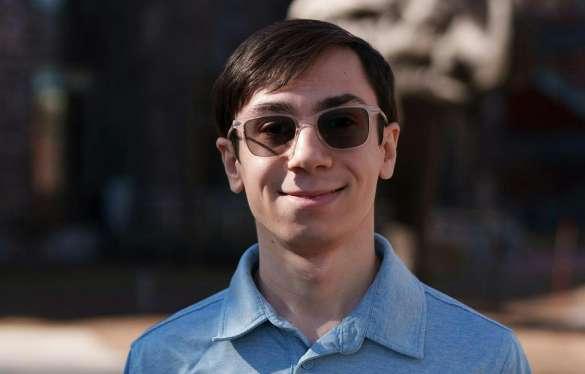
the moving parts of getting the daily’s many articles and issues published. Kourkoulakos particularly enjoyed the fast pace of publishing news articles. “People rely on us to put out the news. … and it’s hard, … but I’ve also really appreciated being able to work [with others to do so].”
Even when production became stressful, Kourkoulakos said that he and other students at the daily felt their work was enjoyable and that “[ daily members] could still laugh with each other and be friends.”
Kourkoulakos found a special camaraderie in the hustle of the daily office. He has since worked as an executive social media manager and assistant production director as well, contributing his valuable skills to other sections of the daily.
While juggling his commitments to the daily with his coursework, Kourkoulakos became more involved in biological research. He interned at Pfizer for two summers in clinical and diagnostic assay development — optimizing tests to detect the presence of pathogens and antibodies. In his first summer, Kourkoulakos fine-tuned an assay for the influenza virus while working under a senior scientist. He then shifted projects in his second summer to work on an E. coli assay.
Kourkoulakos also offered some general advice that he used in these positions at Pfizer and in life: “Just go for it. It can be kind of intimidating being around people who know what they’re doing, but it’s okay to make mistakes.”
He shared that college is truly a testing ground to branch out one’s
interests in as many ways as possible. “you won’t be perfect, but it’ll get easier over time,” he said.
Since his time at Pfizer, Kourkoulakos has become a master’s of science student at the Wolfe Lab at Tufts. While most accelerated master’s degree programs are “4+1,” meaning a person will receive their master’s and bachelor’s degrees in five years, Kourkoulakos is currently on track to receive both of his degrees in only four years. Since starting at the Wolfe Lab in the fall, Kourkoulakos has worked on two projects related to microbiology, which is the study of microscopic organisms.
Scientists have studied the slug gut microbiome — the composition and function of microbial communities in an organism — to understand how slugs metabolize carbohydrates.
Researchers are currently looking for ways in which these metabolic processes of slugs create biofuels for heating, electricity and transportation. However, there is not as much literature on the applications of slime residues that slugs produce.
Last fall, Kourkoulakos worked on characterizing the slime microbiome to understand more about the microbes growing on them.
“Slugs can harbor pathogens that transfer to plants,” Kourkoulakos said. “at the same time, the slime potentially has applications in
skincare for its anti-inflammatory and antimicrobial properties. … It is really novel work.”
This semester, Kourkoulakos is surveying commercially available cheeses, looking for penicillin-resistant microbes on cheese. He hopes to garner insight into how common the genes that foster penicillin resistance are and their overall function.
In the future, Kourkoulakos hopes to earn a Ph.d. ”[My Ph.d.] will most likely be in microbiology, but I’m keeping my options open,” he said.
after graduation, Kourkoulakos will be working in a Harvard Medical School lab as a technician to work on more projects and gain experience. When it comes to getting into research, Kourkoulakos suggested, “get started early. I entered late in the game. The Wolfe Lab was very receptive to having people come in and learn new things even if they just came to a lab meeting. … Getting involved early is a great way to boost your scientific career.”
Kourkoulakos dives headfirst into everything he does. His drive has allowed him to establish a place as an integral member of the daily and a key researcher in the Wolfe Lab — and it will continue to propel him into great success in his postgrad years.
Natalie Bricker contributed reporting.
SCIENCE 19 SUNday, May 19, 2024 THE TUFTS DAILY
Adi Raman Executive Science Editor
Meg Radke Senior Staff Writer
COURTESY SHELLY PEYTON
Shelly Peyton is the incoming chair of the biomedical engineering department.
QUAN TRAN / THE TUFTS DAILY
Mike Kourkoulakos is pictured.
Q&A: Diana Reiss decodes the dolphin Rosetta Stone
although dolphins are recognized for their large brains and intricate social structures, the extent of their self-awareness was not widely acknowledged until diana Reiss, a professor at the cognitive and comparative psychology program of The City University of New york, published her groundbreaking work. as a leading expert in dolphin communication and cognition, Reiss introduced innovative mirror self-recognition tests. By strategically marking dolphins in an area not visible to them, such as above their eyes, Reiss observed their reactions to seeing their reflections and playful investigations of marked body parts. These behaviors were traditionally associated only with humans and great apes, yet Reiss’ groundbreaking work revealed that dolphins also exhibit self-awareness.
as an aspiring marine biologist, I first learned of Reiss’s work at a very early age and have since discovered the depth of her research, like her study of dolphins’s capacity to exchange functional vocalizations with humans. Reiss is the author of “The dolphin in the Mirror: Exploring dolphin Minds and Saving dolphin Lives” and is a dedicated animal welfare activist. I invited Reiss, a scientific researcher whose work has an enduring influence on marine mammal biology and bioacoustics, and as an activist, writer and educator, to speak about her research as part of this series.
Editor’s note: This interview has been edited for length and clarity.
Amelia Macapia (AM): an important aspect of your research is identifying patterns. Could you explain how patterns function in your research and how you started looking for patterns in dolphin behavior and vocalizations?
Diana Reiss (DR): Often a good way to start is by just observing, not coming in filled up with ideas about what something should look like. Give yourself time to watch dolphins, to listen and to see what patterns emerge. It personalizes the work a great deal.
AM: are the parallels between human language and dolphin whistle language simply analogous or do they identify something deeper about ourselves and our own primordial history?
DR: dolphins have a rich repertoire of whistles. They use different whistles depending on the groups they are in and what they are doing. We have some ideas about the kinds of whistles they use, but they seem to vary a great deal in terms of both the parameters, as well as the nature of the contours — how frequency changes over time. There are also a huge number of other types of whistles they use, including pulsed wide-band calls and echolocation. We presume that echolocation has been primarily used for navigation. The animals will send out pulses of sound

clicks and then get reflected echoes back that give them orientation. The echoes give them information back about their world, and where others are relative to them. But we don’t know if they get other kinds of information in echoes or if they use them in any kind of communicative way. We have learned from studies in other labs that one animal can actually eavesdrop on the returning echoes and be able to respond and say which item was the target. So they don’t even have to put out the beam to be able to interpret the patterns that they are getting back. This suggests that other dolphins may be able to read the incoming echoes of other animals and get information.
But, I think we are still pretty far away from even understanding the smallest unit that may comprise a whistle and whether or not those whistles may be used in combination with other whistles. If I say “I am going to the store,” I can mix up the different words of that sentence, or make other sentences out of them. Those words are made out of smaller units of sounds called phonemes and morphemes. The duality of patterning makes our language generative, so that we can take a small number of elements and combine them and recombine them over and over again to make an infinite number of sentences that are meaningful. The question is whether something like that exists for dolphins.
AM: How do you immerse yourself in the sensory or cognitive or emotional worlds of the animals you’re studying as opposed to just analyzing them?
DR: When we start working with different animal species, we try to stay objective and unattached as much as we can. We name all of our animals with numbers and letters. But we start noticing that there are differences in personalities in our scientific studies. To say “personality” is fairly new in science. It’s very hard to be completely detached when you’re working with charismatic animals and you’re interacting with them. It’s a normal reaction to have relationships with others, including other animals. In science, we have an “it-ification” problem — the very language we use when we talk
about animals can affect how we perceive them ourselves as scientists, but also how others perceive them in terms of emotion. There were so many times when I would refer to dolphins as “he” or “she” in papers that I would submit for publication, and the editors would come back and cross it out and put “it” instead. and I said no, I want to call it a “he” or “she” or by their name. different dolphins show different types of behavior; maybe one will tend to observe the other more, another will be more reserved. But that is what makes it so interesting. These are not machines any more than we are.
AM: an important key to understanding dolphin communication was what you once called “the dolphin Rosetta Stone.” What was your experiment with the dolphin Rosetta Stone? What most surprised you about the findings of this experiment?
DR: I was interested in the cognitive and communicative data people were getting by teaching vocalizations to chimps and african gray parrots. Virtually all of these studies have shown us that other species can learn to use artificial codes in referential ways. The question is: do they use grammar? and how do they organize it?
In all of these studies, one of the key findings is that the animals have to work in a social context with communication. With dolphins, when you put them in a rigid situation where they are just interacting with a machine, it does not look anything like communication. On the other hand, if you are directly interacting with the animals, you are opening the possibility for all sorts of inadvertent cuing, like the Clever Hans phenomenon. I wanted to create a test of their communication and social learning that preserves sociality but also prevents cuing, so we created a keyboard. The keyboard gave the dolphins choice and control over the contingencies of the system, which we could use to passively record and identify patterns that might be referential in nature.
With the Rosetta Stone underwater keyboard, there were nine simple keys that would change their position from minute to minute based on a pseudo-ran-
wondered if she could honestly be understanding that this was a correction mechanism. does she understand why I use it? It’s hard to publish anything based on just an anecdote, so I decided to turn that into an experiment. So I purposely gave her some uncut tail sections, and each time she would put me in a timeout. That was one of the most interesting findings from that study because instead of looking at discrimination, I was looking at whether they could learn associations between things and how that matched preferences. But the fact that she turned the behavior back on me made me think: These are really magnificent minds and we have to think of creative ways to understand them.
domized schedule. If the dolphin hits a key, they hear a computer-generated whistle, and they get a corresponding object or an activity — for instance, a ball. What we saw looks very much like what we see with young children; the dolphins learned by association between the keys, sounds and objects. dolphins quickly began to press the symbols for items they preferred. They began imitating the sounds from the keyboard, first hitting a key, hearing the computer-synthesized whistle and then emulating it. But they also began using these whistles in ways that looked like they were being associated with the object. For instance, they started coming up to the keyboard, whistling the sound for “ball” and pushing the “ball” key — that is called productive use. We knew that they had associated those sound signals with the visual forms. But then we would find them creating “facsimiles” of the sounds when they were approaching or playing with objects, and we started seeing evidence that they could combine the sounds for “ball” and “ring” into one compound continuous whistle. That was maybe because they were producing that sound when they were playing with the balls and rings together, that they were putting signals together or that they made up a word for combined activity. So with these contingencies that they could explore on the keyboard, we saw what their interests were.
AM: One of the key features of language is following an order. There is a great scene in your book where the dolphin you are studying, Circe, puts you in a “timeout.” In the book, you describe how you would toss fish to Circe, and if she swam away, you gave her a “timeout,” where you would stand with your back to her. One day, you accidentally gave her a fish with its fins intact, and she spit it out and swam to the other end of the pool, remaining in a vertical position with her back to you for several minutes. She was putting you in a timeout. How did that happen, and what was that moment like for you?
DR: I was in my Ph.d. program, and this was my first real experiment. When that first happened, I was amazed, because I
AM: What is it like to write about animals as if they are characters in a book? How do you navigate the balance between maintaining scientific accuracy and avoiding anthropomorphism, while also conveying empathy, care and compassion towards the animals you are writing about?
DR: Humans diverged from cetaceans [dolphins, whales and porpoises] over 95 million years ago, but there are still these remarkable patterns that connect us. For example, when we give dolphins mirrors, they behave the same as humans. First, the dolphins act like they’re looking at conspecifics [members of the same species]. Then, they shift to contingency testing where you see these unusual repetitive behaviors in front of a mirror, and the dolphin realizes there’s a match to what they are doing, which is not what they would normally see in a conspecific across from them. This seems to be where they recognize themselves. and then they go on to the third stage, which is self-directed behavior, using the mirrors as a tool to examine themselves. The dolphins seem to be interested in looking at parts of their body they can’t see without a mirror. They like to examine the insides of their mouths or their eyes, or come up close. They do certain behaviors that would be analogous to a dance in front of a mirror, spinning or twirling; it’s playful behavior. They’re watching themselves do things they can’t see. and it’s not behavior they do towards conspecifics, so this is another pattern that emerges.
AM: If we are going to survive this new epoch characterized by mass extinctions and sweeping changes to ecological systems, how should our relationships with animals begin to develop?
DR: There’s a real relationship between knowledge, empathy and respect. It’s my hope that with increased knowledge, there will be increased empathy and respect, and we will become more concerned about their habitats because their habitats are our habitats. I think it’s our responsibility as scientists to find effective ways to share our science and engage the public because that can change policies.
SCIENCE 20 SUNday, May 19, 2024 THE TUFTS DAILY
Amelia Macapia Staff Writer
VIA FLICKR
A dolphin jumps above water.
FEATURES
Peace in the unknown: Maddy Noah looks back on her time at Tufts
Carmen Smoak Executive Features Editor
as the time comes for seniors to move their tassels, many are looking back on their time at Tufts with a newfound perspective. Certainly, no college experience is without its twists and turns, mistakes and lessons and memories and discoveries. This is deeply true for Maddy Noah, a graduating senior in the SMFa combined degree program. Reflecting on her five years at Tufts, Noah spoke about her unconventional college experience and what lessons and memories she will take with her as she leaves Tufts.
From start to finish, Noah’s experience at Tufts has been a unique one. While pursuing two degrees with majors in studio art, environmental studies and philosophy, Noah has also participated in clubs ranging from the daily to Boxers on the Hill. additionally, she worked as a tour guide at the Medford/ Somerville and SMFa campuses for four of her five years at Tufts.
Recounting her diverse interests and experiences at Tufts, Noah expressed that she has learned to be comfortable with having an unconventional path.
“I think I was scared [at first] to do something unconventional. and I’ve realized that a lot of
what I do is unconventional and that’s totally okay,” Noah said. “I think for a while, I was not really sure what I was doing. and now I’m not sure what I’m doing still, but it’s not terrifying [anymore].”
Some of Noah’s experience with unconventional learning came from her experience at Tufts during the COVI d -19 pandemic. She spoke about how the quarantine protocols while living in a dorm influenced her artwork and studies — in particular, the hurdles of making art in Harleston Hall.
“My second semester of my sophomore year, I took a paper-making class. … I was making paper on the floor in my dorm room and I was boiling cabbage in the Harleston kitchen to make dyes,” Noah said. “It was truly a harrowing experience.”
When in-person art classes returned at the SMFa , Noah enrolled in courses where she could get her hands dirty and create things that she could not in her dorm. Eventually, though, she returned to her primary medium of film photography.
Her practice centers around the concept of distortion and plays on what the viewer considers to be real. Noah dove into the thoughts behind her work.

“I’m really interested in making weird photos and playing with what photography is ‘supposed to be,’” she said. “Thinking about photography as a historical method of capturing what’s real about the world and capturing the world as it is. But inherently in photography, everything is about distortion. Even the lens itself is a means of distorting how we see things.”
She will graduate having completed a thesis in studio art entitled “I a m Like you, you a re Like Me.” This project consists of a collection of nude por-
traits of Noah and her friends in snowy outdoor settings. The work focuses on bringing down barriers between people, showing that we are alike in that we are bodies within nature. Her website expands on this.
“We are nature itself, one with the raw power of the trees and the harsh chill of the wind. There is no separation between me and them, there is no me versus them,” the website reads. “There are only bodies in the cold; interpreted, distorted, reworked and humbled before the lens.”
When asked what she hopes her audience takes away from seeing her work, Noah expressed how she hopes to inspire peace in confusion and distortion.
“I want people to be a little confused by what they see and learn to be okay with that. I don’t think art should be concrete in its answers,” she said. “I think that it’s more exciting when things are left up to the viewer and left up to interpretation.”
Beyond challenging her viewers to draw conclusions, Noah’s work also serves as a unique coalescence of her three majors. Combining studio art, environmental studies and philosophy, Noah has curated a unique perspective.
“I would say my environmental studies work does influence my art to a certain degree. a lot of it is situated in nature and in fostering a deeper connection with the external world,” she said. “So thinking really critically about how we’re looking at the places that we spend time in and connecting to nature. But I think that also ties a lot into my philosophy work. So they all kind of inform each other.”
NOAH, page 24
Meet this year’s recipients of the Presidential Award for Civic Life
Claire Wood Assistant Features Editor
Each year, Tufts University grants the Presidential award for Civic Life to students who demonstrate both academic excellence and civic impact. awarded to undergraduate and graduate students, the award constitutes the highest recognition for service, leadership and civic engagement at Tufts.
This year, 14 students — seven undergraduates and seven graduate students — will receive the award, each of whom has engaged in a wide variety of community-oriented projects during their time on campus. The daily spoke to five of the awardees about their civic involvement.
To Saffiyah Coker, a senior studying international relations and economics, civic life comes from applying academic learnings off campus and into the world.
“To me, civic life means taking the things that I learn in school, like in class, and then trying to contextualize them in my surrounding environment,” Coker said.
Civic engagement has been a large part of Coker’s time at Tufts. Some of her notable experiences include being a Tisch Scholar, working in the Office of Campus Life, working with the africana Center and volunteering at the Harvard Square Homeless Shelter. Coker will also be delivering the Wendell Phillips address at the Class of 2024’s Baccalaureate Ceremony.

alex dingle, a senior studying international relations and Middle Eastern studies, felt similarly.
“Focusing on civic life is trying to make sure that everybody feels aware of their positionality and understanding within the role of civic community,” dingle said.
dingle has been involved with political and humanitarian groups on and off campus.
On the political front, she has participated in the Middle East Research Group and worked for the Iowa democratic Party. She has also done humanitarian work in India, Jordan and Greece.
Both dingle and Coker will continue to work internationally as part of their civic engagement.
Coker has roots in several parts of the world and will
be moving to Indonesia after graduation.
“I have always had a very global perspective on life. My dad’s from Gambia and my mom’s side of the family is from Jamaica, so I’ve always had a very outside-ofthe-United States perspective,” Coker said. “after graduation, I’m moving to Indonesia for 13 months with this program called Luce Scholars.”
Through the Tisch College program, now called Civic Semester, dingle had the opportunity to live in India.
“It was an incredible experience, if not the most formative experience of my life,” dingle said “I lived in India for seven and a half months. I worked with Teach for India there at a
school. … It really taught me how impactful education is, and the importance of being on the ground and learning directly from my students and seeing things from their perspective.”
dingle has also worked with refugee children in Greece and studied abroad in Jordan for a year. after graduation, she will return to Jordan and then go to Chiang Mai, Thailand.
“I have received the Projects for Peace grant at Tisch College to go work in Jordan at the same organization that I volunteered with when I studied abroad there,” dingle said. “In august of this year, I was accepted to a fellowship called the Via Global Community Fellowship. I will be living in Chiang Mai, Thailand
for a year, and I will be working with students from Myanmar, with Parami University.”
There is also plenty of civic engagement on and around Tufts’ Medford/Somerville campus. Wanci Nana, a senior studying biopsychology, spoke to the importance of local engagement.
“I’ve been involved in a number of different things because I love personal development,” Nana said. “I love community development.”
Nana engaged in a wide variety of extracurriculars while at Tufts, notably the Black Men’s Group and the Tufts Community Union Senate. Nana is also an Interfaith ambassador, working with the University Chaplaincy to design programming for students of varying faith backgrounds.
“[The Chaplaincy has] been a large part of my experience here at Tufts: working with the chaplaincy under Elyse Winger with a group of students from different faith backgrounds,” Nana said. “Working with the different chaplains that are a part of the chaplaincy, and creating programs, and putting forward initiatives [and] hosting panels.”
ShaSha Kingston, a senior studying biology, psychology and environmental studies, is similarly involved on Tufts’ campus. She is very engaged with environmental activism,
FEaTURES 21 SUNday, May 19, 2024 THE TUFTS DAILY
COURTESY MADDY NOAH
Maddy Noah is pictured.
VERONIKA COYLE / THE TUFTS DAILY
see CIVIC, page 27
Alex Dingle and Adrian Huq, two winners of the Presidential Award for Civic Life, are pictured.
see
Roommate pairs demonstrate their Jumbo compatibility for all four years at Tufts
First-year roommates can be a bit of a hit or miss. Just because two people have similar sleep schedules does not mean they will be compatible, which is something that the housing survey from the Office of Residential Life & Learning unfortunately cannot predict.
d espite positive experiences with first-year roommates, many students still opt to branch out and live with different respective friends for their sophomore year.
yet, a select few first-year roommates choose to room together again, and an even more selective bunch continue living together as upperclassmen. While it may seem implausible to some, the housing algorithm can create a pairing so successful that it lasts for all four years at Tufts.
Biology major Jack Stube and economics major Jose a tienza are two of these lucky individuals. Both Stube and a tienza — alongside the rest of their then-incoming class — filled out the housing form over the summer before freshman year. The two were matched together and placed in Miller room 007, or as Stube affectionately described it, room “double-oh-seven,” a reference to the James Bond franchise.
“[The] first day went swimmingly. We played FIFa . We had a great time,” Stube said.
But things did not stay smooth for long.
“I would say the first month, though, was not good. I would argue it was terrible,” Stube said. “The thing is, I think we both [had] never lived with somebody [else], and we were having trouble adjusting to each other’s habits. a nd I thought he was goofy as hell and kind of a weird kid.”
a tienza had a poignant response to this assessment.
“I thought he was an idiot,” a tienza said.
Stube and a tienza were eventually able to overcome this adjustment period due to a very special circumstance: the COVI d -19 pandemic. Students in the Class of 2024 — including Stube and a tienza — had the unique experience of starting college in the midst of the pandemic, which unsurprisingly was accompanied by a plethora of obstacles. For instance, students who left for Thanksgiving in 2020 were not permitted to return to campus until the beginning of the spring 2021 term for isolation purposes.
While challenging, this adjustment actually served to bring the two roommates closer. Their floor in Miller Hall organized a going-away party for a tienza before his flight home, and this party proved to be a turning point in their friendship.

“My flight was at 5 a.m., so the whole floor stayed up together as a little send-off,” a tienza said. “I think that was the first time [Jack and I] properly bonded.”
The COVI d -19 pandemic also inspired weekly road trips in which the two would wake up early to drive up to various mountains across New England to ski.
“Jack brought a car [in the] second semester,” atienza said. “We would go skiing like every weekend because there [was] nothing to do during COVI d.”
according to Stube, those adventures consisting of early wake-ups and long drives proved to be an important bonding experience for the two.
“What really kind of forged the friendship and made it huge was skiing,” Stube said.
a nother shared interest between the two was their love of FIFa , the E a Sports soccer video game. Their passionate gaming sessions solidified their reputation as the “floor goons” in both Miller Hall as first-years and Harleston Hall as sophomores.
Interestingly, it also led to a high-stakes bet between the two last summer.
“a bout halfway through the summer, Jose, his mom and his sister came to visit,” Stube said. “Jose at dinner was talking to his mom about how I’m a bad FIFa player. … The thing is, historically, that’s not true. … I, in the confidence that I had at that moment, challenged him to bet.”
Unfortunately for a tienza, Stube was able to prevail and prove his FIFa worth, resulting in an unfortunate change in appearance.
“I lost the bet, so I had to bleach my hair,” a tienza said.
“It was box bleach from CVS. It was disgusting.”
a fter their first two years at Tufts, the two moved off campus together to an apartment on Boston avenue and have lived together since. While the two will be going their separate ways after graduation, Stube and a tienza expressed their full confidence in their ability to remain close friends.
“I see [Jose] more as a brother than I see [him] as a friend I have to invest in. I’m tied with [him] now,” Stube said.
While it is rare for roommates to stick together for all four years, a tienza and Stube are actually not alone in this experience.
Political science major Claire Slack and astrophysics major Cate Fagen have also been living together ever since their Hill Hall days back in 2020. a fter getting matched through Residential Life, the two quickly hit it off.
“I [had] been talking to [Claire] only over text,” Fagen said. “We [had] been texting a lot, actually, like we asked each other tons and tons of questions.”
Upon move-in, they found their decoration styles to be perfectly coordinated, setting a positive tone for the friendship. Like Stube and a tienza, the two also credit COVI d -19 for allowing them to grow so close since contact with other students was limited.
“We spent so much time together,” Slack said. “It was the time when you were only allowed … to sit with one other person at the dining hall. So of course we would sit together every single night. … We would sit in Carm and eat meals together, and I think we got along really well.”
When it came time to think about sophomore-year housing, the fact that the two would continue living together was never even a question.
“I don’t even think there was a formal asking; I think we just both assumed,” Fagen said. COVI d -19 restrictions began to lift in their second year at Tufts, allowing students more freedom to hang out with their friends outside of their dorms; however, Slack and Fagen still made sure to dedicate time to each other.
For instance, the two started a tradition of brushing their teeth together each night as well as weekend morning d unkin’ runs, a novel concept for California native Fagen.
“We had a little morning ritual on Saturday mornings,” Fagen said. “after a night of tomfoolery on Friday, we would wake up and we’d walk to dunkin’. … I learned a lot about the New England way of life that way.”
Speaking of New England traditions, the two also reminisced about Fagen learning how to ride the T. On one occasion, an unfortunate miscalculation on Fagen’s part left her stranded far away from Tufts.
“I’ve tried to bestow a lot of T knowledge on Cate, and my biggest failure was when Cate went to take the T to get her COVI d vaccine,” Slack said. “She takes the T and I’m so proud of her. I’m like, ‘ you’re killing it!’ a nd then I’m back on Tufts campus and I get a call from Cate and she’s like, in the middle of nowhere, like she’s in Newton or something.”
Fagen provided a very reasonable explanation for the mishap:
“I didn’t realize that inbound and outbound switch,” Fagen said.
For their junior and senior years, the two moved into an
off-campus apartment, yet still managed to secure sideby-side rooms. While some people prefer living solo, Slack and Fagen look back fondly on their time in doubles and emphasize the benefit of having a roommate.
“ you become so symbiotic with [each other],” Slack said. “ you get in such a routine of knowing what the other person wants to do and being like ‘Okay, we need to lock in and do homework for an hour,’ or like, ‘We’re gonna both be losing our minds in finals season and we need to go to d unkin’’ or something like that. I think that’s why living in a double was really beneficial to our experience.”
Fagen also emphasized the simple beauty of just coexisting and being able to share a space with another person.
“I think some of my favorite times in the dorm were when we both would just be there,” Fagen said. “It was like living alone, but in my opinion, better, because there’s somebody who’s there and you’re silent, but it’s very comfortable silence.”
While their era of joint toothbrushing and Saturday morning d unkin’ runs has come to a close, the two undoubtedly anticipate staying close. Slack is already planning to visit Fagen’s home in California for the first time. Needless to say, while Tufts marked the beginning of their friendship, graduation certainly does not mark the end.
The concept of a random roommate may seem daunting for incoming students, but one minute with the two roommate pairs will immediately prove to you that the survey can be successful.
FEaTURES 22 SUNday, May 19, 2024 THE TUFTS DAILY
Grace Nelson Deputy Features Editor
COURTESY CLAIRE SLACK, CATE FAGEN, JACK STUBE, JOSE ATIENZA
Roommate pairs Cate Fagen and Claire Slack are pictured, left, Jose Atienza and Jack Stube are pictured, right.
Breaking the mold: Unique double majors explore intersection of humanities, STEM
The phrase “double major” brings multiple plausible combinations to mind: for instance, computer science with mathematics, or perhaps English with philosophy. These pairings, while applauded for exhibiting a student’s hard work, do not turn heads for being unique. However, academic combinations such as English with biology, economics with music and even biology with Greek and Latin — belonging to seniors Ella Johnson, aliza Kibel and axel Ladd respectively — do just that.
Each of the three students revealed their own unique explanations for their decision to pursue two majors. Students with such major combinations are often assumed to be passionate about one degree while simultaneously needing the practicality of a second degree, as is the case for Kibel.
“I’m going into marketing after graduation so that was also part of the motivation for wanting to do an [economics] major,” Kibel said. “I knew [music] was something that I wanted to be able to study in college as my last opportunity to pursue [my] passion, since I knew I wasn’t necessarily going to go into it as a career.”
However, that is not the case with all double major students. Ladd, while interested in pursuing biology after graduation, had different reasoning for choosing his disciplines. Ladd says his STEM major is his true passion, and his decision to pursue Greek and Latin was for the purposes of academic curiosity, something Tufts emphasizes and encourages.
“I found [Latin class to be] very fulfilling in terms of intellectual development because it’s not just a language class. It’s so many things wrapped into one, [such as] history and sociology,” Ladd said.
Ladd expressed his desire to conduct biology research as a career, not out of necessity, but because of personal desire. He will be pursuing his passion at an immunotherapy research lab at Massachusetts General Hospital as a lab technician associate, with plans to later pursue a Ph.d. in immunology.
Johnson actually gave credit to her parents for the inspiration to pursue two majors.
“I like to say that it’s half of both of my parents,” Johnson said. “My dad’s an anthropologist [so] I grew up [around] a lot of biologists, and my mom is a librarian so I’ve always been surrounded by books as well.”
With the goal of teaching in mind, Johnson began tutoring for the Tufts Literacy Corps and later landed a biology teaching position in her junior summer. She is passionate about both disciplines; however, after reflecting on both experiences, a clear favorite arose for the senior.
“I was tutoring [in] Tufts Literacy Corps, and that was a

huge eye opening moment of, ‘Wow, I could teach English and really enjoy that for the rest of my life,’” Johnson said. “I ended up teaching genetics. I loved it, and genetics is my favorite part of biology, but I was still sad [that] I wasn’t teaching English.”
Johnson talked about how her switch in focus from biology to English was not necessarily a “conscious choice” but a “happy accident.” This so-called ‘accident’ paid off, as she is going to pursue a master’s in education — with the end goal of teaching English — from Harvard University.
Notably, all three of these students are pursuing careers centered around just one of their majors. This begs the question: What’s the point of their second majors? For Ladd, pursuing his second major of Greek and Latin has helped him achieve a sense of self-fulfillment.
“There’s not just fulfillment of what I need to do to make a living, but also [of wanting] to be a complete person,” Ladd said.
Furthermore, Ladd emphasized the modern-day implications of Greek and Latin studies. While it may sound surprising, Ladd has actually found use for his second major in his day-today experiences.
“We live in a world that has, time and time again, glorified classical antiquity and so a lot of aspects of our society are based on the Greek and Roman world, for better or for worse. … Even without using it in my career, I still use it in my daily life when I look at politics and even advertising,” Ladd said. “Rhetoric is such a basic tool that is used so viciously in our society today. Having the tools to analyze, recognize and even combat it [is] just invaluable, even if it’s not your career.”
On the other hand, for Kibel, pursuing her second major of music was a means of getting her creative ‘fix.’
“To [have] that creative component [in] my education at Tufts has been really amazing,” Kibel said. “It definitely is helpful to be using that creative muscle, whether it’s in a music class, or in certain aspects of an [economics] class where I can intellectually see overlap. Even though the topics are not the same, it is definitely helpful in being able to think a little bit more outside the box.”
When Kibel was asked her thoughts about the need for STEM majors to be exposed to more humanities, she wholeheartedly agreed.
“I have a lot of friends in theater who are doing STEM majors that are really considering doing either a music or theater major or minor in addition for exactly that reason, to get a little bit more of a well rounded experience here,” Kibel said. additionally, Kibel spoke about her interesting combination of majors allowing her to stand out.
“I found [a music major] makes me a little bit more interesting in a job interview setting,” Kibel said. “It’s something that adds a little extra pizzazz to a resume.”
Johnson had a slightly different opinion on the need for her biology major, since she came into college wanting to eventually pursue a STEMbased career, but ended up honing in on English. She admitted that if she realized her true passion earlier, she might not have pursued a biology major; however, that does not mean she necessarily regrets the experience.
“If I had discovered that earlier, I wouldn’t have [majored in biology], but I met a lot of great people in both majors, so I don’t know that I want to give that up,” Johnson said.
One of the only regrets she expressed with her double major was that her schedule permitted little room for exploration, as she dedicated most of her time at Tufts to fulfilling major requirements.
“I wish I hadn’t in a way limited what classes I could explore,” Johnson said.
a nother consideration that double majors like Johnson, Kidel and Ladd had to consider was the ability to study abroad, as the heavy workload demanded by the two majors could potentially limit their options. despite her rigorous schedule, Johnson was still able to study abroad at Queen Mary University of London her junior year, but not without a fight.
“I had to convince my advisers that I could do both majors and go abroad for a year,” Johnson said. “So they thought I was a little crazy, but luckily, they were pretty supportive of it.”
Johnson achieved studying two disciplines abroad through organizing and planning ahead of time alongside the team behind the Tufts in London program.
“The head of the London Tufts program knew that [I] needed more flexibility,” Johnson said. “[The Queen Mary] program was perfect for it.”
Kibel had no interest in studying abroad, as she felt her college experience was already shortened by COVId-19. Consequently, she did not want to miss any more of the on-campus experience.
Ladd studied abroad in Scotland at the University of Edinburgh during the spring semester of his junior year. While abroad, he took classes in both of his disciplines in order to complete the major requirements.
“I am a very aggressive academic, … so by the time of my junior spring, I had completed all but one class for my [Greek and Latin] major and one class for my biology major,” Ladd said.
While getting a double major in unique fields is a daunting task, all three of these students completed them successfully and are onto exceptional post-graduation paths. Furthermore, they each provided sound advice for incoming or current students wanting to pursue double majors. Kibel recommends starting this unique academic journey as early as possible.
“I was able to hit the ground running freshman year and knew those were the two majors I wanted,” Kibel said. “It’s definitely helpful to start early if you know what you want to do.”
Johnson had a more relaxed response, emphasizing the importance of exploration during her time at Tufts.
“Take whatever Tufts has to offer, and if you happen to take enough classes to add another major or minor, that works out perfectly,” Johnson said.
Ladd agreed, specifically encouraging STEM majors to pursue courses in the humanities.
“ you don’t even have to necessarily fulfill the degree, but I think tracking your humanities courses along a similar pipeline … rather than sporadically picking up [the easiest classes] is so much more rewarding,” Ladd said.
FEaTURES 23 SUNday, May 19, 2024 THE TUFTS DAILY
Dylan Fee Staff Writer
GRAPHIC BY BEX POVILL
The stage, the speaker and
the speech: What goes into a commencement address?
Max Druckman Staff Writer
The graduation ceremony is a culmination of four years of living and learning. On a beautiful May morning, thousands of students, donning voluminous robes and eager to see their caps fly into the sky, pack onto Tufts’ a cademic Quad. a s they take their seats, perched in front of the imposing stage, they know that only a few hours separate them from the rest of their adult lives.
But what occurs in those few hours should not be overlooked. While the pomp and circumstance of the ceremony might be tedious for those in the crowd anxious for the celebrations to begin, it is those formalities, chiefly the commencement speaker and honorary degree recipients, that determine how an already memorable day is remembered.
Tufts has awarded honorary degrees since 1858, when Thomas Whittemore, Universalist minister and vice president of the Tufts Board of Trustees, was awarded an honorary doctor of divinity degree.
But Tufts’ first official commencement speaker was not recorded until 1916. That year, author, educator and politician Hamilton Holt shared words of wisdom and encouragement with the graduating class.
In an additional commencement tradition, Tufts has bestowed 1,139 honorary degrees. The types of degrees awarded have included d octor of Humane Letters, d octor of Laws and d octor of Science among others.
For such an integral and longstanding parts of the graduation ceremony, little is known about how the degree recipients and commencement speakers are selected, and even less is known about who the past honorees have been.
Each year, Tufts fields honorary degree nominations from all members of the university community — faculty, staff, students and alumni. Nominations are accepted for a week-long period in the fall semester, typically in October. Nominations are then reviewed by the Honorary degree Committee, a branch of the Board of Trustees. The full board then
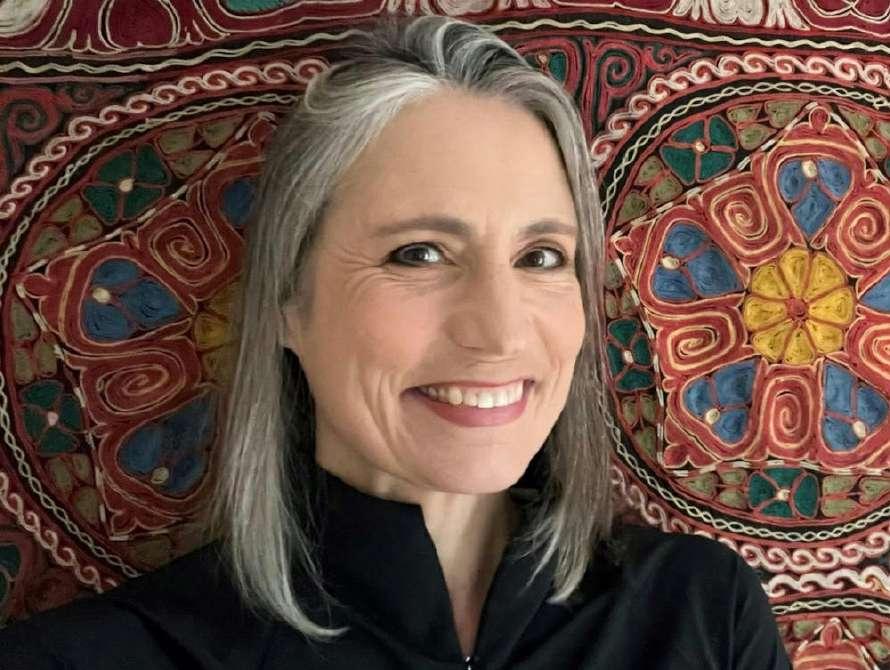
makes the final decision on who the degree recipients will be.
The four-person committee is currently chaired by Lisbeth Tarlow. Tarlow is joined by fellow Keshia Pollack Porter and Vivek Shah, as well as University President Sunil Kumar, who maintains his position ex officio.
In recent years, speakers have come from all walks of life. Secretary of State Madeleine a lbright, former Massachusetts Gov. d eval Patrick and “black-ish” (2014–22) creator Kenya Barris have all taken the stage on the a cademic Quad. Sometimes speakers are Tufts alumni themselves, such as actor Hank a zaria and journalist Meredith Vieira.
a ccording to Patrick Collins, Tufts’ executive director of media relations, potential commencement speakers have to meet a high bar.
“The university considers nominees for Commencement speaker and other honorary degree recipients who, at the time of their nomination, have a record of distinguished and sustained accomplishment in the varied academic, scholarly, and professional fields represented at Tufts, including business and industry, the visual, literary, musical, and performing arts, or public life,” Collins wrote in a statement.
The best place to find out about what goes into preparing and giving a commencement address is someone who has done it before. Sol Gittleman, alice and Nathan Gantcher University professor emeritus, was selected by former University President Lawrence Bacow to give the address in 2010, making him the first Tufts faculty member to receive the honor. For Gittleman, the honor was never about prestige, and he believes speakers should be connected to Tufts.
“I always said give it to a faculty member. Pick a different faculty member from a different school each year and stop this race for prestige for commencement speakers,” Gittleman said. “It’s supposed to be an intellectual exercise, so find somebody who can say something that’s important.”
For Gittleman, the speech is not solely meant to be celebratory, but also meaningful and impactful, akin to his ethos as a professor.
“I knew it was important for them, for the people listening, it’s important. So, you don’t want to do it trivially,” said Gittleman, reflecting on his own speech.
Gittleman’s guidelines for a good speech are straightforward. “Short and to whatever the points are you want to make.”
Though his address was given in 2010, much of Gittleman’s advice still holds true. He communicated to that year’s class the importance of studying the past.
“all I’m trying to do is find the truth, if there is such a thing. … The only way you can understand the facts is to have one foot planted in the past and one in the present, because if you don’t understand the history of how we got to where we are, then you’re not going to know anything,” Gittleman said.
a s for this year’s graduation class, Gittleman shared some reassuring wisdom.
“The secret is lifelong learning. This is why it’s called commencement. … It’s only the beginning of your education.”
But what makes the ideal commencement speech from a student perspective? For senior a idan Sweeney, the speech should include a mixture of elements.
“a decent amount of humor is good [and making] it a little more personable [so] you can relate to their story,” Sweeney said. “and, it’s good to hear some sort of advice, because, when you think about commencement, you’re going out into the real world, and that can honestly be scary. So, we’re all looking for a bit of guidance.”
a s for the background of the speaker, though, Sweeney is open to anyone, as long as they add something of value to an already special day.
“For me, I don’t really care so much if they’re from Tufts or not. I think it would be good if they were successful or they’ve had a lot of experiences that are worth sharing.”
No matter the speaker, seniors will face strong emotions come May 19.
“I definitely have some mixed feelings about it,” Sweeney said. “It will be good to graduate and get a degree under my belt, but I’m also feeling like I’m going to be leaving some stuff behind. … So, it’ll be rather bittersweet.”
This year’s commencement speaker will be Professor Fiona Hill, a senior fellow at the Brookings Institution who served in three presidential administrations as an expert on Russian- a merican relations. Hill, the current chancellor of d urham University, will receive an honorary degree alongside three Tufts alumni — composer Kathryn Bostic, former professor Kathleen O’Loughlin of the School of d ental Medicine and innovative cardiologist Jeremy Ruskin.
Tufts officials are excited to welcome Hill and her fellow degree recipients to campus.
“We’re honored to have Fiona Hill as this year’s Commencement speaker,” Collins wrote. “Her long and distinguished record of public service is in keeping with Tufts’ mission of civic engagement, and her personal story of the transformative power of higher education resonates with the Tufts community. … We’re delighted that she has agreed to join us and we look forward to welcoming her on May 19.”
In the end, no matter who is selected or how they get there, the day is about the graduating seniors. It is their hard work over four years at Tufts that made graduation day possible. While the day may end one period in their lives, the best is yet to come. In the eternal words of Semisonic, “every new beginning comes from some other beginning’s end.”
Combined degree senior brings environmental lens to artwork
a dditionally, she spoke to the fulfillment she has experienced from pursuing interdisciplinary fields in the Tufts combined degree program.
“Being able to foster an interdisciplinary practice has been really important for me,” Noah said. “Feeling like there is a place for all of my weird ideas to come together has been really exciting and something that I’ve loved about being [at Tufts].”
a lthough much of her intersectional work was done at Tufts, Noah also studied abroad in Ireland at the Burren College of a rt in the fall of 2023. While abroad, she took courses exclusively in studio art. She reflected that this experience gave her the time to think and synthesize many of the things she had learned at Tufts in the years prior.
“It was really nice to be able to synthesize and integrate everything that I learned about and was learning about continuing
to learn about and care about. It was so perfect,” she said.
Looking ahead, Noah is planning to hike Mount Kilimanjaro with her mother this summer following graduation. In terms of her future career, she hopes to continue her art practice no matter where the journey takes her.
“I would love to be able to work in the art world in some capacity in the future and obviously have my practice continue, regardless of where I’m working and what I’m doing,” she said. “For me, being in connection
with art is what I want to do with my life.”
as many graduating seniors including Noah can attest, college is a journey. Many of the lessons learned occur outside of the classroom as students learn about themselves and what they hope to do with their lives. Noah spoke to the wisdom she has acquired while at Tufts.
“I would say my biggest piece of wisdom is to be okay with not knowing and to learn how to be comfortable in being uncertain because I think that’s what a lot
of life is,” Noah said. “If you can get over the initial fear of it, it can actually be really liberating.”
Walking across the stage at graduation, students carry much more with them than the diplomas in their hands. For Noah, the biggest piece of wisdom she will take with her is reflected in her artwork: become comfortable with the unknown. Change is constant; you will not always know what you want to do, and that is okay. This advice is especially true for Noah and her peers who are stepping off the Hill and into the unknown.
FEaTURES 24 SUNday, May 19, 2024 THE TUFTS DAILY
COURTESY FIONA HILL
This year’s commencement speaker, Fiona Hill, is pictured.
NOAH continued from page 21
Tufts seniors see their academic achievements come to fruition, one thesis at a time
Ella Sanders Features Editor
a s the Class of 2024 approaches the end of their final semester at Tufts, some have concluded this year with a senior thesis, a culmination of their academic journey. These students have worked incredibly hard throughout the year to complete extensive papers and capstone projects in their respective courses of study.
Julio dominguez is a senior double-majoring in sociology and international relations. d ominguez wrote his senior thesis on how second-generation Latinos balance their ethnicities and sexuality.
“I’m looking at how they balance and navigate these different identities,” d ominguez said. “[Queer Latinos are] very marginalized since their forms of masculinity are not aligned with hegemonic masculinity … [and] Latino circles … tend to be very homogenous thinking, especially in terms of culture and expectations.”
For his thesis, d ominguez pulled from his own lived experiences.
“I, myself, am a queer, second-generation Latino. My parents are also foreign-born,” dominguez said. “I’ve always had these tensions, and there’s a lot of literature on the subject.”
dominguez views these cultural expectations as something that causes queer individuals to hide or conceal their sexuality. When researching these themes, he focused on literature relating to queer identities, masculinity and belonging.
“I attempted to look at masculinity as a very multifaceted topic in the sense that there’s so many different types of masculinity that people can perform or embody,” dominguez said. “Gender itself exists in a hierarchy. … at the top is this form of hegemonic masculinity that essentially perpetuates these marginalizations of other masculinities.”
To incorporate more perspectives into his thesis, d ominguez also interviewed 12 people about their personal experiences.
“In terms of recruitment, I couldn’t find too many people … there was sort of a lack of community for them,” dominguez said.
dominguez also noted that a hookup culture contributes to this lack of community.
“Generally, many queer second-generation Latino men aren’t friends with many people of the same community,” dominguez said. “[and there is a] stigma of like, ‘Oh, they’re messy,’ and many of them have hooked up with each other.”
d ominguez recommends pursuing a senior thesis, especially on a topic that is particularly important to you.
“I was able to employ my own positionality [and] perspectives on different issues,”

dominguez said. “It was very empowering.”
dominguez will be working for the nonprofit organization Teach for america for two years, and is interested in attending graduate school after.
Olivia Calkins is a senior majoring in chemical engineering and minoring in both food systems and cellular agriculture.
Calkins was first introduced to the idea of cultivated meat while taking an introductory biomedical engineering course with professor david Kaplan during her freshman year.
“I took a BME class with dr. david Kaplan, and on the first day, he was talking about how he works on cultivated meat, which is growing meat in a lab to essentially completely replace animal agriculture,” Calkins said. “That helps not only the environment, but also my personal interest in animal welfare. and then I was like, ‘This is the perfect combination.’”
a fter reaching out to Professor Kaplan, Calkins got to work in his lab during her freshman summer. Within the Kaplan Lab, Calkins developed a particular interest in insect cell culture, which develops insect cell lines for food pur-
poses. Specifically, the lab works with the tobacco hornworm caterpillar.
“The reason why insect cells are so beneficial to this field is because they’re able to grow at ambient room temperature, and they can withstand fluctuations in pH, and if you are thinking about growing meat for so many people, you want cells that are so adaptable,” Calkins said.
This interest in insect cells eventually developed into a full-fledged senior thesis.
“Specifically, my thesis is focused on scaling up insect cells [and] making them more adaptable to be able to grow,” Calkins said. “I really just wanted to tie [my research] all together in this one nice project and then share with everyone.”
Calkins’ senior thesis includes a written paper and a defense, which consists of a presentation of her research and time for questions from professors.
“I’ve been really focused on building this story over the past year,” Calkins said. “It’s been such a good learning opportunity for me to actually have independence and control over my projects.”
a fter graduation, Calkins plans to dedicate time to exploring a potential specialization before entering a Ph.d program.
Becca Kaplan is a senior double-majoring in English and political science. Kaplan recently completed her English senior thesis entitled “Split at the Root: a Critical analysis of the Intersectional Feminism of adrienne Rich and audre Lorde.”
“[I was] specifically looking at adrienne Rich and audre Lorde, and how intersectionality, which is really a new term, came to fruition in practice much earlier,” Kaplan said. “So, for audre Lorde, she is both black and queer and also a feminist. For adrienne Rich, she is a feminist but also Jewish and queer. So [I am] talking about their work and seeing how all of those identities are intertwined and expressed in their poetry and their prose.”
Kaplan originally became interested in adrienne Rich’s poems after taking an English course titled american Women Writers.
“We were reading her poetry and I was like, ‘This is amazing, and totally speaks to something that I felt in my life,’” Kaplan said. “So, I bought the whole
book, read all of that poetry and just became kind of obsessed with her.”
Similar to d ominguez, Kaplan was inspired by her own experiences.
“It was really cool to see some of my own identities in their work, and how I can relate to what they’ve written,” Kaplan said. “I think that was really the inspiration for [my thesis]: how Judaism and queerness has impacted my own version of feminism, and seeing how that has worked for these two women.”
Kaplan’s paper is around 40 pages, but English theses can range from 35 to more than 80 pages.
“It’s a very different project than anything I’ve done,” Kaplan said. “This is so much longer, so the focus is not just the one thesis that you’re carrying all the way through. It’s essentially a bunch of mini essays together that all have a general overarching theme.”
Kaplan plans to work after graduation but hopes to later return to school for a Ph.d. in English.
Spanning sociology, English and engineering, each thesis is a unique reflection of these seniors’ passions and learnings from the past four years.
FEaTURES 25 SUNday, May 19, 2024 THE TUFTS DAILY
COURTESY JENNA SCHAD
Olivia Calkins examines cells under a microscope in the Kaplan Lab in the Science and Technology Center on Nov. 17, 2023.
Computer scientists take to the field in soccer league
Arielle Flaherty Staff Writer
Cheers erupted from the teams lining the sides of the field. The Files of Kicks had just scored an equalizing goal, propelling their team into contention for the final game. It was april 30, 4:30 p.m. and there was an important soccer semifinal game taking place. No, not the Bayern Munich and Real Madrid Champions League game in Munich, but rather a game taking place across the world in Medford, Mass. These were, after all, the semifinals of the computer science teaching assistant soccer league.
Brisk temperatures, winds and overcast skies did not deter the teams and a few fans from coming out to Bello Field for the end of season playoffs. The Boolean Ballers were about to reestablish their lead with a cutting pass through the defense but the Files of Kicks goalkeeper came up with an expert stop. The game ended tied, and the teams gathered as the rules were announced for overtime. a few moments later, the teams eagerly took back to the field, subbing every few minutes on the fly. The energy was palpable.
In its third semester of existence, the league has expanded from five teams in its first semester to six, each with around 14 students. a fter a semester full of games (each team playing twice in 30-minute games), april 30 marked the second and final day of playoffs for the teams.
Fifth-year masters student Luke Ito started the league with some friends and spoke to the team’s informal beginnings.
“We just sort of started doing a semi-organized soccer league amongst a bunch of friends,” he said.
Now, the league has grown, almost doubling in size. More people attend the weekly games, making more substitutions possible.
Senior league organizer avi Shein expanded on how the league has grown.
“ yeah. I think we [have] 95 kids in the Slack now, [while] in

the previous semester we had 50,” Shein said.
Shein also spoke to the inclusive nature of the league: you don’t have to be an experienced soccer player to join; all backgrounds and levels of players are encouraged to take part.
“a lot of people in the beginning have a bit of hesitancy. I have heard plenty of times ‘I haven’t played soccer since kindergarten.’ and the point isn’t to play soccer, it’s for the community,” Shein said.
Senior amelia Cook is one of those individuals who expressed some initial hesitancy toward joining the league, but now she plays every week and is a captain of one of the teams.
“I didn’t play at first because I was so nervous ... but I went and hung out because it was a cool group of people,” she said.
“It was nice to be outside, watch people play a game and cheer people on.”
younger students have also enjoyed an opportunity to join the league. Willa a ndrade, first-year computer science Ta , shared that despite not
having played soccer since fourth grade, she had fun and felt she made an impact on the field.
“Last game I got my career high: 3 points in one game,” she said.
In order to make all the teams competitive, the captains have a multistep process for drafting teams. a fter each player self-evaluates their skill level, the captains meet and pick teams, making sure skill levels are evenly distributed. So far, this practice has ensured that no single team dominates.
Ito explained that he really appreciates this aspect of the league because it makes the games more entertaining.
“It’s nice that we can have every team make the playoffs and any team can make a run. It’s awesome. It makes the playoffs very fun,” he said.
Beyond playing the game, Ito shared that building community was one of his original goals in creating the league and seeing the impacts of the league has been rewarding.
“Seeing these freshmen and underclassmen who are just starting to Ta , … seeing people who are just starting to integrate themselves into the Tufts community and seeing this be the way that they do that is amazing for me,” Ito said. “Because it means that I’ve helped people to get something that I think [is] super necessary.”
League participants also spoke to how their participation has helped them feel more a part of the computer science community. a ndrade emphasized that her favorite part of playing is getting to know members of the department of Computer Science.
“The team bonding aspect is really fun — we have parties and I’ve gotten to know a lot of different people,” she said.
Cook agreed. “I think it’s definitely a really good community. It’s made me meet a lot more people in the department,” she said. a nother way the league is connected to computer science is through the team
names, which are all based on computer wordplay. This semester, players are members of either the Black Concats, Ctrl+ a lt+ d efeat, Purple Pythons, Name TB d, Boolean Ballers or the Files of Kicks.
While the league isn’t exclusively made of computer science Tas, most participants have a connection to the department or were brought in by a friend.
“I would say probably 85% are Tas,” explained Shein. In the future, Shein and Ito hope to pass down the league to upperclassmen so that it can continue to bring people together. Ito emphasized that so far he has really enjoyed leading the league.
“It’s been a great experience founding and leading it,” he said. “The whole point of it is to sort of bring people together in a ‘non-competitive, [yet] competitive’ environment where anybody can thrive and anybody can participate.”
Cook concurred. “It’s competitive, but it’s not super serious. … It’s just a lot of fun. It’s very chill. It’s very active.”
A snapshot from the past: Tufts Archival Research Center and Special Collections
Sydney Taylor Contributing Writer
Venturing deep into the basement of Tisch Library, you will find Tufts archival Research Center, also known as TaRC. Its collection exceeds 12,000 boxes of material, from the founding of the university in 1852 to the present day. director of TaRC dan Santamaria explained TaRC’s role on campus and beyond.
“We’re the steward of archival collections at Tufts. We also have collections that are not necessarily created at Tufts but are designed to support teaching and learning in various sub-
ject areas,” Santamaria said. “We [specialize in] social and environmental justice, broadcast journalism, … Boston area arts and performing arts and Boston area medical history.”
TaRC’s research is split 50/50 with half spent on Tufts’ University history while the other half looks to broaden the research in TaRC’s specialized subject areas. Furthermore, they support all Tufts University libraries, including the School of dental Medicine and School of Medicine.
It is important to note that the Tisch Library Special Collections and TaRC are two separate entities. While seemingly similar at first
glance, a few distinct differences set the pair apart from each other.
TaRC is its individual unit, answering to the Office of the Provost and receiving authorization from the Board of Trustees, whereas Special Collections falls under the Research and Learning division in Tisch Library.
Special Collections assistant Olivia Olafsson highlighted the purpose of their work.
“We are more interested in the rare books aspect of the library,” Olafsson said. “We collect published materials, many premodern manuscripts, and we are trying to create more of a rare books program that includes printing.”
Head of Special Collections
Christopher Barbour explained that the biggest difference between the two is their focus on published versus unpublished materials.
“Often, but not exclusively, archives are focused on non-published material,” Barbour wrote in an email to the daily. “a rchival and book collections present certain common concerns (rarity, security, environmental conditions) while having differing practices in organizing and cataloging material.”
Santamaria further explained what makes TaRC unique.
“What we have are archival collections, which you can think of as the raw material that people are producing as they’re doing their work or living their lives,” Santamaria said. “Things like correspondence, email these days [or] files that they keep as they’re doing their research.”
He went on to add that TaRC focuses on the “raw data that people work with” whereas Special Collections are primarily concerned with rare books.
For example, Special Collections has medieval manuscripts dating all the way back to the 13th century, and TaRC houses the infamous
FEaTURES 26 SUNday, May 19, 2024 THE TUFTS DAILY
COURTESY LUKE ITO
see TARC, page 27
The Boolean Ballers, one of the computer science soccer league teams, is pictured.
Civic Life awardees discuss citizenship, activism
CIVIC continued from page 21
working as a Sustainable Core Fellow and serves on the board of two environmental nonprofits. at Tufts, Kingston co-created three new sustainability programs through the Office of Sustainability.
“Off campus, I’m on the board of two different nonprofits. The first is called Our Climate Common … the whole mission is to foster the building of relationships across societal divides [to] move toward a more sustainable future together,” Kingston said. “a nd then the other nonprofit is called BREN, which is the Boise River Enhancement Network. This is based in my hometown, and it’s a very similar organization to the Mystic River Watershed a ssociation here where they help with land stewardship.”
adrian Huq, a senior studying applied environmental studies, spoke to the power of engaging with one’s local communities.
“I would say active citizenship is about learning the local politics around you,” Huq said.
For Huq, local includes Tufts as well their home community of New Haven, Conn. Huq co-founded the youth action Team under the New Haven Climate Movement organization and has also spearheaded sustainable efforts on Tufts’ campus as a Sustainable Core Fellow.
“With [the] New Haven Climate Movement, we’re very local-focused. We have a pretty central focus on targeting New Haven City Hall and the New Haven Board of Education,” Huq said. “Through that, I was able to learn a lot more about local politics and the local governing structures. So, I feel like active citizenship is about being informed about what’s going on in your city in your state, and then showing up to make your demands heard.”
The awardees felt that Tufts’ campus is largely civically minded with peers and community members lending
themselves to a greater sense of active citizenship.
“Tufts is a student body full of incredible students doing work focused on civic engagement, and I am constantly amazed by my peers, and my friends and my faculty who are really doing such incredible work across disciplines to further our community’s understanding of civic engagement and commitment to civic engagement,” dingle said.
Nana and Huq shared dingle’s sentiments.
“at Tufts, [civic engagement is] there. It’s everywhere,” Nana said. “It’s an aspect of Tufts that I really came to enjoy, outside of academics, in a number of different extracurricular realms. ”
“It just feels exciting to have these opportunities available at Tufts,” Huq said. “I’m grateful to all the student activists who are on campus and make this a more vibrant and fulfilling place to be.”
despite the year and their time at Tufts coming to an end,
their work is not done. The 2024 cohort of Presidential award for Civic Life winners deeply value active citizenship and will carry their experiences from Tufts into the next chapters of their lives.
Huq shared that their passion for activism isn’t going away anytime soon.
“Organizing is something I want to continue for as long as I can,” Huq said. “after you get into activism, I feel like there’s not any going back. I feel like it’s a pretty core part of my identity now, especially working with young people. That’s something I want to continue to do.”
Nana similarly finds his drive to better himself will stick with him following graduation.
“I do my best to be the best version of myself day in and day out,” Nana said. “It’s just a matter of finding what realms you want to exist in when it comes to civic engagement.”
Nana’s fellow awardees also recognized the importance of active citizenship in a context beyond Tufts.
TARC, Special Collections look to preserve Tufts history
TARC continued from page 26
Jumbo’s tail! When staff from both were asked about their favorite, finding an answer was a bit tricky.
Barbour pointed to the discovery of a 14th-century manuscript that was hidden from view and had gone years without being cataloged.
“For a discovery it would be hard to top the first medieval manuscript I found on a shelf of uncatalogued books, a 14th-century psalter and hymnal,” Barbour wrote. “at the time it was assumed everything was catalogued (which the state of that shelf told me was not the case), and that we had no medieval material.”
He also noted a book acquired at the New york antiquarian Book Fair that he had anticipated would be gone but to his surprise was still
available for purchase when he arrived days later.
“We acquired a book with beautiful illustrations of the first solar eclipse recorded at sea, in 1778,” he wrote. “Given the imminent arrival of the eclipse on Monday after the fair, I assumed it would be snapped up at the Thursday evening preview, long before I arrived. … Perhaps the earthquake in New york on Friday morning distracted people from thinking so much about the eclipse.”
alexandra Bush, the public services and instruction archivist at TaRC, explained that her favorites depend on what’s come in.
“as a reference person, my favorite thing changes periodically, depending on how excitedly people react to something that I show them,” Bush said. “But I
will never get tired of looking at photos of students from bygone eras. ’80s hairstyles, ’70s hairstyles, 1930s hairstyles. We’ve got it all. … It is so fascinating to see people change.”
The biggest messages from Special Collections and TaRC were accessibility, student involvement and the importance of preserving these records. Both have drop-in hours and are accessible by class and appointment.
“I really want to get more students and faculty involved in Special Collections, especially now that we have a space to hold classes and do printing,” Olafson said. “We’re here to support you on research projects.
any of our items can be called up for viewing and we also put on a lot of events for the Tufts community that includes printing or bookbind-
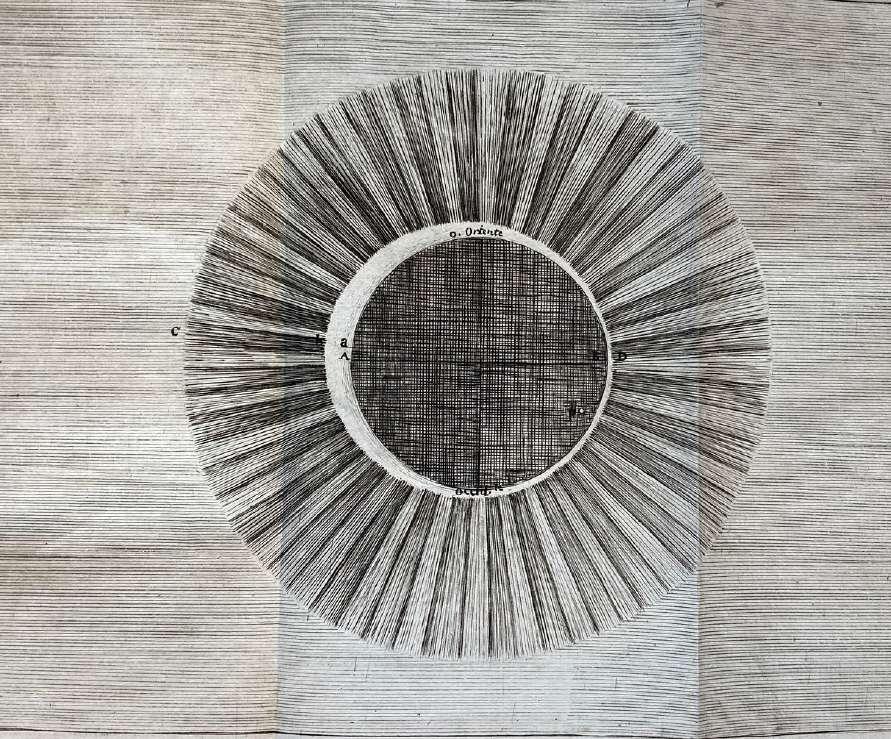
“What does it mean to be graduating in 2024, where it feels like every part of the world is on fire?” Coker said. “So much responsibility is on us, as these young minds graduating, and yet another election year, so many concurrent global crises and suffering … I do think it’s important to talk about these things and not even just talk, like, talk about ‘What are we gonna do about it?’”
“I think now more than ever, it’s important to really think about what civic engagement means, especially in a global world that increasingly looks to conflicts rather than community,” dingle said. “There’s a lot more work that needs to be done, and I’m happy to be on the journey of doing that.”
Kingston summed up each of the awardees’ drive for civic betterment best.
“It’s important to do what you can, in your capacity, to make the world a better place,” she said.
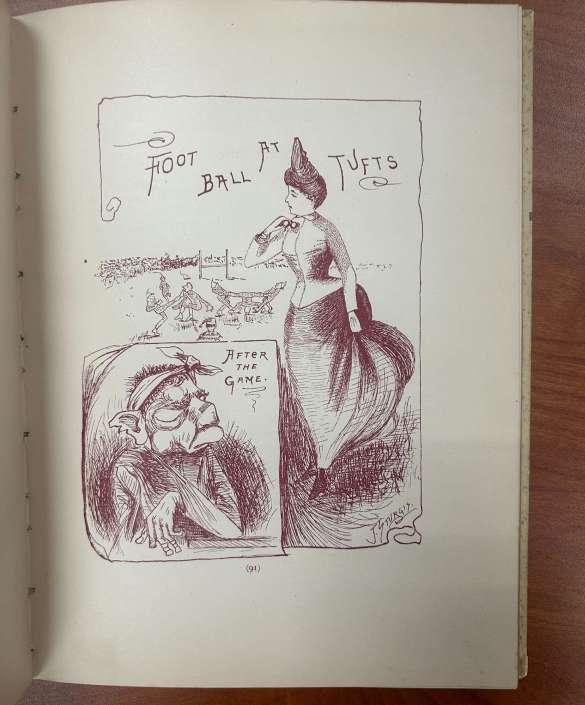
ing workshops or lectures with students and faculty members.”
Santamaria shared a similar sentiment, hoping to contribute to students’ learning experience.
“We’re always working to remove as many of those barriers as we can. I feel like we’re in a pretty good place in terms of [having] published descriptions of just about all of our collections on the website. We’re always looking to digitize as much material as we can to remove some of those barriers for people who can’t always physically come here,” Santamaria said. Olafson described how Special Collections seeks to expand the diversity of its holdings.
“I want to continue to grow our collection, which is a very fun part of the job, and I hope to grow the collection in a direc-
tion that reflects our increasingly diverse student body,” Olafson said.
Santamaria emphasized how student involvement can help the archives capture the breadth of campus life, especially through fostering relationships with student organizations.
“We’re always working to build as full and inclusive a picture of Tufts as we can,” Santamaria said, “and that includes … trying to document what students are really thinking about — both learning in a classroom and then outside of formal academic settings — and what their lives are like.”
So if you have a spare moment, a twinge or a curiosity for something old, swing on by the Special Collections and archives. They will gladly welcome you with open arms!
FEaTURES 27 SUNday, May 19, 2024 THE TUFTS DAILY
COURTESY TISCH LIBRARY SPECIAL COLLECTIONS A 1778 illustration of a solar eclipse is pictured.
COURTESY TUFTS ARCHIVAL RESEARCH CENTER
A cartoon of Tufts football from the archives is pictured.
ARTS & POP CULTURE
Seniors of Tufts theater reflect on four years of performance
Over 100 years after its founding in 1910, Tufts’ oldest student theater organization is continuing theater tradition and trying new things. Pen, Paint, and Pretzels, otherwise known as 3Ps, puts on productions of contemporary and classic plays every semester. Students in 3Ps have the opportunity to perform in, design and direct plays proposed the semester prior to each production.
In the past few years, 3Ps has undergone some changes and found new solutions in the face of the pandemic.
Senior Claudia Henry, previous secretary of 3Ps, described how she first got involved with 3Ps during the pandemic.
“Everything was virtual and I was not meeting up with people because I was personally very COVI d -conscious,” Henry said. “I was involved with a Zoom production [that was] put on my freshman fall called ‘The Bacchae.’ I was both a director and an actor in two different portions of it.” 3Ps was originally an umbrella organization for theater groups at Tufts, but they have more recently established themselves as an independent group. Various student performance organizations, includ -
ing musical theater, improv, sketch comedy and dance groups, are no longer affiliated with 3Ps. However, it’s not uncommon for students to participate in both the plays of 3Ps and the musicals of Torn Ticket II. a s is typical with the experimental nature of Tufts students, people love taking their passion for theater in different directions.
“In my opinion, as much as they are now separate [and] there’s no longer an umbrella group, I do think that anyone who’s involved with 3Ps should also feel like they’re a part of Torn Ticket as well. It’s one theater community,” Henry explained. “I’ve done plenty of work for both, so in my head, it’s hard to even distinguish between the two.”
Senior Tate Olitt, current vice president of Torn Ticket, has fostered her love for costume design through Torn Ticket productions while also trying out acting with 3Ps.
“I started in costume design,” Olitt said, “I actually discovered [costume design] in middle school. I did it all through high school, and then when I was coming to college, I wanted to make sure I had the opportunity to [continue].
It is now my career trajectory.”
She continued, “I had my first experience acting a year ago, with 3Ps. I was in
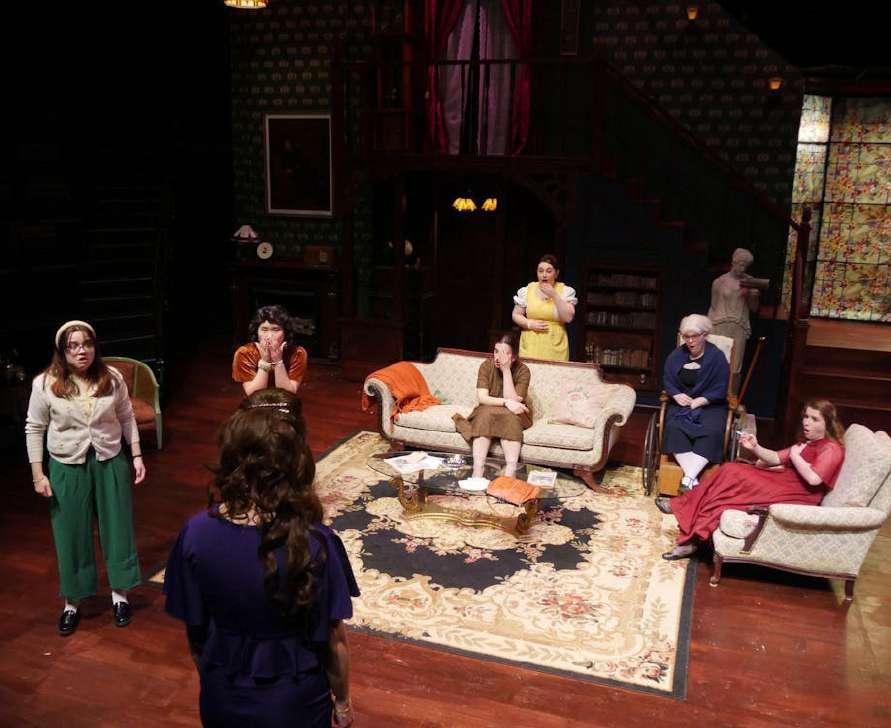
of 3Ps’
‘Eurydice’ and it was an amazing experience. Now I have fallen in love with acting, and I hope to get to do more.”
This semester, 3Ps staged a production of ”Eight Women,” originally a French play called “Huit Femmes.” The story follows eight women who are all suspects in the death of a fam-
ily member in an isolated cottage. The directors of the 3Ps production — Henry and Juliet Baker — translated the play into English for the Tufts audience. Henry described the challenges of the translation process.
“The fun little secret is that I actually know very little French,” Henry revealed.
“Juliet Baker is the co-director and co-translator. She is from France and speaks French fluently as her first language, and this was also one of her favorite plays.”
Henry and Baker worked together to translate the play
see THEATER, page 29
Students, faculty mourn end of Tufts/NEC dual degree program
after nearly 50 years of providing rigorous academic and musical education to Tufts students, the Tufts/New England Conservatory five-year dual degree program is coming to an end. The decision to end the program was made in summer 2023, and its termination was announced by email to students in the program and department of Music faculty and staff on Oct. 25, 2023. NEC faculty were notified of the decision on Oct. 24. Students currently
enrolled in or accepted into the program will be allowed to complete it, but no new students will be accepted into the program, and it will end when the last student graduates. There are currently 14 students in the program.
The program was co-founded in 1976 by T.J. anderson, a world-renowned composer who served as chair of the Tufts Music department from 1972–80, and composer donald Harris, then vice president of the NEC, in an effort to improve Tufts’ music offerings. It offers a Bachelor of Science or arts from Tufts, in
addition to a Bachelor of Music from the NEC. It is the only program in the country that offers simultaneous bachelor’s degrees from a liberal arts university and an unaffiliated conservatory. The program boasts alumni as distinguished as Chad Smith, the president and CEO of the Boston Symphony Orchestra. according to dean Carmen Lowe, who advises students in the program, the decision to end the program was made by James Glaser, dean of the School of arts and Sciences, in collaboration with Provost Caroline Genco,

University President Sunil Kumar and other advisers.
“The decision to end the dual degree program was made last year by Tufts. as part of the arrangement with NEC, one of the partners could pull out if the program was no longer working,” Glaser wrote in an email to the daily.
Upon receiving the news that the program was ending, students and faculty were invited to an open meeting on Nov. 9, 2023 to discuss the decision, which was, at that point, final.
Cost was a major factor in the decision to the program. In the November meeting, it was estimated that the program cost Tufts close to $400,000 per year and that “the costs outweighed the benefits.” In his statement, Glaser also mentioned the program’s high dropout rate (close to 50%, according to Lowe), the pressure placed on the students and administrative challenges, including conflicting schedules and transportation concerns.
The daily interviewed three students about their experiences in the program: graduating fifth-year Julien Rollins, fourthyear Lily Stern and third-year Oluwanimofe akinyanmi. The daily also interviewed faculty and staff in the music department, including former chair John Mcdonald; studio manag-
er and NEC/Tufts alumnus Peter atkinson; and part-time lecturer Sid Richardson, a Tufts alumnus and faculty member at Tufts and the NEC. Most of the interviewees attended the meeting on Nov. 9. Though many students in the program reported having busy schedules during the school year, they still find the time to focus on what is important to them.
“I really love everything I’m doing,” akinyanmi explained. “It is nice to be busy with something that you enjoy.”
“What they were saying about students struggling, it’s partly to do with the fact that we don’t get that much support,” Stern said, discussing administration’s concerns about dropout rates. “I would say that a lot of the students are thriving, actually.”
“We’re kind of an orphan program,” Rollins said, echoing Stern’s feelings. He called Lowe “the first dean in a while that has actually cared about the program.”
Of the seven students, faculty and staff the daily spoke with, only Lowe was consulted about the decision, though she did not have the final say.
“I wish there was more of a conversation about it,” akinyanmi said. “Nobody told us until after the decision was made.”
aRTS & POP CULTURE 28 SUNday, May 19, 2024 THE TUFTS daILy
COURTESY TATE OLITT, KIERA O’CONNOR
The cast
“Eight Women” is pictured in Balch Arena Theater.
Jennifer May Assistant Arts Editor
see NEC, page 29
Abbie Klein Arts Editor
NICOLE GARAY / THE TUFTS DAILY
The Granoff Music Center, home of Tufts’ music department, is pictured on Aug. 8, 2020.
Senior Profile: Jason Wallace imagines new worlds in thesis film ‘Citizens of Kattaquam’
Matthew Winkler Arts Editor
Graduating senior Jason Wallace is nearing the end of post-production for his thesis film “Citizens of Kattaquam.” Featuring scenes with up to 40 cast members and a crew of 15, Wallace’s grandiose sci-fi epic is not the typical small-scale production expected of student films on sparse budgets. But for Wallace, pursuing one of the most ambitious Tufts thesis films in recent years was necessary to realize his vision.
“The senior theses I’ve seen in the past, while they’re good, they’re not really the films that speak to me or drove me to do film in the first place,” Wallace said. “I figured if I’m going to do a senior thesis, it has to be different than other theses and replicate the films that made me get into storytelling in the first place. That just so happens to be ‘Star Wars,’ so I wanted to do a sci-fi fantasy thing.”
It might be surprising to learn that Wallace, having now written and directed a 30-minute sci-fi epic, had no ambitions for film prior to college.
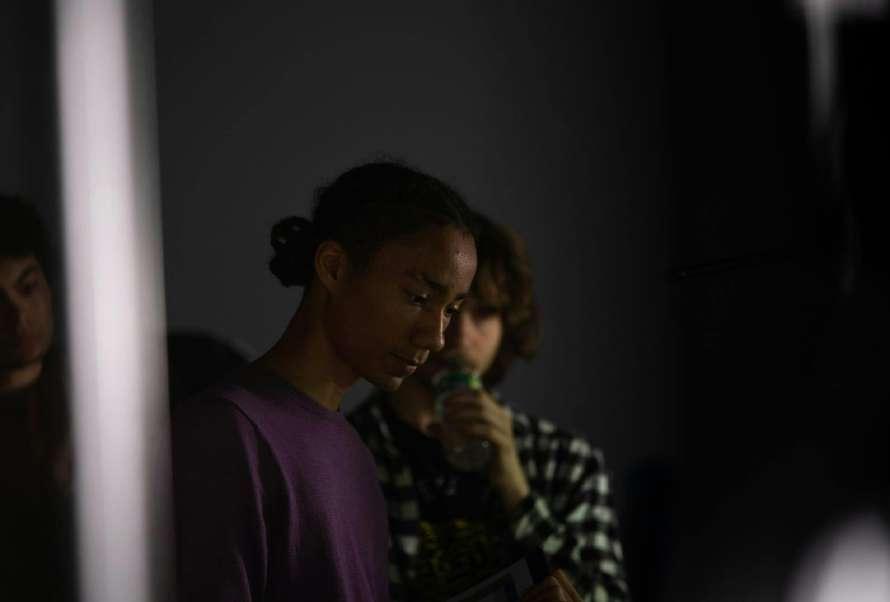
director of “Citizens of Kattaquam,” is pictured.
“I actually applied to be in the School of Engineering, because I was a STEM kid,” Wallace said. However, during a gap year in Brazil before college, Wallace had a change of heart.
“d uring Brazil, I figured I was doing [engineering] for the wrong reasons. It was
more [about] money and just because that’s what people expected for me,” Wallace said. He experimented with international relations and political science as potential new majors, but neither seemed to work for him. Based on encouragement from a friend’s father,
Seniors of Tufts theater groups look back
THEATER continued from page 28
over the course of several months.
“ d uring the past summer, [Baker] started … going through the play in French and putting a rough translation in,” Henry said. “a nd then from there, we had several sessions where we sat down and went through the various scenes in the play.”
Translating the jokes was a team challenge for Baker and Henry.
“We were learning from each other the best way to get across the humor in French that I couldn’t understand [but] that she could,” Henry said. “How do we explain that and make it funny to perform for a mostly [Englishspeaking] audience?”
Many students across the Tufts theater groups expressed one common sentiment: a love for performance and production. Whether behind the scenes doing design or in the spotlight, the members of 3Ps and Torn Ticket put their hearts into theater. For a na Muñiz Rodríguez, a sophomore who recently acted in “Eight Women,” she had an incredible experience in the show.
“I would do it again if I could,” Muñiz Rodríguez said.
“It was a four-hour rehearsal three times a week, so it was a time commitment, but it was really fun.”
Like Olitt, many of Muñiz Rodríguez’s past theater experiences have been behind the scenes, in costume and makeup design, and she described the
fun in stepping out of her comfort zone this semester. To anyone interested in theater, she encourages them to join 3Ps.
“It can be daunting at first, but it’s really fun once you step out of your comfort zone, and it’s really fun to do it with people in your grade … [while also getting] to know people in other grades,” Muñiz Rodríguez said.
For audrey Sacks, a senior who has been involved in Torn Ticket and Tufts’ theater department productions, being on stage has been a key part of her college experience, despite the interruption of COVI d -19 in her freshman year.
“I feel like I’ve gotten a lot out of the theater experiences and learned a lot in the three years that I’ve been able
WALLACE
a professional in the entertainment industry, Wallace tried out some film classes when he started at Tufts.
“It was really funny because when I started out as a film major, I hadn’t seen that many movies,” Wallace said. “I was very much like, ‘Star Wars’
is the only one I watch. a nd FMS really opened me up, so I watch more stuff now.”
a fter taking FMS 10, an introductory production course, in the spring of his first year, Wallace knew that film was for him.
“That was really the class that made me decide, ‘Oh, I like this,’ because that was the first practice course,” Wallace said. Taking higher level production courses like Screenwriting 1 and 2, as well as Script to Screen prepared Wallace to make his own film outside of a typical course structure.
“[For] a thesis, you are on your own,” Wallace said. “ you’re expected to know what a call sheet is, how to cast, how to location scout, all of that.” as he began to make his vision a reality, he was not without fears.
“all the lead up to shooting, I was like, ‘This is a lot, I have no idea how it’s going to go.’ I was preparing myself for the worst,” Wallace said. “It was very anxiety-inducing the first weekend [of shooting]. The first scene we were doing was in the Barnum studio, and I remember pacing around as
see WALLACE, page 35
to engage with theater,” Sacks said. “I feel really good about potentially going into community theater in the future and enjoying other opportunities to get involved in some way.”
First on the list for 3Ps this fall is “The Complete Works of William Shakespeare ( a bridged) [Revised],” which will serve as their first-year orientation show, better known as the “O-Show.” It will be directed by Sophie Littman and performed in early September at the end of orientation week.
Sacks provided some insight into Torn Ticket’s fall lineup. “I know that next year they’re going to do a version of ‘Footloose,’ which is so exciting,” she said.
a fter
“Footloose” in September, Torn Ticket is
Music dual degree program terminated after 50 years
NEC continued from page 28
In the meeting, students realized that even representatives from the NEC were surprised by the decision. according to Stern, Tufts administrators made the choice to stop accepting applicants without consulting with NEC beforehand.
“It was a unilateral Tufts decision,” Stern said.
When asked about their feelings on the program’s ending, all students and faculty agreed that it was a disappointment.
“It was such a great opportunity to be able to explore your interest in music and an academic discipline at a high level
at two of the best schools in the country,” Stern said.
“It makes sense,” akinyanmi acknowledged. “I guess money is a reason, but we’ve had a lot of really successful graduates from the program, and I feel like it’s something that Tufts should be proud of, so it was a little disappointing to see it canceled.”
“It’s a unique opportunity,” added atkinson. “It brings people to Tufts that wouldn’t otherwise come here.”
Over 65 program alumni signed a petition addressed to administrative leaders asking Tufts to reconsider the decision to end the program and requesting further communication.
despite this, Mcdonald doubts that the decision will be reversed. Mcdonald expressed confidence that the program could have continued if enough support had been provided. He suggested that Richardson, a faculty member at both institutions, had enough knowledge to help students navigate the two schools. Richardson told the daily that, had he been asked, he would have been willing to play this role. In an email statement to the daily, NEC Provost Benjamin Sosland wrote that “NEC made every effort to extend this partnership,” and expressed disappointment at the program’s ending.
Glaser suggested that Tufts hopes to consider a combined bachelor’s/master’s program with the NEC, similar to an existing program at Harvard. dean Lowe mentioned that this model can be less stressful and more affordable for students. However, students say that these require a higher level of musicianship before college, making them less accessible. Rollins explained that students like him from rural areas would have been unable to receive the level of pre-college training acceptance to these programs requires. Mcdonald also seemed doubtful that undergraduate music training in a liberal arts university could substitute
staging a production of the musical “Between the Lines,” while 3Ps will be producing Shakespeare’s “a Midsummer Night’s d ream.”
Graduating from Tufts theater is an emotional experience for the seniors, who have put so much energy and passion into the productions they have been a part of. Reflecting on her time in Tufts theater, Sacks shared some of her feelings about the community.
“I’m glad that the community is so vibrant, and the graduating seniors are very, very passionate. The theater is very near and dear to our hearts,” Sacks said. “So I believe that everyone’s going to keep it in their lives in some capacity, because how can you live without it?”
for an immersive conservatory experience.
When asked about the program ending, dean Lowe was optimistic about future collaboration between the two schools.
“The way the program has been running has been extraordinarily stressful on the students. It feels like so many of them are missing out on so much of their undergraduate experience. There are a few rare students who really thrive, but even then, it’s extremely stressful,” Lowe said.
“I’m hopeful that we can come up with a program that’s better, that is focused on a bachelor’s and a master’s between the two schools.”
aRTS & POP CULTURE 29 SUNday, May 19, 2024 THE TUFTS DAILY
COURTESY JASON
Jason Wallace,
Senior Profile: Carl Svahn brings his love for art, journalism to the Daily and beyond
Ethan Essner Assistant Arts Editor
Editor’s note: The Daily’s editorial department acknowledges that this article is premised on a conflict of interest. This article is a special feature for Commencement 2024 that does not represent the Daily’s standard journalistic practices.
Carl Svahn entered Tufts as a first-year in the fall of 2020. With classes held online and COVId-19 restrictions in full effect, Svahn, like many others in his grade, felt isolated, so he began looking for ways to connect with his classmates. a comic book lover, he spent time at Comicazi in davis Square, which is where he learned about the opportunity to pursue journalism with the daily.
“I had started to go to Comicazi, the comics store in davis, and I was picking up comics to fill out the time,” Svahn said. “and eventually I saw drew Weisberg, who used to write for arts, and he was writing about comics at the time.”
Svahn’s interactions with Weisberg motivated him to reach out to the daily and start writing about comics. This was only the beginning for Svahn, as his impact and dedication to the daily has been notable, especially for up-and-coming writers. after starting as a staff writer crafting eclectic pieces on comics and other
art forms, Svahn branched out and began to cover the Boston arts scene. Pieces he remembers especially fondly include an article on Porter Square Books’ new location in 2021 and a Weekender on the 2023 Boston Sci-Fi Film Festival. Svahn later expanded his role, eventually becoming executive arts editor and chair of the Education Committee.
Svahn explained his biggest goals in both of his leadership positions.
“I wanted to keep arts going and sustainable after [previous executive editor] Henry [Chandonnet] did an awesome job,” Svahn said. “and [with the] Education Committee, I was trying to give that a purpose. … I tried to both give it more direction, but also keep the ‘seniors hanging out’ side of it.”
Svahn also wrote for the daily’s News section during his sophomore year, including an article on personal protective equipment research at Tufts, and made several contributions to the Video section, including a profile of Tufts Garden Club and a tour of Gifford House with former University President anthony Monaco. He credited his mentors in each of these sections, Chloe Courtney Bohl and Ty Blitstein, with inspiring him and helping him become a better journalist.
Just as Weisberg welcomed him into the daily, Svahn described his efforts to reach out to new members of the daily to
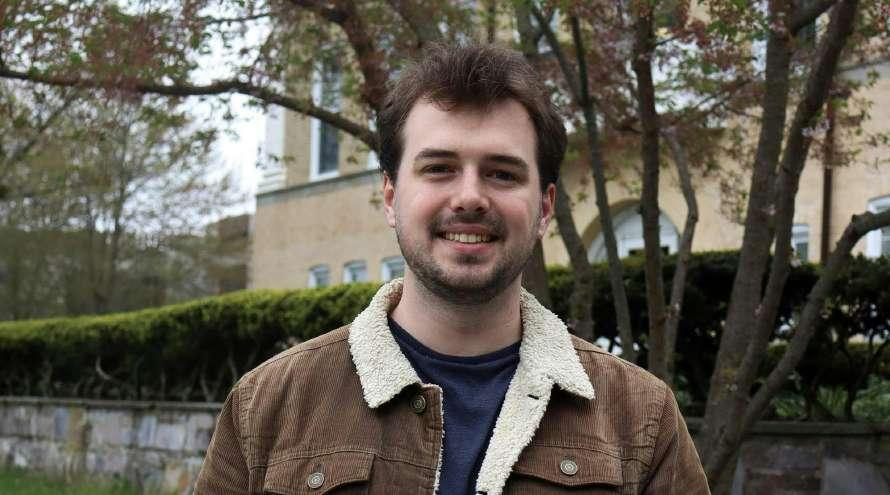
let them know that their input is valued and encourage them to expand their roles in the organization. additionally, Svahn is a major advocate for creating an open, welcoming space in the daily office.
“The first time ever I went into the office … no one talked to me and I was kind of thrown in the corner, ” Svahn said. “I’ve tried to contribute to fixing that, and being like ‘hey, the office is a fun spot.’”
Svahn described how the “dailmunity” — the quirky portmanteau used to describe the daily’s community — impacted his own experience.
Seniors of KoDA continue to foster a welcoming environment for all
Odessa Gaines Arts Editor
The Korean dance association, better known as Koda, is Tufts’ very own student-run K-pop dance group. Koda members collaborate on K-pop covers in weekly rehearsals, club bonding events, semester showcases and videos of their performances — which they post to their youTube channel. a relatively new club that emerged right before the
onset of the pandemic, Koda has only grown in numbers and notability over the past few years.
The club is run by co-captains Tracy Lu and Mary Wilson, both graduating seniors. In interviews with the daily, Lu and Wilson reflected on the past several years on Koda Wilson joined the club as a freshman, serving as the underclassmen representative, social chair and finally, co-captain her senior year.
d espite Ko da’s growth in membership, the club has remained a close-knit community due in large part to the members’ efforts to foster an inclusive environment.
“at the beginning of the first practice for every song, everyone will sit in a circle, and we’ll introduce themselves … and that does a lot to help break the ice,” Wilson said.
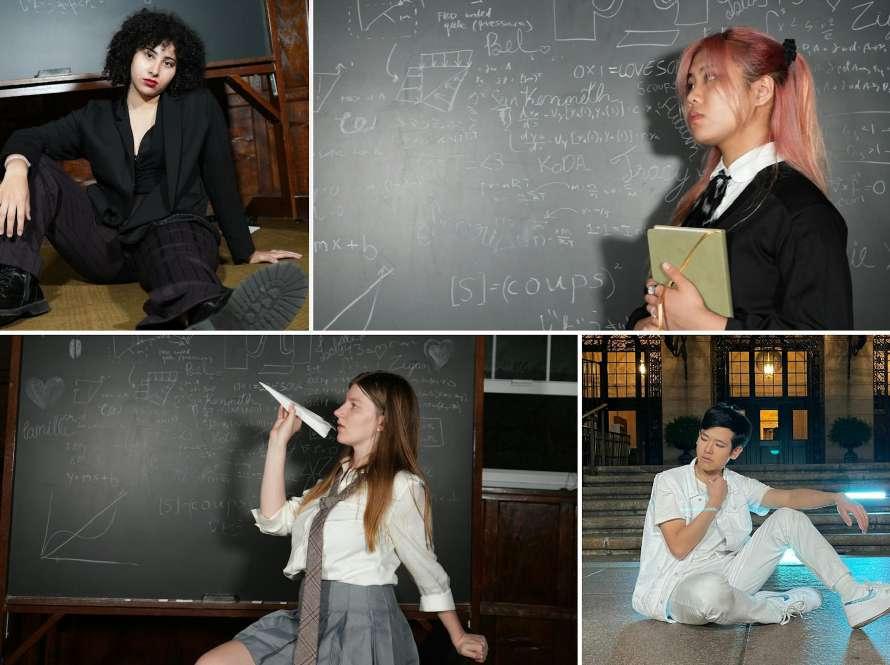
“If there wasn’t an arts ‘dailmunity,’ I don’t think I would have eventually gotten to the point in the daily where I am now,” Svahn said. “I would not have committed to something as hard as I have with the daily if it wasn’t there. … I don’t know what it is about the ‘dailmunity’ as a whole, but you just want to be a part of it the more you learn about it.”
It’s undeniable that the “dailmunity” was a campus home for Svahn. as a leader at the daily, Svahn has made efforts to pass this feeling on to others by demonstrating its value to the Tufts community,
especially to those with an affinity for writing.
When asked how he’ll remember his time at the daily, Svahn emphasized how much the experience as a whole means to him.
“arts is my home. It’s where I started, and it’s where I met all of these people, but the whole [experience] is the big takeaway for me,” Svahn said.
Svahn’s growth as a writer and an advocate for the daily is a prominent part of his daily journey. He’s always wanted everyone around him to succeed, and his contributions have certainly left a mark in the daily’s history.
Kenneth Tam’s ‘Standing in Soft Formation’ departs Tufts University Art Galleries
Erin Zhu Deputy Arts Editor
Kenneth Tam’s “Standing in Soft Formation” recently ended its three-month tenure at Tufts University art Galleries’ exhibition space in the aidekman arts Center.
Tam, an artist based in Houston, Texas and Queens, N.y., is currently an assistant professor at Rice University and a member of the faculty at the Milton avery Graduate School of the arts at Bard College. He has previously served as a lecturer at Princeton University, Sarah Lawrence College and Harvard University. Known for his experience across a variety of artistic mediums, Tam practices in video, sculpture, performance, movement, installation and photography. His work often explores the complex interactions between gender, intimacy and public performance. Such investigation can be found once again in his contemplative exhibition “Standing in Soft Formation,” which was housed at aidekman arts Center on the Medford/Somerville campus from Jan. 24 to april 21.
In “Standing in Soft Formation,” Tam explores the myths and performative culture that forms the foundation of american ideas regarding masculine identity, particularly its influence on the for-
mation of asian american identity. The exhibition demonstrates Tam’s fluency in multimedia work and includes choreographed video, photography and sculpture, and puts into conversation his two most recent projects: “Silent Spikes” (2021) and “The Founding of the World” (2023).
“Silent Spikes,” which makes up the first section of the gallery, is a meditation on intimacy, social customs and masculinity explored through sculpture, photography and a two-channel video. The video explores the aforementioned topics through the vernacular of mythologized american archetypes, such as the archetype of the cowboy. In conjunction with images associated with the all-american West are videos and sculptures that include references to the lives of the Chinese railroad workers who endured withering physical conditions, low wages and social isolation while they completed the construction of the transcontinental railroad. Considered one of the greatest engineering feats in american history, the construction of the railroad connected the eastern american states to the West, laying the foundation of america’s unprecedented prosperity.
aRTS & POP CULTURE 30 SUNday, May 19, 2024 THE TUFTS DAILY
VERONIKA COYLE / THE TUFTS DAILY
Carl Svahn is pictured on May 1.
COURTESY LU XU, ISABELLA RODRIGUES-SILVA
Clockwise from top left, Mary Wilson, Tracy Lu, Blaine Zhu and Julia Andrews are pictured.
see KODA, page 31
see TAM, page 37
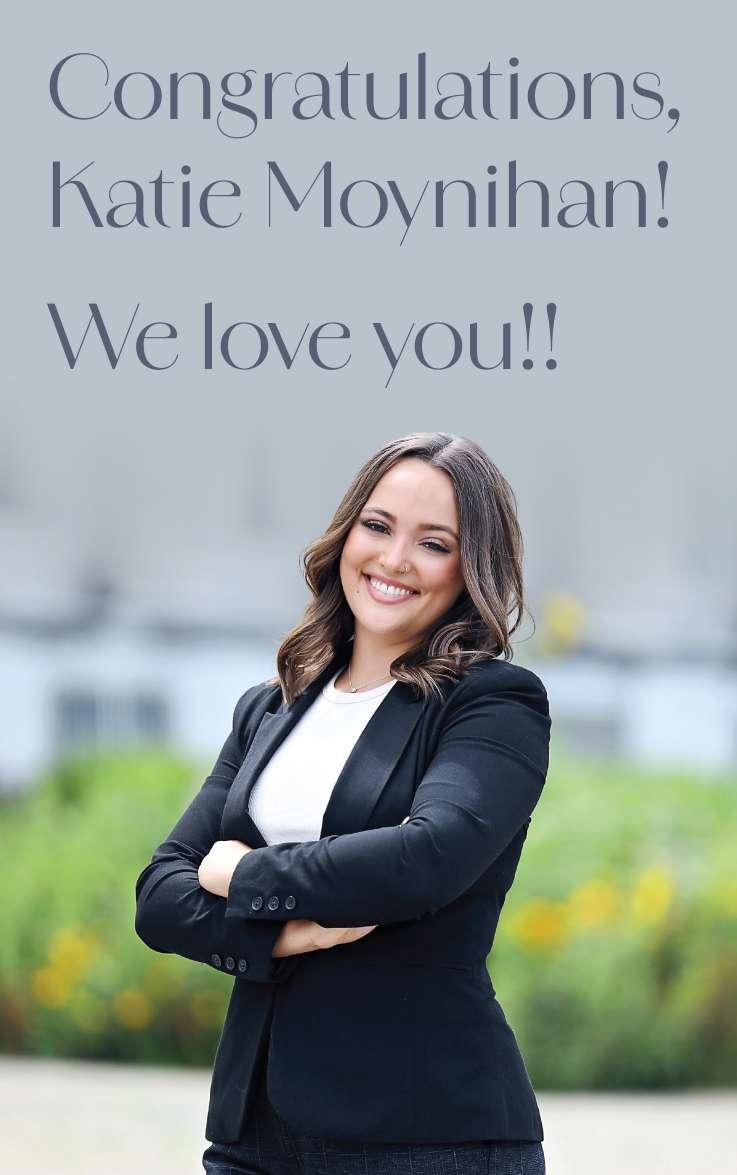
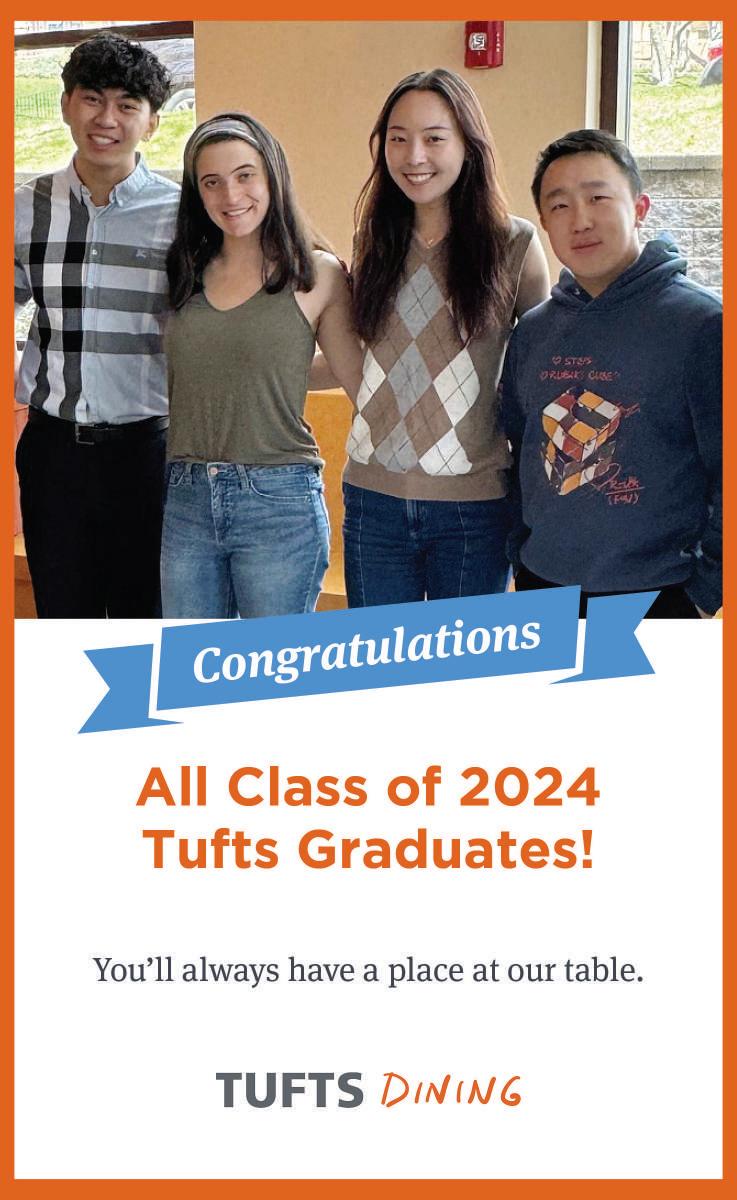
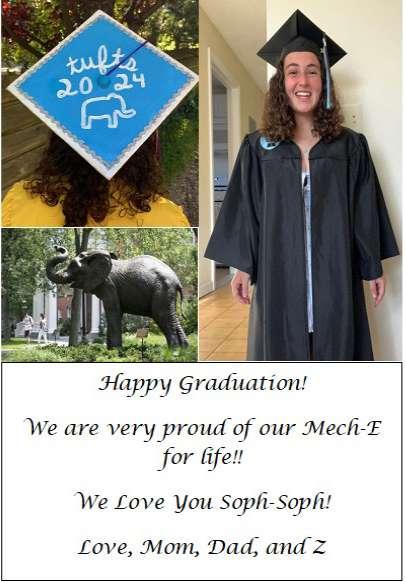
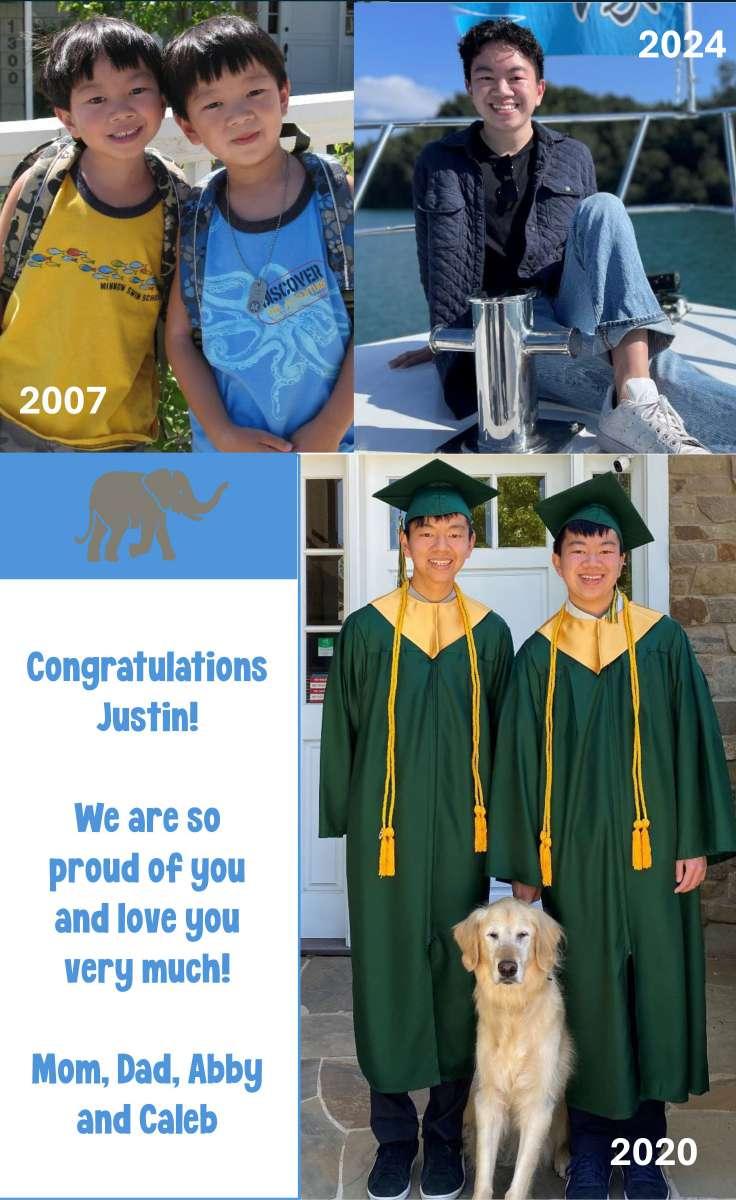
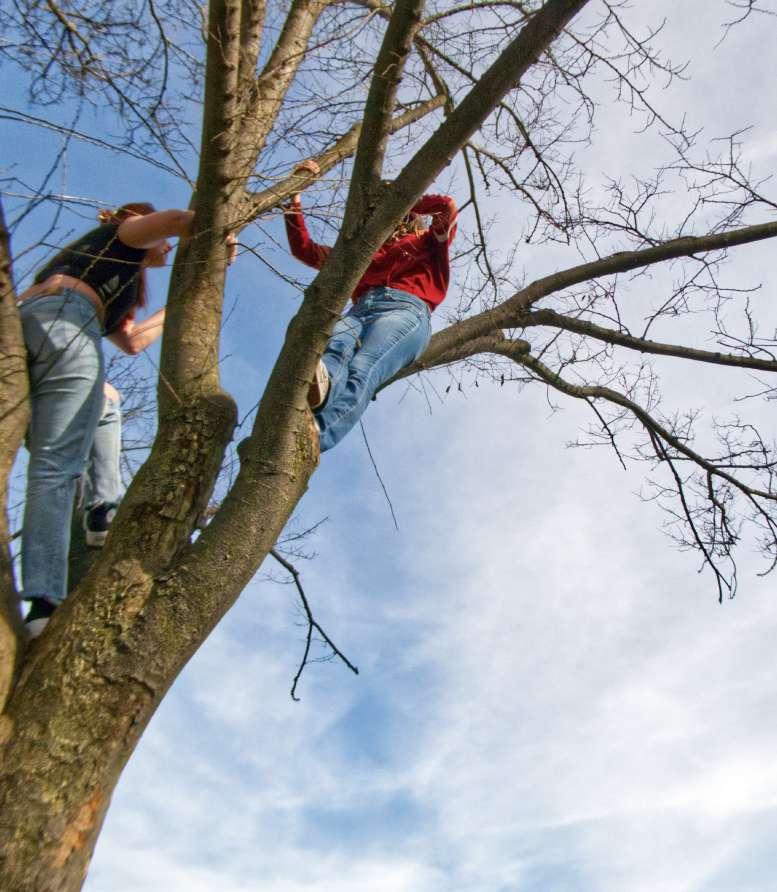

InPhotos:EclipseatTuftsPHOTOCREDIT:VERONIKACOYLE,ARINAVETTAANDOLIVIAWHITE/THETUFTSDAILY
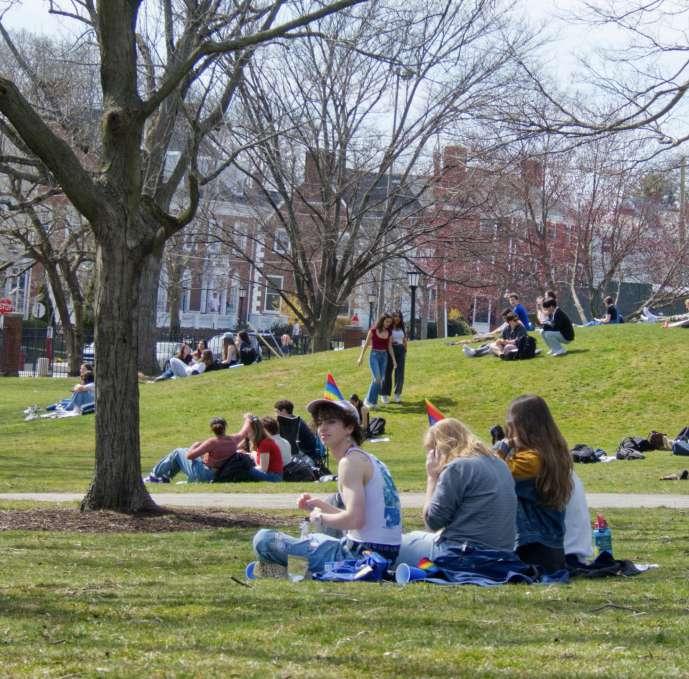

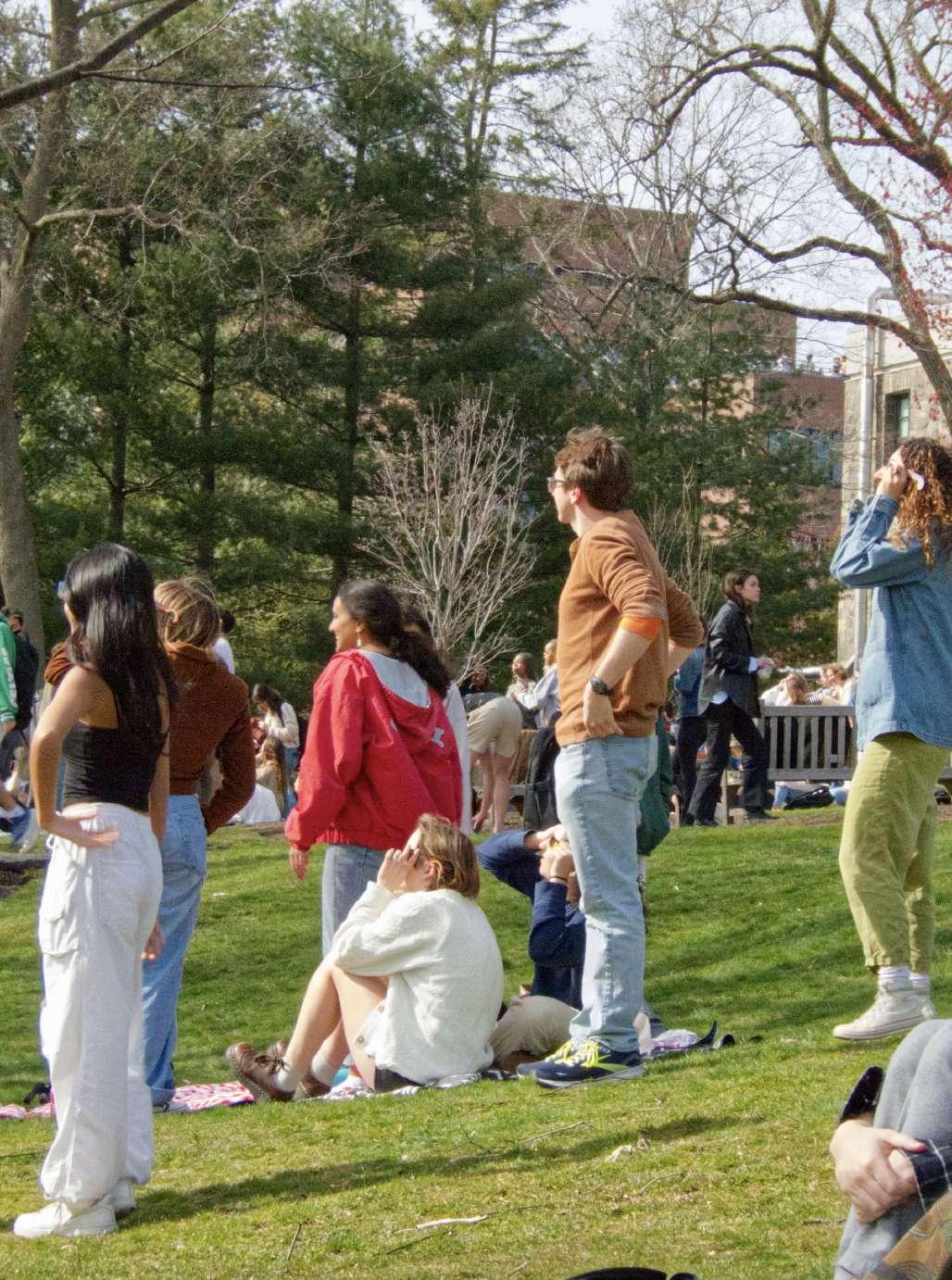



PHOTOS 32 SUNday, May 19, 2024 THE TUFTS DAILY
IN PHOTOS: CAMPUS LANDMARKS
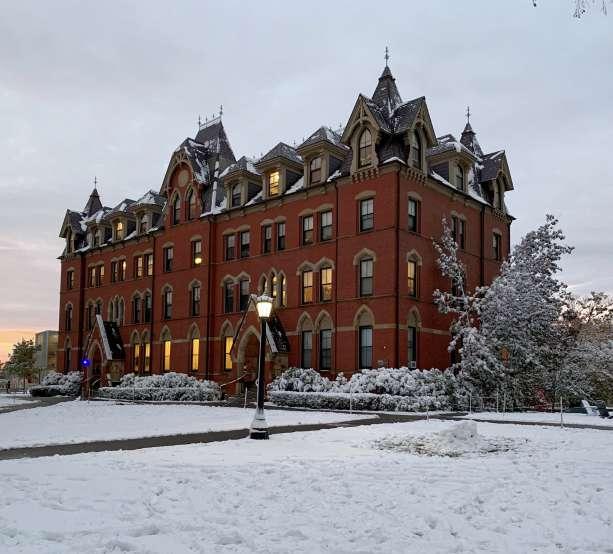
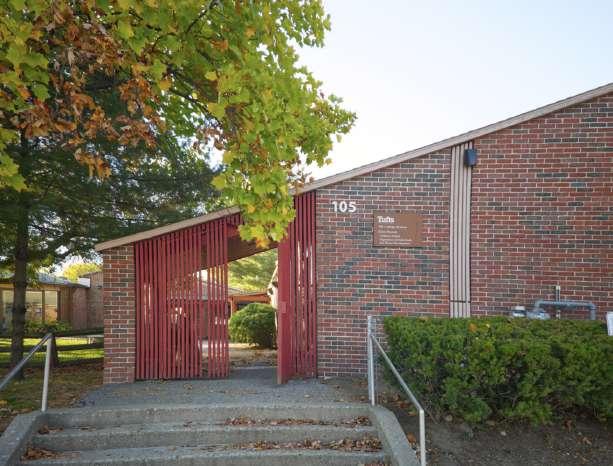



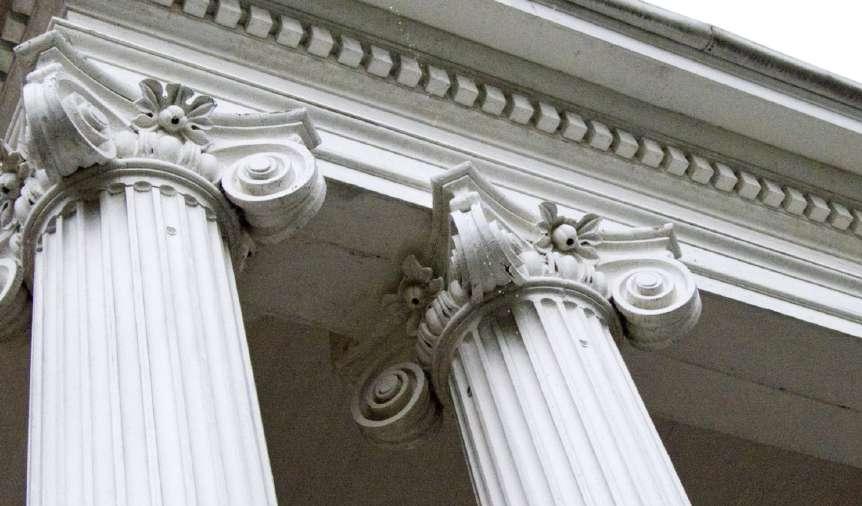

PHOTOS 33 Sunday, May 19, 2024 THE TUFTS DAILY
VERONIKA COYLE · RACHEL LIU ARI NAVETTA
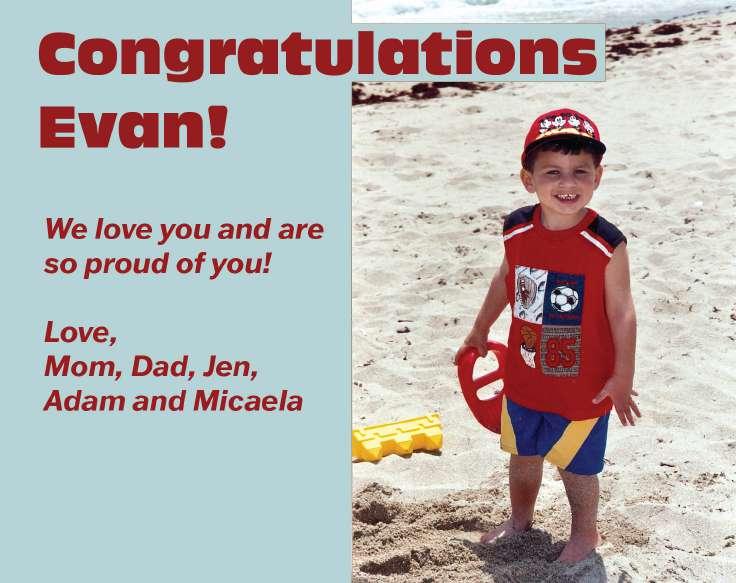

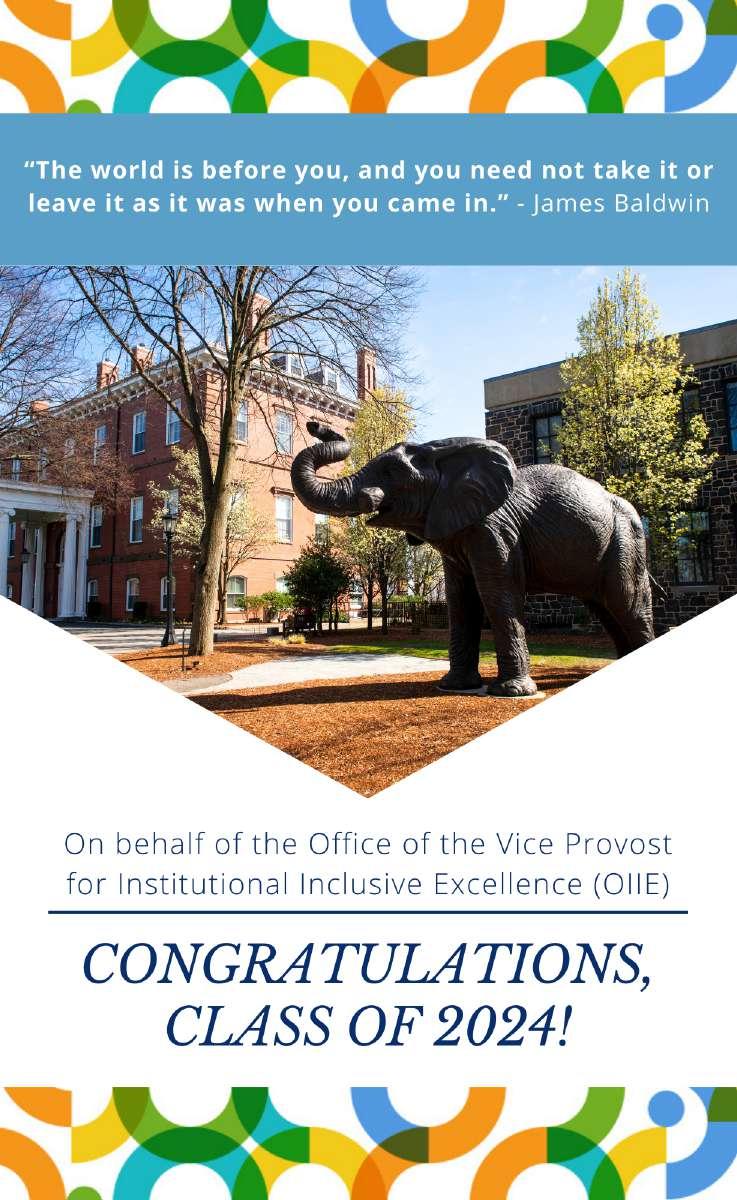

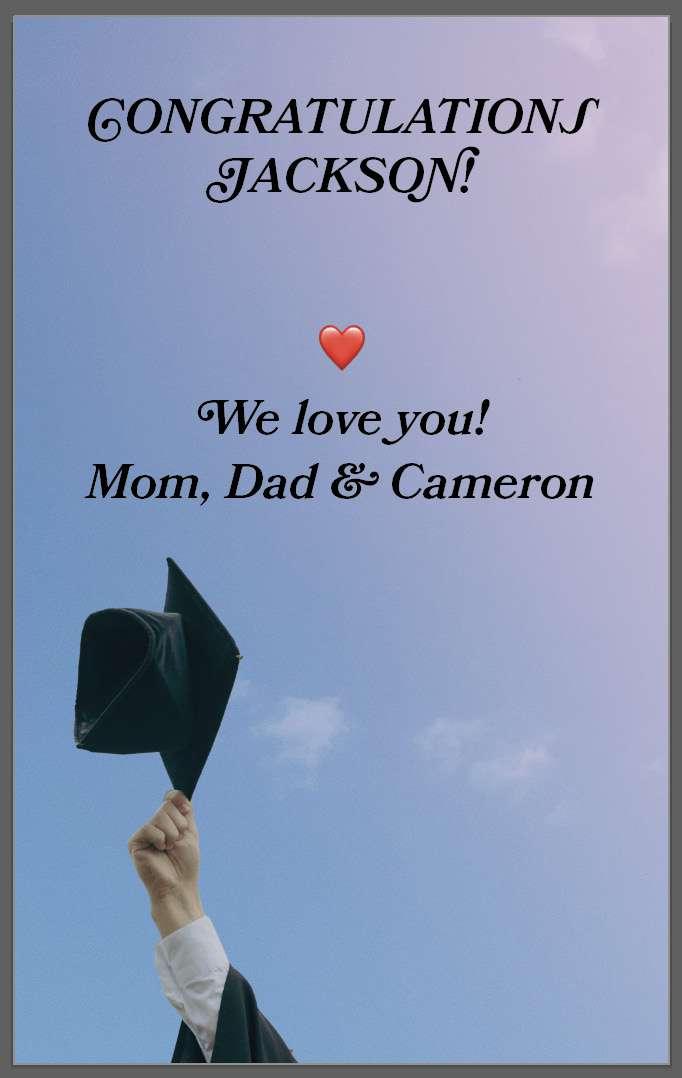
Senior Profile: Copy executive Natalie Bricker looks back on her Daily journey
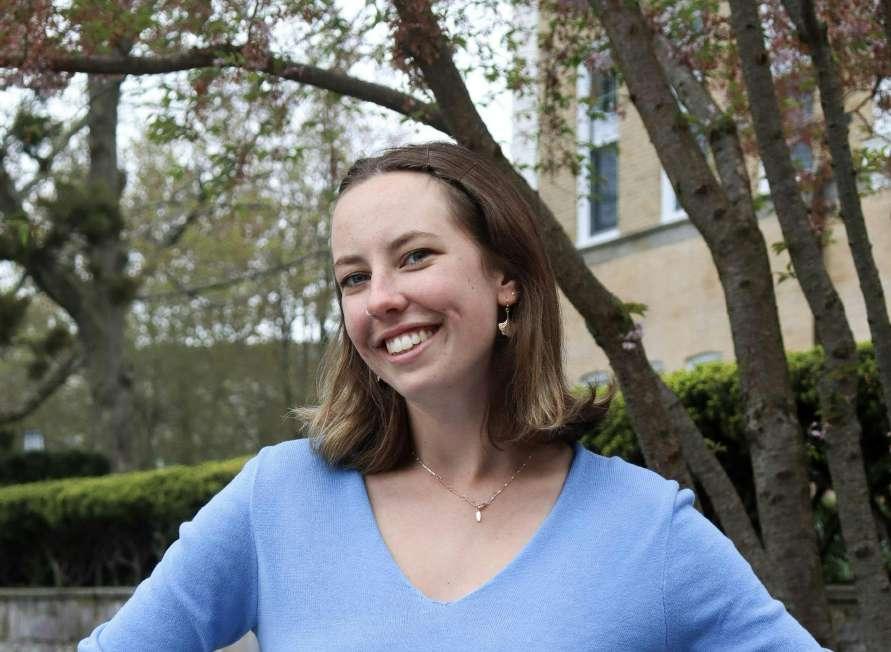
Editor’s note: The Daily’s editorial department acknowledges that this article is premised on a conflict of interest. This article is a special feature for Commencement 2024 that does not represent the Daily’s standard journalistic practices.
natalie Bricker had an untraditional journey to Tufts university, transferring from the university of Michigan at the start of her junior year. at Michigan, Bricker was a copy editor and wrote for The Michigan daily, skills she would bring to The Tufts daily as both a writer and current executive copy editor.
“I joined just as a copy editor at first for The Tufts daily and then decided to write a little bit of arts,” Bricker said. “Then I decided to write my first column, which was coffee shop reviews last year.”
Her coffee shop column, “Caffeinated Commentary,” was a fun excuse to go visit a new coffee shop every week and a chance to review a variety of drinks. With this
experience, Bricker has discovered that she appreciates the opportunity to express her personal writing style.
“I’ve always liked writing things from my voice. … I kind of like adding my own flair,” Bricker said.
When asked about her favorite pieces she’s written, Bricker singled out her features article on this semester’s all-female managing board, which she’s “really proud of,” along with some arts reviews she’s written.
“My favorite fun thing I’ve written was the reneé rapp review,” Bricker said. “That was really fun for me to go through the whole album and review all the songs, but then also [review] the album as a whole.”
Outside of writing for the daily, Bricker spoke very highly of the daily’s community, specifically the daily office. If you are on the daily and haven’t been to the office, she insists you must stop by.
“I’ve met most of my best friends through the d aily, and I love being in the office,” Bricker said. “It’s such a fun, chaotic vibe.”
Being in the office copy editing two to four nights a week, sometimes until 2 a.m., Bricker holds fond memories of her fellow daily members.
“It’s like sleepover vibes, where you’re all just delirious and everything’s funny,” Bricker said. “But
Tufts senior thesis debuts at Boston film festival
WALLACE continued from page 29
the crew was piling in, and I’m like, ‘I do not know what I’m doing.’ But after the first few takes, that immediately went away. I had a really good crew, which helped make everything go smoothly.”
Finding a good crew and community through the film department has been a highlight of Wallace’s time at Tufts.
“The thing I love about the Tufts film department is that we’re so small, so pretty much
that same pool of people is on everyone’s shoots,” Wallace reflected. “It’s like a mini Tufts family. It’s great. and I don’t think you could get that at a more competitive, larger school.”
The familial and collaborative part of filmmaking is what makes it special for Wallace.
“I don’t think I would’ve been in film if it was a solo endeavor.
The collaboration is my favorite part about it,” Wallace said.
“With film … you have to rely on different people for different things to make the final image.
and so if you’re not collaborative, don’t be in film. But it is my favorite part about it, definitely.”
l ooking forward, Wallace is currently making different cuts of “Citizens of Kattaquam” to run in festivals. The first screening will be a shortened version that played on May 4, a cosmically fitting day for a massive Star Wars fan, at 1 p.m. in Somerville Theater as part of the 21st Independent Film Festival Boston. a fter these festivals wrap up, his next goal is to create another short film,
K-pop dance group graduates four seniors
CENTER continued from page 30
With a growing community, Ko da’s board members have striven to keep the club accessible and connected. The club has been a hub of connections and friendships for all members.
“I have met some of my closest friends through Ko da ,” lu wrote in an email to the daily.
Ko da has also given something significant back to its members: a set of skills necessary for the post-graduation world. Seniors Julia a ndrews and Blane Zhu also reflected on their experiences with project management, leadership and personal growth.
andrews, who joined Koda during her sophomore year before becoming the club’s co-graphics chair, highlighted the skills she gained as a leader in the club.
“I really got so much more confident by … needing to be assertive,” andrews said. as the club’s senior members, this quartet has had to learn how to resolve tensions and problems that pop up in the club. Zhu, who has also served on Koda’s board, reflected on the process of coordinating projects.
“I learned a lot about all [the] different aspects of how to really coordinate a project and how to bounce things back between e-board members,” Zhu said.
The leadership and communication skills the four seniors have learned in Ko da have become new tools for them to add to their belts as they head into the post-graduate world.
The club also values its accessibility to new dancers, as they always are encouraging people
from all backgrounds and experience levels to join. Zhu reflected on his initial decision to join.
“I can’t say I’ve been super dedicated to K-pop. I’m more of a casual listener than anything, … but I feel like [Koda] was more accessible than other dance groups.” Zhu said.
Ko da , unlike many other Tufts performance groups, is an open club, free of auditions. Their group performances require an audition and selection process, but anyone is welcome to join the club and attend social gatherings. This balance of accessibility and performance selection has allowed the members to freely join in on rehearsals and practices while also learning valuable life skills.
Several of Koda’s graduating seniors also shared that dance
we’re making a paper that people are going to read.”
as a transfer student, Bricker understands that the change can be intimidating, which is why outside of the daily she also writes a blog for Tufts undergraduate admissions.
“I felt so clueless coming in as a transfer, so I just want to spread all the knowledge I can about that,” Bricker said.
Her advice to transfer students and new students? do not be afraid to put yourself out there and make the ‘scary’ choice.
“If you’re nervous, everyone else is too. and someone’s going to be overjoyed if you reach out to them, even if it feels a little nerve-wracking,” Bricker said.
“It’s worth shooting your shot with new friends and new clubs, and just doing all the things and seeing what sticks.” reflecting on her experience at Tufts and college as a whole, Bricker makes it clear that transferring was a good decision for her.
“I’m super, super thankful that I transferred, even though it was hard and scary,” Bricker said.
Graduating and entering the ‘real world’ is intimidating, but in saying goodbye to Tufts, Bricker’s simple words are likely ones that resonate with seniors across campus.
“I’m going to miss it a lot,” she said.
albeit on a much smaller scale, to add to his portfolio.
l ong term, Wallace dreams of becoming a writer and director and hopes to return one day to the world he established in “Citizens of Kattaquam.”
“It’s part of a larger world I want to build in the future,” Wallace said. “I’m hoping that I can get the gang back together to shoot another installment at some point. d on’t know when — that could be a year from now, could be five years, 10 years from now.”
will still be a part of their lives after graduation.
“I will definitely continue to have dance in my life,” Zhu said.
Koda, which began as an offshoot of the Tufts Korean Students association, now puts on several live performances throughout the year and uploads videos on their youTube channel. While their semesterly showcases can be a time of stress, it is also a time of joy for the club’s members.
“There’s also the huge triumphant feeling when we’ve finished an entire [choreography] and finished the formations,” Wilson said.
For many, Koda is a place for students to express themselves through dance or delve deeper into the art. For others, it’s a place to bond over K-pop and a shared musical interest. regardless of
The idea of bringing “the gang back together” marks a key value for him. While leaving college and trying to break into the competitive entertainment industry is daunting, for Wallace, all it takes is remaining true to the community he built while at Tufts.
“My close film friends, we have this running thing where it’s like, all it takes is one of us to make it big,” Wallace concluded. “Once one of us gets in there, then we sort of drag everyone up with us. So I hope that’s the case.”
why they came, Koda has proven to be a community of love and joy for every member.
“I hope that the club can continue to foster the passion of its members,” lu wrote.
as the current seniors move on from Tufts, they continue to hold fond memories of the close bonds they’ve created within the club.
“They all call me ‘mother.’ Tracy [and I] are the ‘mothers’ in Koda. … I have really strong feelings of wanting to protect [the club] and cultivate everyone’s experience,” Wilson said.
It is clear that even as Wilson, lu, Zhu and a ndrews graduate, Ko da will continue to hold true to their love for their community.
“The more you get involved with it, the more it feels like a family,” Zhu said.
arTS & POP CulTure 35 Sunday, May 19, 2024 THE TUFTS DAILY
VERONIKA COYLE / THE TUFTS DAILY
Natalie Bricker is pictured on May 1.
Ryan Fairfield Arts Editor
Senior Profile: Maeve Hagerty discusses Daily tenure, campus arts scene
Nate Hall Executive Arts Editor
Editor’s note: The Daily’s editorial department acknowledges that this article is premised on a conflict of interest. This article is a special feature for Commencement 2024 that does not represent the Daily’s standard journalistic practices.
a former executive arts editor of the daily, senior Maeve Hagerty sat down with current executive arts editor nate Hall to discuss Hagerty’s experiences with the daily and reflect on her four years at Tufts. Hagerty, who grew up in Bethesda, Md., is a history and political science major with a minor in english. Hagerty has been writing for the daily since her first semester at Tufts in fall of 2020.
Hagerty reflected on how she ended up joining the daily as a first-year.
“When I came in freshman year, I wanted to be an english major, so I knew I wanted to get involved with the writing scene on campus,” Hagerty said. “I met Megan [Szostak], who was … at that point the arts exec, and she recommended that I join the daily.”
Hagerty immediately bonded with Szostak, who also took history classes and played viola in the Tufts Symphony Orchestra. With Szostak’s encouragement, she became more involved in the daily. although the daily operated virtually during her freshman
year, Hagerty still felt like a part of the community.
“It was one of the few campus organizations that was really still functioning, even though it was all remote,” Hagerty said. “I started off by writing a column my first semester — it was all about music — and then my second semester I became an assistant editor, and I started writing more articles, and I worked my way up.”
as a first-year, Hagerty wrote “Maeve’s Music Mondays,” a column that explored trends in the world of music, but she quickly branched out into album reviews, television think pieces and on-campus stories. after spending two semesters as an editor, Hagerty served as executive arts editor during the spring of her sophomore year. Hagerty described her experience as an arts executive, sharing the highlights and challenges of the position.
“It was an amazing experience. It was probably the hardest position I’ve ever held, partly because of the time commitment,” Hagerty said. “also feeling like you’re carrying the weight of the daily on your shoulders is a little bit intimidating. But that also came with a flipside of feeling a lot of pride in the work that you’re doing. … It’s a very nice feeling to see all of that come to be.”
Hagerty describes the closeknit community she found in the daily during her sophomore year.
“There were a lot of people in the section my soph -
omore year who I’m actually still friends with outside of the daily,” Hagerty said. “So I think that especially within my own section, it was a really nice way to meet people but also just to interact with people I would not normally have met otherwise.”
Outside of the daily, Hagerty has kept busy at Tufts. She is the principal violist in the Tufts Symphony and Chamber Orchestra and has participated in theater department productions as a stage manager. She is also a Sex Health representative, a Point Writing Fellow for the
Staar center and the 2022 recipient of the english department’s Morse Hamilton Fiction Prize. She spent her junior year abroad at the university of Oxford and will be returning to Oxford in the fall to research modern British history, a topic that she explored in her senior thesis.
Of the 30-plus articles she’s written for the arts section, Hagerty singled out a few of her favorites, including interviews with singers ella Jane and Veronica Stewart-Frommer of Melt, both of whom attended Tufts, and a breaking news arti-
cle announcing the Spring Fling lineup in 2022. reflecting on her own experience, Hagerty encouraged younger arts writers to be proactive and cover as many on-campus and local events as possible.
“you should definitely keep an eye on those things, because some of them end up being your favorite things to write about,” Hagerty said.
Hagerty’s commitment to the daily and the arts scene on campus is admirable, and aspiring arts writers can look to her as a model for their own journeys at Tufts.
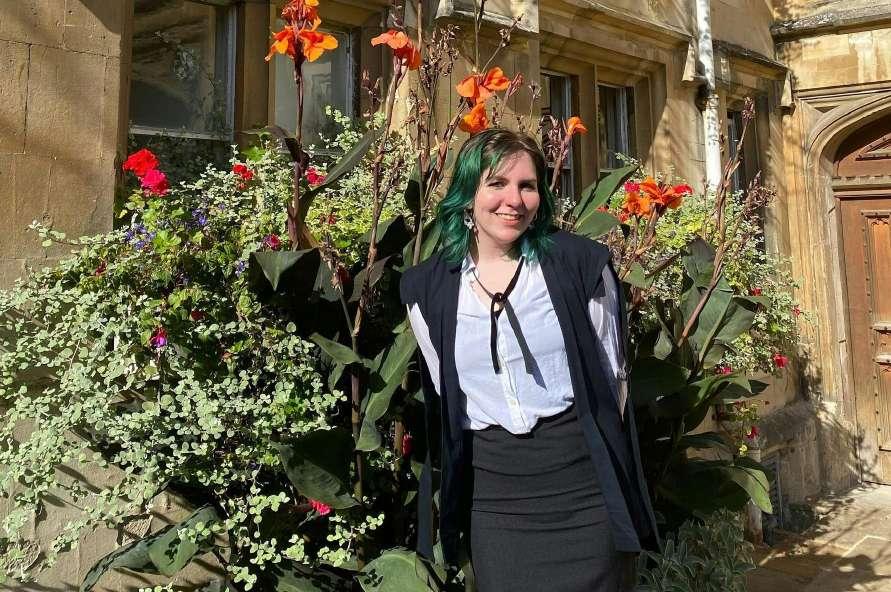
Tasha Oren on the past, present and future of film and media studies at Tufts
Annika Pillai Assistant Arts Editor
This year, 49 students are graduating from Tufts with a degree in film and media studies — 36 with a major and 13 with a minor. What is currently the largest humanities program at Tufts, interestingly, didn’t even exist 10 years ago. Branching off from a communications minor, the program was created due to a high interest in the sphere of film and media. In its first year, FMS only had six students. now, it has over 170.
“We feel [it] is our strength that we have students who are much more well-rounded,” Tasha Oren, associate professor and director of the Film and Media Studies Program, said in an interview with the d aily. Oren expanded on this,
noting that the program differs from several other institutions in that it offers an education in film and media studies within a liberal arts context. In the program, students not only learn how to make films and television but they are also taught media literacy. They learn about the history and theory behind films, as well as the cultural impact of media. Though the major is flexible, it requires that students take at least one class in theory, social science, practice and non- u .S. film and media. In this way, students gain exposure to various aspects of the industry.
FMS is still developing, however. “We’ve got more and more people who are joining us and teaching more courses,” Oren said. “We hope that we will grow even more.”
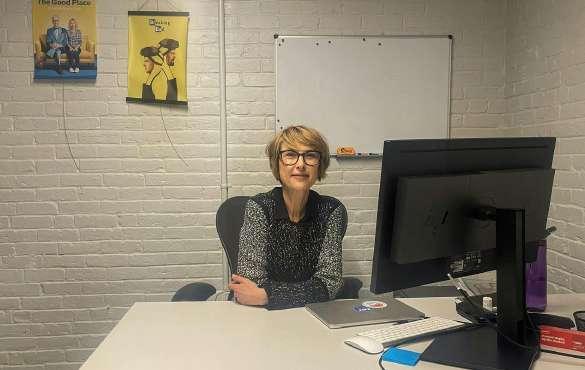
In the last few years, the program has expanded steadily. new faculty have been hired, including d enise Cummings, who specializes in Indigenous media and film, and Tufts alumnus Mat r appaport ( la’94), who specializes in media art. Cummings has created connections with the Somerville Theatre so that students can view films there, fostering a relationship between Tufts students and the extended community. In the fall, rappaport will be teaching a class on the media industry’s use of artificial intelligence.
“We want to make sure that we’re always teaching in a media universe that reflects what is out there,” Oren said. “We’re always trying to make sure that we’re giving students tools that are relevant to the world that they live in.”
The media landscape is ever evolving; one of the more sizable changes at the moment is the departure from mass media. With the growth of various streaming platforms and a rise in self-produced content, audiences are increasingly fragmented. Ten years ago, this may not have been an issue; now, students need to be trained to navigate such an environment. The program’s central goal is to supply students with skills that are useful to society; as the media
environment develops and changes, the program will shift accordingly.
Beyond this, the program also prepares graduates for a career outside of university. according to Oren, over one-third of graduates work in media industries. Perhaps most unique to the department is its own in-house internship administrator, leslie Goldberg, whose role is rare among academic departments on campus. Goldberg’s only job is to connect with students and help them find opportunities outside of Tufts. One of these opportunities may be through a Winternship — a program offered by FMS that supplies students with a three-week long winter internship opportunity.
“They are interns between the Christmas break and the new semester, and they get real, practical experience,” Oren said. “People actually end up in positions, either in those same companies or within the same kind of environment that they’ve interned with.” The department also assists in navigating the opportunity to ensure that students are able to get the most out of such a short experience. after graduating, the doors are wide open for FMS students; several go off to work directly within the industry, while others pursue additional schooling.
“We’ve got people who are in Hollywood … in filmmaking
and television making ... production and in talent agencies,” Oren said. Some students even go off to pursue careers in entertainment law — the options are endless. But how are graduates in this department so successful? What exactly does the FMS program provide?
“[We teach a way] of thinking a lot more than tools,” Oren responded. “What we’re trying to instill in students is a habit of mind, an ability to look at something and say, ‘I can understand it because I know the history of it … [and] because I understand the ways that critics and philosophers and writers and scholars have thought about it.’”
Oren expanded on this, noting that education in film is multidimensional; skills are only so useful to the current environment. a s technology advances, these skills will need to be developed as well — and that can only happen through understanding the historical and aesthetic background.
“When you come out with a Tufts education … you’re in the position to make your own job, create a job that doesn’t exist,” Oren said in reference to this year’s graduates. “The most important skill that Tufts students are learning is how to envision [their] own contribution that nobody has ever had before.”
arTS & POP CulTure 36 Sunday, May 19, 2024 THE TUFTS DAILY
COURTESY MAEVE HAGERTY
Maeve Hagerty is pictured at the University of Oxford.
MICHELLE SHIU / THE TUFTS DAILY
Professor Tasha Oren is pictured in her office on April 18.
Senior Profile: RaiAnn Bu on finding joy in the arts
Ishaan Rajiv Rajabali Deputy Arts Editor
Editor’s note: The Daily’s editorial department acknowledges that this article is premised on a conflict of interest. This article is a special feature for Commencement 2024 that does not represent the Daily’s standard journalistic practices.
“In high school, I had two friends who were the heads of the newspaper and they would not shut up about it. I became very anti-newspaper,” raiann Bu said — a surprising revelation for someone who has written for the daily since her sophomore year.
Bu is from Southborough, Mass., and bravely refused to let her misgivings about student publications hold her back when it came to the daily. She credits her friend, Jack Clohisy, who served as executive arts editor in fall 2022, with convincing her to join.
“[The daily] seemed chill,” Bu said. “I think I wrote two or three articles my first semester, mainly focusing on fashion. … after that, I applied to be an assistant arts
editor and I was a nice little cog — I did my editing, and I moved up.”
after joining the arts section in fall 2021, Bu quickly became more involved in the daily.
“I worked on a column, which is long gone, but it was a good challenge,” Bu said. “I tried to come up with something to write every week. ... It was something to put creative energy into.”
Bu’s column, “Micro-Trend of the Week,” explored various phenomena in the fashion world and was published in spring 2022.
Bu expressed her appreciation for the community and discussion that the arts section offered her.
“It’s a really fun way for students to get out of the traditional academic backgrounds,” she said. “It’s really easy to bond with anyone from the arts section because you guys all have the same pop culture knowledge and can bounce off each other about that.”
One of Bu’s highlights during her tenure with the arts section was being able to attend a press screening of the endearingly campy horror film “M3Gan” (2022).
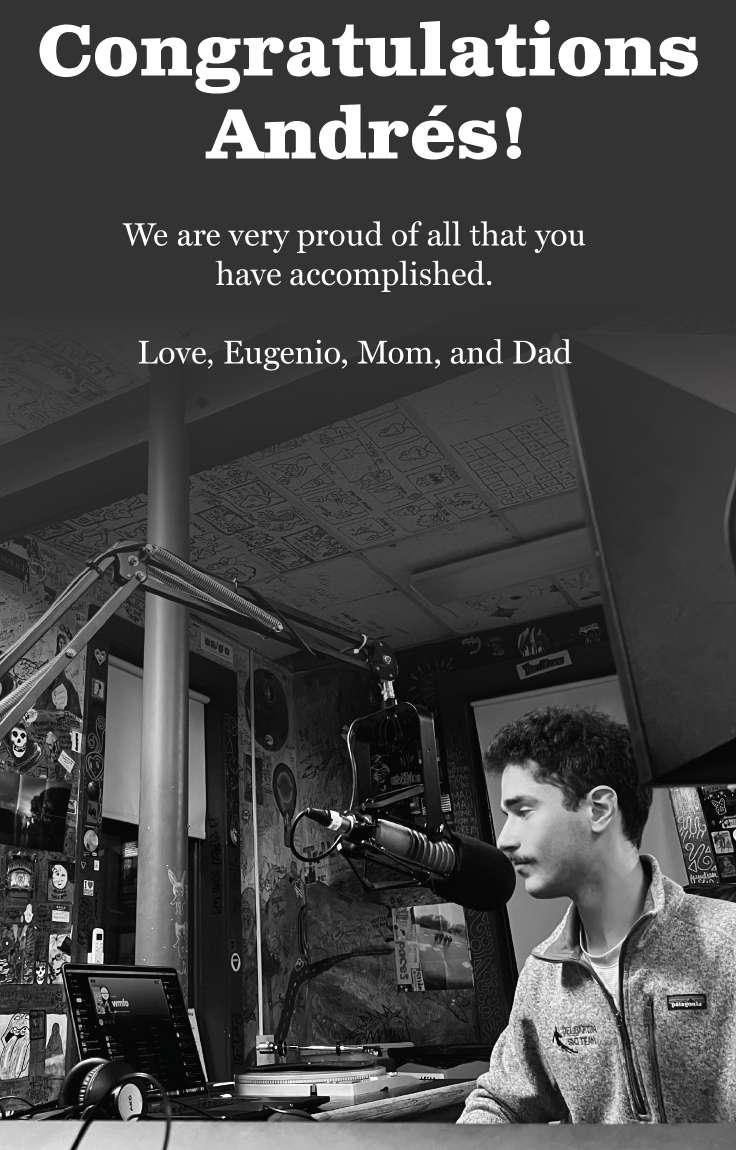


“I was a big fan of the trailer, ... and because of the daily, we got to attend a free first screening,” she relayed. “and so, the semester after, I did a [Tufts dance Collective dance] called ’M3Gan Thee Stallion,’ inspired by the robot.”
Bu underscored her editorial role at the daily as her most meaningful contribution to the paper.
“I tried to make sure that my articles are finished, and tried to make sure that
I’m [fact-checking articles] correctly,” she explained.
“I think I had pretty creative beats [as well],” Bu said, recalling her reinvigoration of the arts section’s fashion coverage.
“I’m very blessed to have a last name early in the alphabet … because then I get higher on the masthead,” Bu joked. “even though I have the same title as everyone else.”
Kenneth Tam exhibit explores immigration, masculinity
TAM continued from page 30
The two-channel video, “Silent Spikes,” was originally commissioned by the Queens Museum with support from the asian art Circle of the Guggenheim Museum. The video includes images and archival footage of cowboys, as well as visual and narrative references to the labor strike organized by the Chinese laborers in 1867. Interspersed throughout the video is contemporary footage of the choreographed, as well as free, movements of Tam’s performers. By putting into conversation footage of cowboys, 19th century Chinese laborers and contemporary dance, the film demands attention to be paid to the moral complexities of american history, while also serving as a meditation on identity and media.
In addition to the two-channel video are sculptures that invoke the struggle and perseverance of 19th century Chinese laborers in the u.S., most notably Tam’s sculptures of enlarged Imperial Chinese coins. laborers often carried such coins in their pockets for fortune. embedded into the material of the sculptures are perishable foodstuffs and portions of refuse, earthenware and jewelry. Several pieces of the embedded material were collected from the actual sites of the migrant worker camps, invoking the identity and lives of these nameless workers through the items and pieces that they left behind.
The exhibition’s second installation, “The Founding of the World,” made its museum debut at the Berkeley art Museum and Pacific Film archive in 2023. The installation incorporates Tam’s research into the history of fra-
ternities and Greek culture, particularly the practice of the probate: an induction ritual in certain asian american college fraternities. Consisting of video and sculpture, the installation explores the role of ritual, excess and masculine identity. Of interest to Tam is how the coercive ritual of the probate attempts to facilitate group cohesion, yet ironically undermines these group bonds. In the end, such contradictions and rituals ultimately damage the relationships that many young asian american men have with their own identities.
The video features a group of young asian men performing a series of ritualized gestures meant to evoke those actually practiced by fraternities. a recording of a composition by vocalist yuniya edi kwon plays in the background, and the physical space of the gallery itself is ornamented with empty bottles of alcohol and cologne suspended from the ceiling. In addition to these suspended objects are wall structures, piles of hoodies and varsity jackets cast in sculpting resin, vaguely resembling the physical shape of a coat of arms, ritual tablets and other heraldic symbols. Simultaneously, they appear clumsy, as though haphazardly tossed onto the floor in a pile. While there is an air of tongue-in-cheek humor to this installation, the cologne, liquor bottles and red attire engage the vernacular of a derivative and violent male identity.
Kenneth Tam’s “Standing in Soft Formation” is a meditation on intimacy and masculinity; privacy and performance; a pulling together of disparate images and ideas across media to say something more about what it means to be human today.
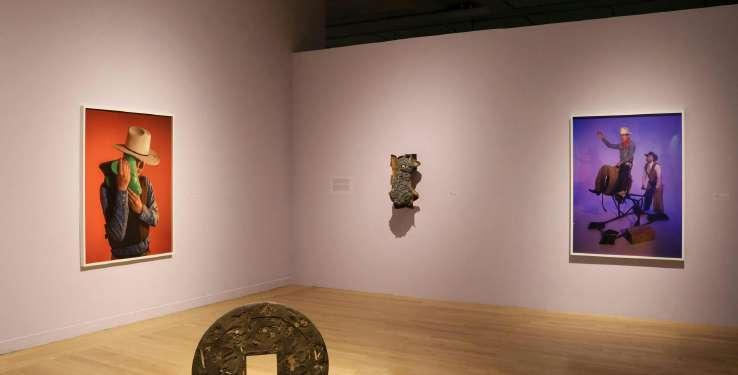
arTS & POP CulTure 37 Sunday, May 19, 2024 THE TUFTS DAILY
COURTESY RAIANN BU
RaiAnn Bu is pictured.
CHARLENE TSAI / THE TUFTS DAILY
Tufts University Art Galleries welcomed Kenneth Tam’s “Standing in Soft Formation” in spring 2024.
With the surplus of time on our hands during final exams, the daily’s editorial Board sat down to dream up a list of small changes that could upgrade the Medford/ Somerville campus. From facilities to dining to technology, these improvements seek to improve various aspects of student life.
as college students, a significant portion of our daily lives revolves around schoolwork. Whether studying for an exam, completing classwork or working on a group project, we need adequate facilities to support our academic endeavors. Tufts boasts an impressive number of gathering spaces on the Medford/ Somerville campus, including three libraries, the Mayer Campus Center and a myriad of academic buildings where students can study. However, all of these spaces would benefit from an increase in alternative seating options such as yoga ball chairs, wobble stools, bean bags and rocking chairs.
Tisch library already has a sensory room available to reserve; an expansion of this initiative to more library spaces would be beneficial.
Since its 2017 opening, the Science and engineering Complex
EDITORIAL
Tufts’ summer glow up
has been a fan-favorite study spot. The building’s popularity among students is unfortunately also the space’s shortcoming as finding a good table is difficult. The plethora of round tables in the SeC atrium, while occasionally useful for group projects, often leads to the one person taking up a table meant for many, even when the building is packed. The addition of more two-person tables could remedy this problem.
Imagine you finally do find a table in the SeC or Campus Center, only to find your laptop is nearly out of battery. The odds of your table being near a power outlet are slim to none, and you would have to relocate. The SeC and Campus Center desperately need more working outlets. also, adding window shades downstairs in the Campus Center would reduce glare on computer screens and lower the temperature when the sun is shining. We further support the Tufts Community union Senate initiative to extend late-night study hours in the Joyce Cummings Center. although Tufts dining seems to be an endless source of student complaints, it truly is not that bad. However, it could be even better! Firstly, Kindlevan Café should bring back the old sandwiches,
such as the beloved apple brie and caprese. The new Kindlevan paninis are too soggy, likely because they are wrapped in foil and rely on very thin slices of bread to protect against moisture. Tufts dining could also start serving oat milk in Kindlevan, as it is now the second most popular plant-based milk in the u.S. behind almond. apart from Kindlevan, Hodgdon Food-on-the-run should stop giving receipts. The receipts do nothing but accumulate in the Hodge trash can and are simply a waste of paper and ink.
Tufts needs more community fridges, like the one behind dewickMacPhie dining Hall. It seems reasonable that each dining location could have a community fridge, which would help students responsibly give away food they don’t need and work to address food insecurity in Medford/Somerville.
as you trek around campus, you may find yourself taking dirt paths where repeated footsteps have worn down a ghost of a trail in the grass, called “desire paths” — or more fittingly at Tufts, ”elephant paths.” Tufts should pave the shortcut behind latin Way on the walk to davis Square and install stairs on the hillside down to The Court at Professors row.
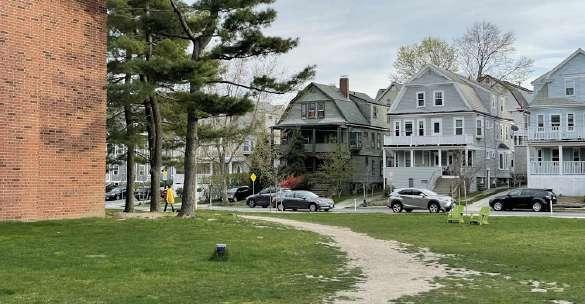
The College avenue/Boston avenue intersection is one of the most congested spots between class blocks, especially in front of the Memorial Steps. It’s like a highway feeding into a two-lane road. Waiting for the walk signal as floods of computer science and economics students pour out of the JCC means balancing precariously on the curb as vehicles speed by. For pedestrian safety, the sidewalk in front of the Memorial Steps should be widened.
Students should be able to load MBTa fares onto Tufts Id cards. Harvard university and Massachusetts Institute of Technology Id holders can tap into the T without carrying around a separate Charlie Card. Given that
Reevaluating course registration transparency
many Tufts students commute to the School of the Museum of Fine arts and downtown Boston campus via the new Green line station, this feature would see widespread use.
In addition to physical Id cards, Tufts should have digital Ids to swipe into dining halls and dorms. While it’s easy to lose a card, students rarely leave the room without their phones. northeastern university and MIT have their own mobile Id apps, and universities across the nation are moving to add digital credentials.
While none of these changes make or break the Tufts experience — as graduating seniors can attest to surviving without them — the editorial Board hopes to spark interest in implementing these touch-ups.
as most Tufts undergraduates can attest to, the registration process is not exactly a smooth one. Students prepare themselves days in advance; trying to ascertain as much information as possible about their options, they meet with their advisers, check rate My Professors, read the short
bios of each class on the Student Information System and then choose their classes. On the day of registration, they watch as their classes slowly but surely fill up, and finally, during their allotted time slot, they pick from what classes are left.
This process is done somewhat blindly. Students must rely on the little information provided on SIS
about a specific class or on friends who have taken it already. They may turn to rate My Professors, which offers ratings and reviews about a professor from past students. However, these reviews are made by students on opposite ends of the spectrum. Students who leave reviews typically write that they either loved or hated the professor, which is what compels

them to leave the review in the first place. This makes the data found on rate My Professors largely unreliable and an inaccurate characterization of a particular professor or class. For an important decision like choosing classes, it is alarming that rate My Professors is currently the only way that students can find student opinions about a professor.
But, if given the proper resources, we as students wouldn’t have to rely on capricious rate My Professors reviews. Most Tufts undergraduates fill out course evaluations at the end of every semester. These evaluations measure student attitudes toward the use of class time, the level of engagement of a class, the instructor’s organization and even the level of inclusivity achieved in a class, to name a few. These ratings and reviews are more comprehensive than the simple five-star rating and comment system offered by rate My Professors. additionally, the vast difference in sample size between course evaluations and rate My Professors reviews makes course evaluations the superior and most statistically accurate form of rating and information.
So why do we have to continue to use the often inaccurate rate My Professors website? Tufts should give students access to all evaluation results to empower them to make an informed decision about the classes for which they want to register. This model, one of full transparency, has precedent at other elite universities. yale university, for example, has the Online Course
evaluation Student Viewer application, which allows students to view previous course evaluation results. These results are accessible through the yale Student Self Service, preserving security while still prioritizing full transparency. This is a system that Tufts easily could — and should — employ. Currently, students cannot make informed decisions about the important, future-altering decision that is choosing their courses, and Tufts needs to make this easy fix.
another easy solution to maintain transparency in the registration process is giving students access to syllabi before they register. Students should be able to see the roadmap of the curriculum that a syllabus provides, both to decide whether they want to take that particular course and to plan their semester accordingly. This, again, has already been implemented at other universities. The Ohio State university, for example, has the Syllabus Search site in which students can view syllabi for prospective courses. The syllabi on this site can be seen by anyone, but Tufts could implement a site behind a login page for more security. Providing syllabi prior to class registration would be an important step to increasing registration transparency at Tufts.
The registration process at Tufts is already chaotic without the added stress of not being fully informed about the classes. With some manageable changes, Tufts has the opportunity to provide more transparency and clarity to this process.
edITOrIal 38 Sunday, May 19, 2024 THe TuFTS daIly
RACHEL LIU / THE TUFTS DAILY
Students browse the course offerings in the SIS catalog.
RACHEL LIU / THE TUFTS DAILY
The “elephant path” behind Latin Way is pictured.
by The Editorial Board
by The Editorial Board
Toby Winick Executive Opinion Editor
at the end of this year, I decided to sit down with the Opinion section’s three departing seniors to profile each in a single article — condensed to save time, I thought. While I learned a lot about each senior, their time at Tufts and the daily in our group interview, what happened in between our lines of questioning was ultimately much more valuable.
Peppered between serious and genuinely impactful answers were jokes, references, sidebars and quite a few silly facial expressions. as an interviewer who scheduled this right before his lunchtime, one might imagine that a drawn out meeting might be frustrating. But in the end, I don’t think that I could’ve painted this portrait of the Opinion section without it — I wish I had asked more questions.
Of course, it is important to understand each of the section’s seniors and their unique stories. reya Kumar, who was executive opinion editor in fall 2022, has been in the section “forever.” She joined in spring 2021, her second semester of university, amid COVId-19 lockdowns and has remained involved in some way since then; she is now in her second semester as a deputy editor.
OpInIOn
VIEWPOINT
A profile of the Opinion section, via its seniors
Though her consistency is admirable, her story is far from conventional: She joked that you can still read the direct messages on Instagram she sent to the daily’s Instagram account as a result of not being placed on an email list.
Kevin Golub, currently an opinion editor, was more of a “late bloomer,” as he quipped, beginning with writing op-eds during the spring semester of his junior year. He then joined the section as a staff writer upon returning to Tufts, contributing “a fair amount” of articles — a comment that prompted a good laugh from the rest of the room considering his accumulation of nearly 30 bylines in his one year as a staff writer.
like Golub, Justin Hong, a current deputy editor, also joined the section relatively late, with his first semester as a staff writer being his junior spring. Similarly, his involvement began with submitting an op-ed about a bill that died in the Massachusetts State House. Following this, his work has focused on mostly Tufts and Massachusetts issues because in his words, “Joe Biden does not read The Tufts daily.” In other words, he believes it is best to appeal to those in the daily’s audience that have the power to make change. He relented, though, that California Gov. Gavin newsom does read the
daily, reflecting a satirical letter to the editor Hong wrote for the daily’s april Fools’ edition.
Still, despite the differences of our seniors, their involvement and their goals as writers, each has reflected on how important the Opinion section has been to them, demonstrating the section’s ability to unify. Ironically, the section with some of the most contentious articles has created some of the closest bonds. all commented on the impact of COVId-19 on their Tufts experiences and expressed gratitude for the community that the section has made.
“We have in the section a builtin sounding board,” said Kumar, referencing the frequent and often intense discussion on opinion articles in section meetings.
The Opinion section has provided a welcome environment for writers of, well, all opinions. Golub stated, “While I am a minority voice … I have found my time super rewarding and made a ton of friends despite most of them having different political views to mine. … The fact that we can go each day debating but also being friends and having civil discussions is a key reason why I stay in the daily.”
Moreover, both Kumar and Hong remarked on how the section’s community has pro-
VIEWPOINT
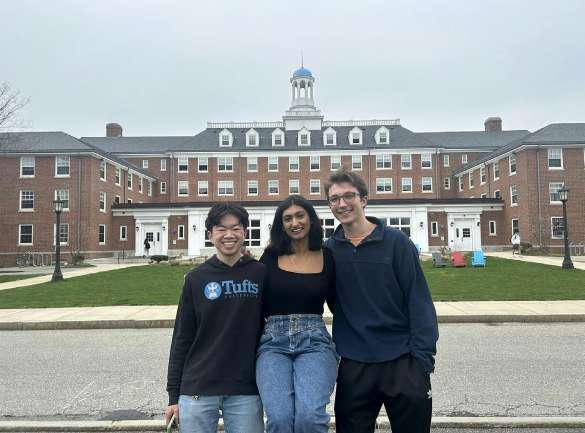
gressed throughout their time in the daily. Hong elaborated that in his first semester in the daily, meetings were usually over in 10 minutes, and there was not really a sense of community. However, he has really enjoyed this semester because it has been so different, stating it is the first time he felt he was showing up to meetings because he wanted to even if he had nothing to write. Golub added that the daily this year has allowed for a “whole other side of [his] social life,” highlighting the “singular gathering location” of Kumar’s house where virtually every section bonding has been hosted (and in
Four years, one home
Reya Kumar Deputy Opinion Editor
When I arrived at Tufts in September 2020, I was alone, attempting to get my two large suitcases from Gantcher Field House to Tilton Hall. I didn’t recognize campus — when I toured in February 2019, a layer of barren, snow-covered trees created an entirely different landscape than the one I’d just arrived in. Stepping into the world for the first time amid a pandemic, leaving everything I knew on the other end of the country… it was a daunting prospect. a mom of another first-year student saw me struggling and ran over, offering to drive me to my dorm. We soon discovered that her son was living in the same building as me. This random act of kindness was my first interaction as a Tufts student, and proved to me that even when I thought I was alone, at Tufts, I never was. l ike the thousands of Jumbos that once walked these streets, this place became my home. I found home in Tilton Hall. With clubs and classes on Zoom, my new group of friends spent every day together: chatting, playing games, watching movies and eating
d ewick takeout. It was certainly not a typical first-year experience, but I made many cherished memories over that strange year. From helping my dear roommate e mma film her Sarabande auditions, to taking masked photos in the Boston Public Garden, to laughing over the questionable mashed potatoes we were given for Thanksgiving, to visiting the Museum of Fine a rts on our one-day spring break, to even playing Holi with my new friends — that year was filled with joyous moments that shielded us from the isolation of the pandemic around us. While we’re not all as close as we once were, a couple of these Tilton Hall friends are my current housemates, who have spent these four years with me. Mia and Meg, I love you endlessly.
I found home in the Tufts History Society. In my sophomore year, I branched out beyond my dorm, becoming THS’ secretary. I’d only participated in THS a few times on Zoom, but the former president, Phoebe — who was the first upperclassman to take me under her wing and offer academic and extracurricular guidance — convinced me to run. Three years later,
I have now served as president alongside Ilan, who has been by my side in the club throughout our years here. In THS, I found a group of people who love history as much as I do. This has manifested in our hilarious meetings, such as the meme bracket with which we finished off this year, but also in the THS executive board’s “drunk history” nights, group costumes based on BBC’s “Ghosts” and late-night “r asputin” Just d ance choreography. In THS, I found great friends as well as a supportive community with whom I’ve run a club, taken classes and written a thesis.
I found home in l ondon. Junior year brought study abroad, where I found a group of incredible people with a sense of adventure and curiosity to match mine, including new and old Tufts friends. I remember e lla meeting me with flowers when I arrived — we got a pint while I was still in my airport sweats. Meanwhile, Mirabelle and I found out we were flatmates because of the warnings we individually received about our flat’s fridge. a couple months later, we were running through the rain in Croatia. I even made friends from all over the world,
one of whom I’m visiting in Belgium this summer. From them, I learned about football (both a merican and British), beer and way more than I ever thought I’d know about the musical “Wicked.” I found such a beautiful collection of people abroad, that when I met my family at the airport I was still crying over us needing to go our separate ways.
I found home in The Tufts d aily. returning to Tufts my senior year, I became part of one last community. While I’d been in the daily since my firstyear spring, for me, it was a very professional setting for most of my time at Tufts. In the fall, I made my first real friend in the daily. Working on a piece about Tufts finances, Kevin and I became fast friends despite constantly debating our very different political beliefs. Since then, I’ve made many more friends in the daily, such as the other two parts of our opinion leadership triumvirate, Toby and Justin. I’ve gone from spending countless hours editing in my room as opinion exec to hanging out in the daily office several nights per week… when I probably should have been working on my thesis. I am so grateful not just for my intellectual experiences in the
which, of course, this interview took place).
It’s hard to outline months of jokes and references as they presented themselves on a Sunday afternoon in that “singular gathering location.” But in between the questions, and looking at the comments on vocabulary, serious and unserious requests for off the record statements and the frequent and possibly unapologetic profanity usage, this dialogue represents to me what opinion is. Beyond the questions and the stories and the incredible and unique lived experiences are three seniors whom this section will greatly miss.
daily, but also for my experience truly becoming part of the “dailmunity” as I described in an article in our Jumbo Month special edition. I wish I had more time with the wonderful d aily staff members who have become some of my closest friends, but I treasure the memories we’ve made together regardless.
Back in February 2019, what struck me most from that Tufts tour — and a sentiment I’ve also heard from others — was watching as my tour guides were stopped over and over again by students walking by. It seemed like Tufts truly was one big community where everyone knew everyone. Five years later, looking at that same campus I once could hardly recognize, I can attest that Tufts really is this way, or at least it was for me. While there are many Tufts students I don’t know, it is incredible to realize the extent to which our disparate groups overlap — creating a transcending sense of home at Tufts that has meant so much to me. We may not be a d ivision I school, but my school spirit rests in the incredible people I’ve met and this community I belong to. I’ll always be grateful for my time at Tufts, and always see this place as home.
OPInIOn 39 Sunday, May 19, 2024 THE TUFTS DAILY
TOBY WINICK / THE TUFTS DAILY
Justin Hong, Reya Kumar and Kevin Golub are pictured in front of Carmichael Hall.
Justin Hong Deputy Opinion Editor
What’s in a name? I was never taught Taiwanese, but I’ve known how to write my family name,洪 洪 洪, since my mom taught it to me for a second grade art project. a few years later I finally learned what it meant: flood. Beyond that, I had never engaged with my family’s history. That changed this year.
I remember it like it was yesterday. My grandfather, through my father’s translation, rambled on about Taiwanese politics noting how embarrassing it was that the Kuomintang, the Chinese nationalist political party in Taiwan, came to the island in 1949, but still identified as Chinese while it only took three generations for his family to call themselves americans. as he finished speaking, there was a sinking feeling in my stomach — he was talking about me. The worst part was that it was true.
In that moment I was yanked back to 10th grade english. On the first day of school, my seat partner turned to me and asked me the all-too-familiar question: Where are you from? I told him that I was Taiwanese. He said I was mistaken; Taiwan was not a country, so I had to be Chinese. I remember fighting with him about it that first day. I nearly landed myself in detention because of it, but eventually, I gave up because my heart wasn’t in the fight. Frankly, it didn’t matter what anyone called me in the grand scheme of things, but more importantly, I didn’t care. I had only ever identified as an
VIEWPOINT
How to make history when you can’t even read it
american, so why would I fight some kid over this?
When I was young, I considered myself lucky that my parents gave me a ‘normal’ name. What I meant was that I felt lucky to have an american one. I didn’t even know that I had a Chinese name, Hong dun-en, until this January. In leaving a los angeles suburb that’s over 71% white, to attend Tufts, a primarily white institution, I never expected that I would connect with my family and a country a world away while I was here.
Still reeling from the stinging pain of my grandfather’s comment, I resolved that this semester I would do what I could to make up for the first two decades of my life. Pacing around my shoebox of a room, I scoured the internet and Tisch library’s archives for even the smallest crumbs of information I could find. The offhand mentions of relatives in indices, quotes in newspapers from before I was born and old photos my mother shared with me only whetted my insatiable appetite for more. like any child of diaspora, I turned to food and music too.
I’m lucky to have found myself in the sticky residue of the tsai tao kui still caked onto my kitchen counter, in the discarded shells of Taiwanese edamame I share with my friends and in the nostalgic melody of the only mandopop song that I know — butchering the pronunciation along the way. It isn’t much, but it’s certainly a start.
One evening, I stared in horror at my computer screen as I uncovered the crown jewel of
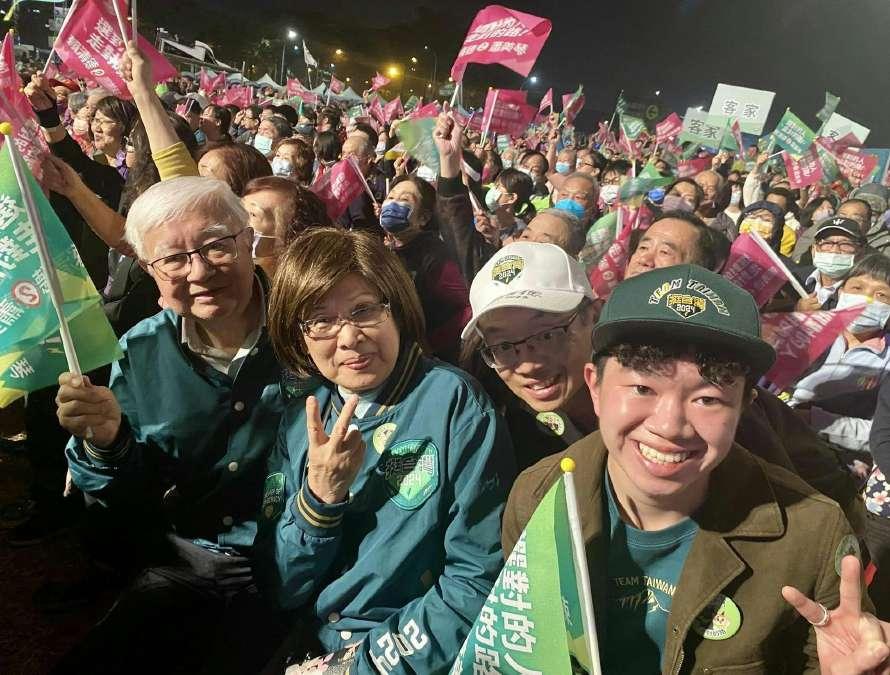
my family’s accomplishments. It turns out that my great-uncle was one of the founders of Taiwan’s democratic Progressive Party, the first formal opposition party to the KMT and one founded on Taiwanese identity. I’d known that my grandfather was elected to the national assembly alongside dPP President-elect lai Ching-te, but I had no idea that a living relative of mine founded the party. My grandfather’s palpable frustration suddenly made sense. It was an embarrassment that the identity he had fought so hard for was one that I rejected out of sheer ignorance.
VIEWPOINT
This journey of self-discovery hasn’t been easy — but nothing worthwhile ever is. My whole life I’ve been surrounded by the nasal vowels and the piercing jabs characteristic of Taiwanese, but I’ve never once been able to understand it. I’ve always envied the close relationship my friends have with their grandparents. I’ve never had that, but we’ll get there one day. My grandfather’s gentle tapping on my shoulder as he shoves a handful of books about Taiwanese political history, in english, into my hands is all the proof I need. There might never be a day when I can under-
stand dinner table conversations at my grandparents’ house, and I’ll regret it for as long as I live. Still, I take solace in knowing that the incessant longing for connection won’t be how my story ends. When I think about my time here, one word comes to mind: unexpected. For the longest time, I felt like I didn’t belong here. This semester, that’s all been washed away. My story isn’t a conventional Tufts story, and it’s only now that I can finally reconcile that difference. Thank you, to those of you that made that possible. I couldn’t have done it without you.
Final meditations from the Opinion section’s conservative
Kevin Golub Opinion Editor
My journey at Tufts these past four years has had an outstanding impact on my life: I met people in Miller Hall on day one who I know will be my lifelong friends; I took unique and insightful courses with amazing professors whom I can confidently call mentors; and I was able to study two vastly different academic subjects — economics and latin. now that four years have passed, it is time to say goodbye. I’d like to offer some final thoughts to close this chapter of my life.
Joining the daily was one of the highlights of my senior year. after submitting several op-eds during my junior year, I formally joined the Opinion section in fall 2023. I came in with little knowledge of the daily’s inner workings and was excited to learn more about journalism and meet new people.
In joining the daily, my previously dormant political side awakened. I found myself debating most of my Opinion section peers on various topics. Over time, I became more confident and learned to stand my ground when challenged. I occasionally received feedback on my articles
from members of the Tufts community, including from students, alumni and parents. I will always be grateful knowing that people read my work, were convinced by my views and valued my contributions to the Tufts community. regardless of what I was writing, the experienced members of the daily provided me with valuable insights and feedback at every stage of the writing process. Most importantly, they pushed back against many of my points, which ultimately made the final products that much stronger. To the daily — thank you.
Holding conservative views at Tufts means being in the minority. earlier this semester, I wrote an article for the daily Week special edition titled ”On the importance of conservative perspectives at Tufts.” In this deeply personal piece, I ruminated on the lack of conservative representation within the daily (and at Tufts altogether), its implications and possible remedies. Voicing conservative views in a largely liberal environment, especially in a public forum like the daily, risks provoking upset. Being conservative at Tufts has given me the courage to be myself in the face of potential opposition.
Conservative voices at Tufts do
not deserve to be muffled by opposing viewpoints. More conservative students should publicly convey their perspectives to show the Tufts community that differing points of view are the norm and a healthy part of any academic environment.
Conservatives can hold their ground and stand up for their beliefs in many ways. The Opinion section in particular offers the opportunity to write about anything with a distinct viewpoint, including local, national or Tufts-related news.
I know there are conservatives on campus who refrain from speaking out, likely because of some of the reasons I outlined above. I completely understand their hesitancy; however, Tufts is obligated to provide an academic environment where diversity of perspectives is prioritized. To anyone afraid of divulging their opinions — seek out like-minded peers at Tufts. With time, you will become more comfortable discussing your views out in the open. When September rolls around, I would be thrilled to visit The Tufts daily website and see a right-leaning opinion piece! Besides my conservative viewpoints, many of the articles I’ve written have focused on the hei-
nous Hamas attacks of Oct. 7, the ensuing conflict abroad and growing antisemitism at home. In doing so, I grew closer with my Jewish peers. This bond was augmented by my increased engagement with Hillel and Chabad, especially after the March 3 TCu Senate hearing.
The antisemitism displayed at Tufts in this past month alone is astounding. Students alleging that Tufts is complicit in genocide have camped out on the academic Quad, with “from the river to the sea” proudly displayed on cardboard posters. additionally, the national Students for Justice in Palestine announced that Tufts SJP stands in solidarity with protestors at Columbia university, who displayed insensitive behavior, including one protester calling a Jewish person a “pig,” a wellknown antisemitic trope. despite the Tufts administration’s attempt to negotiate with the protesters, no deal could be reached, and the protesters subsequently vacated the academic Quad on the evening of May 3. The following morning, workers began erecting fencing around the quad, presumably for Commencement, in line with the university’s prior reasoning for removing the encampment. While this result
is a win for the short term, the Tufts administration needs to more strongly address and condemn hateful behavior toward Jewish students, starting with increased education on antisemitism. That said, I am glad protesters dispersed.
Besides the daily, my time at Tufts has been characterized by many things, including COVId19, new friends and personal growth. as an underclassman, my peers and I were preoccupied with navigating the pandemic, attending Zoom classes and carving out some semblance of a social life. Four years later, in spite of all the trials we faced, I look back on 2020 and smile. I cannot envision a world without the close friends I’ve made at Tufts. They’ve motivated me in times of challenge, showed me kindness at every turn and supported my academic and extracurricular pursuits.
Beyond those whom I met in the hallowed halls of Miller’s basement, I’ve grown close with so many amazing people in Tufts Hillel, Tufts Finance Group, the daily and Tufts university Social Collective. I am grateful to all of them and to Tufts university where I’ve grown so much as a person. Pax et lux.
OPInIOn 40 Sunday, May 19, 2024 THE TUFTS DAILY
JUSTIN HONG / THE TUFTS DAILY
Justin Hong is pictured with his family at a DPP rally in Kaohsiung, Taiwan on Jan. 7.
Kunal Botla Opinion Editor
For the 2024–25 academic year, Tufts’ undergraduate tuition will increase, making the estimated cost of attendance a staggering $92,167. although 38% of the class that matriculated in the fall of 2023 doesn’t pay that full ‘sticker price,’ the cost itself is shocking. even so, over 60% of students pay that full sticker price; over the course of a four-year degree, that sums to over $350,000.
Crossing the $90,000 mark for the first time poses the question of where our tuition dollars go, a question without a clear answer.
In the midst of tuition increasing, the Office of the President sent Tufts faculty and staff a message about the financial state of the university, generally citing increased expenses as the reason for the institution’s need “to perform a delicate balancing act.”
Phillip levine, a professor of economics at Wellesley College, told the Boston Globe that $90,000+ is the highest number that someone would pay. at Wellesley, according to him
VIEWPOINT
Paying for Tufts needs to be easier to navigate
“you’d have to be making at least $300,000 with typical assets” to pay the full sticker price.
There are no quick solutions to the issue, but Tufts could take steps like reducing or eliminating the 1.5% per month interest on late tuition so students have more leeway if they need more time to pay.
Most of all, information about paying for Tufts is key. Current and prospective Tufts students need to understand what meeting 100% of demonstrated financial need means. If students and families understand that they’re not expected to be able to afford over $90,000 per year, but instead it could be closer to $40,000, $20,000 or even $0, then more students outside of the ultrarich would approach Tufts. More extensive resources, such as Washington university in St. louis’ Financial aid dictionary, show us that better information is possible. at the same time, Tufts must forge ahead toward growing its endowment. Having an endowment smaller than our peer institutions, like Washu, Brown university and dartmouth
College has been an issue since at least 2001.
lastly, Tufts should bring us, the students, into the conversations about the university’s finances. as noted by a two-part series on where Tufts tuition goes, a significant amount of information isn’t accessible to students, and students aren’t notified about Tufts’ finances.
Tufts is often called on to reduce the residency requirement, which currently sits at eight semesters of full-time study. This has been changed in the past, with students who were enrolled in the fall of 2020 required to attend Tufts for only six semesters, showing it’s possible to complete the undergraduate requirements on a shorter timeline and remain part of the Tufts community. There was also a 2007 change that added exceptions to the requirement. However, seeing that much of Tufts’ funding comes from tuition, it makes sense why it may not be a strategic move for the university. There is an opportunity to learn from our peers and institute a formal 3+1 master’s program, like those offered
VIEWPOINT
by Harvard university and the robert r. McCormick School of engineering and applied Science at northwestern university, in addition to the 4+1 programs currently offered. Students in these programs would stay a part of the Tufts community for four years, Tufts would still collect four years of tuition, the requirements of the bachelor’s degree would not be compromised, and students would be able to earn a master’s degree they likely would not have otherwise pursued.
Tufts’ housing and dining is required for first-year and second-year students. Tufts should make those resources more powerful and support students using them. Tufts should make more of its meal plans usable, removing limits for frequency and expanding their functionality to all “retail” locations, and even off-campus locations.
I know firsthand how complex understanding the process of financial aid is at large and here at Tufts. When I accepted federal loans through the university, I knew it would show up on my credit report, but it wasn’t
It’s time to level the playing field between athletics and
Liam Chalfonte and Sadie Roraback-Meagher
Opinion Editor and Assistant Opinion Editor
undoubtedly, the american college experience is unique compared to other countries. Besides crippling student loan debt, frat parties and wearing shower shoes, perhaps the most distinctive element of attending college in america is the country’s unwavering love for collegiate sports. Between the 9.86 million viewers of March Madness and the $7.67 billion of revenue collegiate sports merchandise brings in, it’s clear that america cherishes college athletics. But hidden by our jerseys and bustling stadiums is a ugly problem: From admissions to finances, athletics has made college an unfair game.
For most students, gaining acceptance into a top university has become an increasingly difficult task. acceptance rates are plummeting at most institutions. For students from underrepresented backgrounds, the post-affirmative action world of college admissions has become even more precarious.
In comparison, student-athletes’ admissions outlooks remain rosy. One study found that at 19 elite colleges, recruited athletes have a 30% higher chance at admittance than their non-athlete peers. at neSCaC schools, the percentage is even higher, with a 50% increased
likelihood of receiving an acceptance letter. The effect of this can be all too tangible in many smaller colleges, such as Williams and amherst, where about one-third of each incoming class is student athletes. at Tufts, this number is about 13%, or one in eight.
On average, student athletes score 100 points lower on the SaT than non-recruited students admitted to the same institution. This underperformance continues into college: at Ivy league institutions 81% of student athletes graduated at the bottom one-third of their class. Meanwhile, a study conducted on athlete admission to Harvard concluded that “being a recruited athlete essentially guarantees admission even for the least-qualified applicants.” It’s understandable that many athletes’ grades would suffer when considering the immense workload that a commitment to athletics requires, but this doesn’t change the fact that they are receiving academic priority for athletic qualifications. This means that numerous academically qualified students are being denied admission to make space for others who largely haven’t made education their first priority.
athletics have distorted the goal of college entirely. With the passing of nCaa v. alston, which enabled college athletes to receive compensation, attending college to receive a degree has become obscured by monetary goals. athletes now
increasingly transfer to different universities based on states’ rules around athletic financing, thereby losing sight of the academic aspect of college.
Of course, some may see athletic scholarships as a way to help disadvantaged students receive a higher education; but more often than not, the opposite is true. With certain schools investing up to $142 million in their programs, less money is being put toward providing students with better financial aid packages. In fact, one-third of money earned from college sports is put into funding coaches and training staff, explaining why 80% of the highest paid public officials are college head coaches. although 13% of that revenue does go into funding athletic scholarships, whether recruited athletes actually need scholarship money is debatable. With the exception of football, basketball and track and field athletes, recruited athletes are predominately from wealthy, white backgrounds.
The financial issues don’t stop there. Contrary to popular belief, while a handful of the most popular, well known college sports programs do turn a profit, 98.6% operated at a loss in 2021–22, which means that the colleges have to step in to help pay for them. This money is drawn from the tuition and fees of all students, including the overwhelming majority who have no possibility of participat-
clear that it would add two separate accounts and increase the reported balance long after the loans were drawn from. I was also unaware that a switch in loan servicers would cause my credit report to show two brand new accounts, impacting my credit report unexpectedly. If that sounds complicated, imagine how many other examples there are of students struggling to navigate the complex maze that is financial aid.
These ideas may seem like a chaotic combination of patches, but collectively, they improve the position of Tufts’ financial aid program. an issue that draws from a myriad of components should be met with an equally complex number of coordinated solutions.
The pandemic showed us how quickly it’s possible for Tufts to act — when motivated. The university should use the same level of coordination to make Tufts more accessible, affordable and valuable to students to make progress on university President Sunil Kumar’s goal of Tufts “opening its doors as wide as possible.”
academics

ing in these athletic programs.
The numbers of these losses can be staggering, with some colleges losing between $20–40 million on their sports programs every year. as for Tufts, nailing down specifics is difficult, as our athletics department doesn’t publicly release its financials, and the one national database that includes this information is very flawed due to a hesitancy to report losses. For this reason, according to the department of education, Tufts athletics broke perfectly even last year, though it is likely that the program is actually operating at a deficit.
It’s time for colleges to reevaluate the preferential treatment student athletes receive and look to level the playing field. This isn’t to say that college athletes don’t deserve praise for the immense
amount of talent, time and effort they put into their craft, but the current system ultimately is detrimental to not just students, but the mission of higher education. Colleges need to find a balance between producing the next generation of professional athletes and the next generation of educated citizens. This doesn’t mean athletic budgets need to be gutted or student athletes should have to jump through hoops to be accepted into their dream school. rather, student athletes should be treated as who they are: students. athletics should be just one aspect of a student’s application or college experience, just like any other extracurricular. Colleges need to get back on track and keep academics at the forefront of their mission.
The Tufts daily is a nonprofit, independent newspaper, published Monday through Friday during the academic year, and distributed free of charge to the Tufts community. The content of letters, advertisements, signed columns, cartoons and graphics does not necessarily reflect the opinion of The Tufts daily editorial board.
EDITORIALS: editorials represent the position of The Tufts daily editorial Board. Individual editorialists are not necessarily responsible for, or in agreement with, the policies and editorials of The editorial Board. editorials are submitted for review to The Tufts daily executive Board before publication.
VIEWPOINTS AND COLUMNS: Viewpoints and columns represent the opinions of individual Opinion editors, staff writers, contributing writers and columnists for the daily’s Opinion section. Positions published in Viewpoints and columns are the opinions of the writers who penned them alone, and do not necessarily represent the opinions of the daily itself. all material is subject to editorial discretion.
OP-EDS: Op-eds provide an open forum for campus editorial commentary and are printed Monday through Thursday. The daily welcomes submissions from all members of the Tufts community; the opinions expressed in the Op-ed section do not necessarily represent the opinions of the daily itself. Opinion
to
in length and submitted to opinion@tuftsdaily.com. The editors reserve the right to edit letters for clarity, space and
all material is subject to editorial discretion and is not guaranteed to appear in the daily. authors must submit their telephone numbers and day-of availability
ADVERTISEMENTS: all advertising copy is subject to the approval of the editor
OPInIOn 41 Sunday, May 19, 2024 THE TUFTS DAILY
RACHEL LIU / THE TUFTS DAILY Sol Gittleman Park and the varsity tennis courts are pictured.
national
issues should
600
questions.
articles on campus,
and international
be
1,200 words
length.
for editing
executive board
business director.
in chief,
and

GraPHICS 42 Sunday, May 19, 2024 THE TUFTS DAILY

GraPHICS 43 Sunday, May 19, 2024 THE TUFTS DAILY GRAPHIC BY JAYLIN CHO
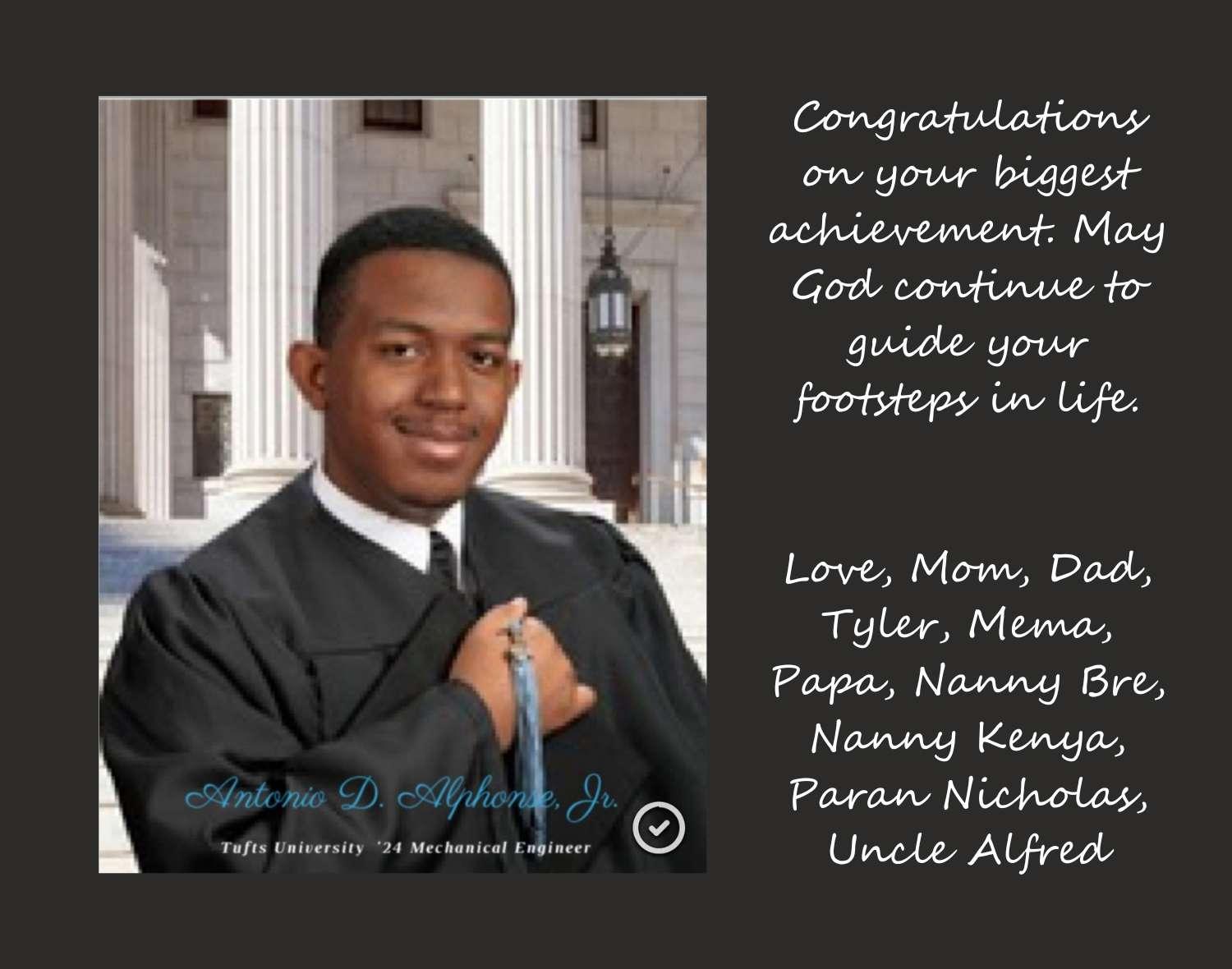

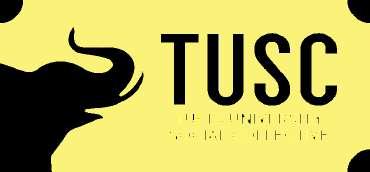
Happy G R A D U A T I O N ! G R A D U A T I O N ! D A V I S | J A D E N | M A Y L I N D A V I S | J A D E N | M A Y L I N M A D D I E | K E V I N | F R E Y A M A D D I E | K E V I N | F R E Y A G U S G U S




Fun & GaMeS Fun & G A m E s 45 Sunday, May 19, 2024 THE TUFTS DAILY F& G Late Night At The Daily CROSSWORD SUDOKU CROSSWORD Difficulty Level: Resisting the inevitable ebb and flow of time SUDOKU Copyright © 2024 SudokuTodo | For personal or classroom use only. Play online or make your own free printable sudoku at SudokuTodo.com Fill in the puzzle so that every row across, every column down and every 9 by 9 box contains the numbers 1 to 9. Evil Puzzle #1 7 8 1 7 1 9 8 5 2 1 2 3 4 7 2 6 9 1 3 4 7 Rachel: “The thing that gives me the most fear is when things happen.” Commencement 24 1 2 3 4 5 6 7 8 9 10 11 12 13 14 15 16 17 18 19 20 21 22 23 24 25 26 27 28 29 30 31 32 33 34 35 36 37 38 39 40 41 42 43 44 45 46 47 48 49 50 51 52 53 54 55 56 57 58 59 60 61 62 ACROSS 1 A certain a cappella singer dressed in red and black 4 Undo 9 Inquired 14 Common enzyme suffix 15 Famed Covid-19 immunologist 16 Seventh track of Bob Dylan's "Infidels" 17 Home of the Jumbos 20 Jumbo could be described as this, and his are large 21 "_ ___ my case" 22 Jeopardy host Trebek 23 One who leaf peeps in autumn 26 Typing stat 29 Purpose 30 How you might describe our campus 31 Groove made by joining two pieces of fabric 32 An offering at Medford's Goldilox 33 Violate the Hippocratic oath 35 What you do through the Leonard Carmichael Society 38 State of rest 39 Utensil used to get soup at Dewick 40 Leave it be, in publishing 41 Eat, drink and be 42 All-points bulletin, abbr. 45 Lot 46 Cover with spots, as in measles 48 La ___ Tar Pits 49 Rise, at a ceremony 51 Male spirit with horse legs 52 Congratulations! 57 To call forth 58 It goes on the cake 59 Nickname for Stuart 60 Apostle and early leader of the church 61 What a TPS student might do 62 If TEMS could be singular DOWN 1 Boat, on the Seine 2 Regulars 3 Go, leave, __ ___ 4 Center for STEM Diversity, abbr. 5 Greek T 6 Dash 7 50, 100, 1 in Roman numerals 8 Enliven 9 One who airs 10 Attitude 11 What an out-of-towner might buy for Boston winters 12 Boston's summertime time zone 13 Many a YouTube tutorial 18 ___ Mex 19 Before, in poetry 23 Clothing brand La ___ was founded by Tufts alum Meredith Melling 24 Life, in Budapest 25 Forms of a gene 27 Prez Lawn could be one 28 Vocal reaction to a Dewick brownie 30 Arts ___, aka Bartol House 31 Toe-coverer 32 Spot clean 33 Artist behind Beats headphones 34 Resembling an owl 35 President's "no" 36 What you will almost never find at the Sink 37 Below a marquess, above a viscount 38 Tufts' FI___ Resource Center 41 Tufts has a Spanish study abroad program here 42 Many an SMFA student 43 Small cactus, or a psychoactive drug 44 ____ Hall, former home of Jumbo 46 ____ Campus Center 47 How Modern American Poetry is listed in SIS 48 Nocturnal flyer 50 Expressway, abbr. 51 Wise 52 Oft-advertised condition that may be B or C 53 __ Maria 54 One way to say "here," in Oaxaca 55 Dinner, slangily 56 Chapel Hill university, abbr. Interested in submitting a puzzle? Reach out to production@tuftsdaily.com LAST PRINT’S SOLUTIONS: The Perfect Date A S E C L A O S S H E A P O L L U N D A M A A R P R H E A I D I N A B R I E I N N T R E D C A R P E T L E A R W H Y P E D I 27 E E A A 28 O 29 O N 30 A 31 I 32 R 33 A 34 H 35 V 36 N U L L 37 S 38 A N N A 39 F I R 40 S T L A D Y 41 O 42 F S O N G 43 O H B O Y 44 E N N A 45 N I S 46 G O O F 47 S 48 A R C A S 49 M 50 T 51 U P D 52 L O O 53 F 54 A 55 H 56 J 57 O 58 A N O F A 59 R 60 C 61 D R I V E 62 A P O E M 63 G A O 64 S 65 O F A N 66 R U S S O 67 I S I T 68 S T I R 69 S O S 70 O H N O E H L Y 1 Gimme _ ___ 5 Country between Thailand, Vietnam, and Cambodia 9 Butter often used in skincare products Survey, opinion sample 14 What you might do to a beaver-ified 16 Org for retirees 17 Actress and former wife of Danny 18 The one and only Adele Dazeem 19 Popular French soft 20 Isn't it, in Notting Hill What celebs walk 24 What you might ask rhetorically when a Shakespearean king makes questionable decisions Mani-___ 2023 Best Picture winner 29 Live on TV Vision, abbr. 36 Cancels, halts 38 Sister of 18-across's "Frozen" character 39 Nickname for Ella saint/heroine of France Steer, conduct 62 What you might write an English major for their birthday 63 A certain stylization of a popular chicken dish available Mondays at Hodge 65 You might Google "anatomy __ __ eye" when curious about 66 Last name of Avengers film directing brothers 67 "Are you sure?" 68 What one might do to a pot - - - - -70 "This is bad!" 71 Americanized DOWN 53-down, Miss Rhode Island's "perfect date" Watchmakers A. Lange & ____ 3 Supreme Court Justice Kagan 5 His, in Marseille 6 Genus of composite herbs with yellow 15 One of two spices produced by the fragrant evergreen 21 See 1-down 23 "Much ___ About Nothing" 25 Schlep 28 Greater than in age 30 "___ Pls." a recent novel by celeb gossip Instagrammer 42 What an attempt at spelling facade might result in 47 Sun protection abbreviation might say instead of slow 49 Sullen, gloomy Man, in Positano 53 See 1-down 54 It was to no ___
‘Commencement 2024’ by Claire Wood
sp ORTs
From brown and blue to red, white and blue: Jumbos in Paris Olympic Games
Max Druckman Staff Writer
There is no higher honor in sports than competing in the Olympic or Paralympic Games.
To hear your nation’s national anthem, to bear the blazing torch and to gaze at the interlocking rings is to be etched in athletics lore for eternity.
at the 2020 Tokyo Summer Olympics, 15,440 athletes participated in the Olympics and Paralympics. Over the last four years, thousands more have worked tirelessly, practicing their craft for countless hours, to be among the select few with the opportunity to compete at the 2024 Paris Games.
When the eyes of the world tune in on July 26, two of the athletes on their televisions will be Tufts Jumbos. Jesse Grupper (e’19) and sophomore alex Flynn will both represent Team uSa this summer. Grupper will compete in boulder and lead climbing, while Flynn will compete in Paralympic rowing.
For both athletes, their participation is a culmination of a lifetime of hard work and persistence, with their time at Tufts playing a key role in their success. Grupper’s introduction to climbing came at a young age.
“My sister started climbing when I was about six years old, and I was brought to the gym with her pretty consistently,” he said. “I had a ton of energy as a kid. … I started taking lessons when I was about six and I just never looked back. It just always felt like the sport for me.”
even while a student at Tufts, Grupper continued to make climbing a part of his life.
Balancing training and academics improved his performance in both, as the two ultimately complemented each other.
Senior
Nick Dohr Staff Writer
“I’ve always found that balancing climbing and school or work has always made both a little bit better,” Grupper said. “When I was at Tufts, … I would structure my day so that I would try to get most of the brunt work [of] school done within the start of the day. … Then, in the evenings, I would go to the gym that was local to us — it’s called [Central rock Gym] — and I would spend probably three hours there.”
The most impactful and informative lessons of Grupper’s climbing career came in the classroom. a mechanical engineering major, Grupper built skills in critical thinking and problem-solving, translated seamlessly into climbing.
“With climbing, you start with a start hold and you have some amount of holds in between that and the finish hold, and it’s up to you to figure out and be creative about the method that you’re going to use to get to the top,” Grupper said. “a nd, similarly, with engineering, you’re given a problem statement and you’re given some tools to get out with, and it’s up to you what that problem solution will look like.”
after graduating from Tufts in 2019, Grupper made the bold decision to turn professional. Since then, he has traveled the world, competing in places ranging from France to Singapore to South africa.
“It’s been quite a wild ride,” Grupper said. “right after Tufts, I was quite excited to spend a year just focusing on rock climbing and competition climbing in general, and I set off at the end of 2018 competing on the World Cup circuit. I thought that that would be it, that would be my year, and then, I would retire. … I was wrong.”

Once Grupper turned professional, he continued to excel. On the 2022 Overall lead World Cup circuit, Grupper finished third. That same year, he won the national Team Trials in atlanta. rock climbing was introduced as a sport at the 2020 Games, providing a clear, but still daunting, goal of qualifying for the next edition of the games.
“The Olympics, in general, has always been a dream for me … but it kind of felt like climbing wasn’t something that the Olympics … thought should be included,” Grupper said. “The first realization was having it be included, and then I think the next time that I realized for myself was in 2022 when I qualified for the combined discipline which is the format for the Olympics going into Paris. and I think that was when I fully realized that this was a possibility.”
Finally, at the 2023 Pan american Games, a dream was
realized. Grupper dominated the Boulder and lead Combined discipline in Santiago, Chile, taking home the gold and qualifying for the Olympics.
For sophomore alex Flynn, the wait to go to the games was shorter — just two years of collegiate rowing. a native of nearby danvers, Mass., who also skis and wakeboards, Flynn brings a breadth of experience to this summer’s Paralympic Games.
Similar to Grupper, Flynn found his sport accidentally — he needed something to do after school. eventually, he found his way to Tufts, where he raced the varsity 4V8 boat as a first-year. In the summer of 2023, he was selected by uSrowing to compete at the Pr3 mixed four boat at the World rowing Championships in Belgrade, Serbia. He also earned the opportunity to compete at the 2023 Para rowing regatta to Paris prior to the World Championships, on the same
course that the Paralympics will be held this summer.
The summer of 2023 was quite successful for Flynn. He garnered a silver medal in the Pr3 mixed four with coxswain and won gold in the Pr3 mixed four with coxswain at the 2023 Para rowing regatta to Paris. The results marked the second time in Flynn’s international career that he placed in the Pr3 mixed four, as he finished fifth at the 2022 World Championships. With a return to Paris in the cards again this summer, Flynn is hoping that he can add to his trophy cabinet.
no matter the outcome of their events this summer, Grupper and Flynn will have the experience of a lifetime. Wearing red, white and blue, the pair will have the chance to show the world their talent, passion and hard work, and how a stint in brown and blue helped get them to the zenith of global sport.
Profile: Maggie Russell, Tufts’ ultimate women’s basketball force
When most people think of Tufts women’s basketball in the past few years, the first name that typically comes to their mind is Maggie russell. as a dominant 6-foot-1 forward, russell played an important role in the Jumbos’ success throughout her career. She didn’t just play an important role on the court though; she was also impactful off the court as a role model for the younger players.
“Maggie definitely had an outstanding and prolific role on our team,” first-year forward Hope nardone said. “[She led] primarily through example, I mean, she was a really tough player. [She was not] only talented but also very gritty and hardworking, for sure.
[She was] kind of quiet but her actions spoke louder than words.” russell knew the role she played as a role model on and off the court and prioritized being there for the first-year players in their transition to college. Her role models on the team were the seniors when she was a first-year.
“I remember, my freshman year, how great the senior captains were,” russell said. “I just worshiped them. I was like, ‘This is who I want to be when I’m a senior and who I can be.’”
russell tried to play that same role for the first-years this season as a senior captain, and that effort did not go unnoticed.
“I remember all the freshmen got lunch with captains, including Maggie, and they were all asking about our transitions and how we were getting along with
school and friends and roommates and dorms,” nardone said. “Whenever [Maggie] walks into a room, [she] is pretty much always smiling and asks you how you’re doing [and] how your day was. She generally does care a lot about each and every one of us.”
On the court, russell can be described as nothing short of prolific. Scoring 1,460 points for the Jumbos, she led the offense and accumulated a list of awards in her four years longer than some teams combined. She became an impact player right off the bat, playing in 21 games her first year, before starting in 22 games during her sophomore year and then in every game her junior and senior years. In the 2022–23 season, the Jumbos made a run deep in the nCaa playoffs after bringing
home a neSCaC championship to Medford, which is russell’s favorite memory at Tufts.
“Winning the 2023 [ ne SC aC] Women’s Basketball Championship in Cousens gymnasium … was just such an amazing experience and a great atmosphere — and then we went on to the e lite eight,” russell said. “Being able to win that and celebrate that with all my teammates was truly an amazing moment that I will never forget.”
That season, russell scored a whopping 573 points and led nearly every stat category. and in the few stat categories she wasn’t leading, she still fell within the top three or five players. In the neSCaC quarterfinal game against Bowdoin, russell scored a career-high 40 points, going
a perfect 16–16 from the free throw line. She was awarded the d3hoops First Team all american award, the d3hoops region 1 Women’s Basketball Player of the year and the neSCaC Player of the year that season, among other awards. She also scored her 1,000th career point in the nCaa Tournament elite eight game versus Christopher newport. The 2023–24 season was expected to end on an even higher note for the Tufts basketball program. unfortunately, that didn’t end up being the case for the squad, as they finished 11–13 in the season and 3–7 in the conference. as the constant ray of sunshine that she typically is, russell tried to maintain a positive view of the season.
SPOrTS 46 Sunday, May 19, 2024 THE TUFTS DAILY
GRAPHIC BY BEX POVILL
see RUSSELL, page 48
Senior Profile: Emma Joyce finds community, growth on women’s lacrosse
Tara Wirtschoreck Staff Writer
Tufts women’s lacrosse has been a strong program in division III for years. Senior midfielder emma Joyce has contributed to the team’s impressive record in her four years at Tufts. In the 2021 and 2022 seasons, Tufts won the neSCaC championship and was runner-up in the nCaa championship. additionally, in the 2023 season, Tufts was runner-up in the neSCaC and made it to the nCaa quarterfinals. Joyce explained that being part of a team that’s been so successful has made for an exciting four years.
“Going to the final for a national championship two years in a row was pretty special,” Joyce said. “My freshman year, it was the first time we’d ever won a neSCaC championship and also made it to a national championship.”
Joyce explained that winning back-to-back neSCaC championships was one of the best parts of her career. The fact that COVId-19 impacted the neSCaC tournament her first year made the team’s win even more exciting in the 2022 season.
“We were definitely really excited [about our results] my freshman year, but there was still a little [caveat that] a ton of teams weren’t playing still,” Joyce said. “Obviously we deserved it and
worked really hard, but we still left unsatisfied. Then, backing that up the next year was really incredible.”
Joyce’s journey playing lacrosse started long before Tufts. From a young age, Joyce played multiple sports. along with lacrosse, she also competed in swimming and soccer, which allowed Joyce to develop her skills across disciplines.
“With lacrosse … I was able to still play some other [sports] and compete at a high level, but felt like it was the one that I definitely had a lot of fun with and wanted to continue playing in college,”
Joyce explained.
Joyce was excited about the coaching when she came to Tufts, and it proved to be one of her favorite parts of being on Tufts lacrosse.
“I really liked the coaching staff. That’s something that people kind of throw out when they’re getting recruited … but I didn’t realize until I got here how important [it is] having a coach that truly cares about you, loves you and is there for you,” Joyce said. “Our head coach right now, Courtney Shute, has been the most amazing coach that I’ve ever had.”
Joyce also explained that good coaching has created a better atmosphere for the team as a whole.
“Coach Shute has built such an amazing culture,” Joyce said.
“I find it pretty rare to have a coach ask us when she’s wrong and want feedback from her players and actually take it and listen to it. … It’s been a really special opportunity that I definitely didn’t recognize going into my freshman year.”
along with good coaching, the support Joyce got from the team as a whole helped her grow as a person and a lacrosse player. Her trust in her teammates allowed her to take more risks on the field and improve her lacrosse skills.
“[In my first two years], it was hard to feel like I could really take the risks I wanted to, even though everyone trusted me,” Joyce explained. “Over time, from the support of teammates and coaches, I’ve learned that a lot of both individual and team success is from believing in yourself and knowing that everyone else believes in you.”
Beyond the field, the unique leadership structure of the team has helped Joyce and other upperclassmen gain experience leading the team. Instead of team captains, women’s lacrosse has senior leaders who take on many of the roles that captains traditionally would, in encouraging teammates and helping lead by example for their teammates.
“I’ve learned so much about leadership that I don’t think I would have gained in any sort of way without lacrosse,” Joyce said.
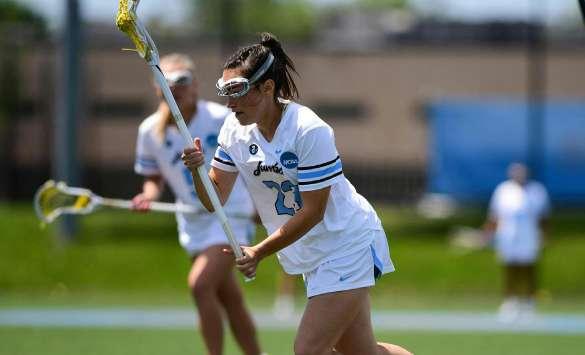
“[I think] not having captains is really beneficial, and it’s allowed me to naturally develop into the leader I am both on and off the field: being more confident, speaking up in large groups and being able to manage a team.”
Joyce explained that her favorite part about playing lacrosse over the past four years was the team culture that allowed her to grow as both a person and a player. With the help of coaching staff and teammates, the Jumbos have created an environment where every athlete is valued for their skills. Joyce explained that this helped her learn about her own leadership style.
“Being part of a team and coaching staff that really embraces everyone’s role, truly, no matter how many minutes you see, no matter what grade you are, has
really allowed me to realize and recognize what I’m good at, lean into that and feel confident in that,” Joyce said. “even if I’m not the loudest person on the field, I’m still leading by example with my hard work and setting a good example for everyone else.”
Joyce is a community health and english major. next year, she plans to stay and take classes to receive her Master of Public Health as part of the 4+1 combined degree program and use her extra year of eligibility from COVId-19 to play another season of lacrosse.
“I’m excited that I’m not completely saying goodbye to Tufts yet, and the lacrosse team,” she said. “I wouldn’t want to do it anywhere else in any other school because of the people on the team and the coaching staff.”
Senior Profile: Andrea DelGiudice builds success through tenacity
Bharat Singh Staff Writer
It’s no surprise that head coach Tina Mattera chose “tenacious” as the word to describe senior co-captain andrea delGiudice. If you’ve ever attended a Tufts field hockey game, you’ve probably witnessed this tenacity on show through the finesse and speed of delGiudice. among the chaos of midfield battles, her blue and white no. 7 jersey often glides through with composure, as her deft touch and agility allow her to unlock defenses. Without the ball, delGiudice often diffuses opposition attacks, highlighting her defensive importance and versatility. From surprising herself by making her varsity team as a freshman in high school to anchoring the Tufts midfield, delGiudice’s field hockey journey has been a testament to hard work and self-confidence.
delGiudice recalls falling in love with the sport before her senior year at St. Paul’s School. One of the players delGiudice looked up to in high school was teammate Josie Varney, who went on to play for duke university.
“I was going to be the captain and thought I should try to play a lot and get as good as I could.
I had no intention of playing in college until I realized October of my senior year that I didn’t want all of my hard work to go to waste and I wasn’t ready to stop playing,” delGiudice wrote in an email to the daily.
Coming into Tufts, delGiudice was nervous about keeping up with the skill level of her teammates, many of whom, unlike her, had played club-level field hockey in high school. despite having strong athletic ability, there were aspects of her game that needed improvement.
“as a freshman she needed to work to improve her stick skills and knowledge of the game,” Mattera wrote in an email to the daily. With time, delGiudice’s game matured as she demonstrated outstanding growth between her sophomore and junior year.
“Her game has grown leaps and bounds. She has really put the time and effort in to making herself a better player and I was so impressed with the improvement she made between sophomore and junior years. She is now a standout player in the neSCaC and division III,” Mattera wrote. looking back on her career so far, delGiudice reflected on her growth as a player and person.
“I’ve become much more confident as a player just from having 4 years of experience under my belt. The older you get, things start to click and you start to understand our style of play,” she wrote. “as a person, the responsibilities of being captain the past year have made me mature a lot.”
delGiudice further highlighted how her teammates and coaches have helped her develop as a player.
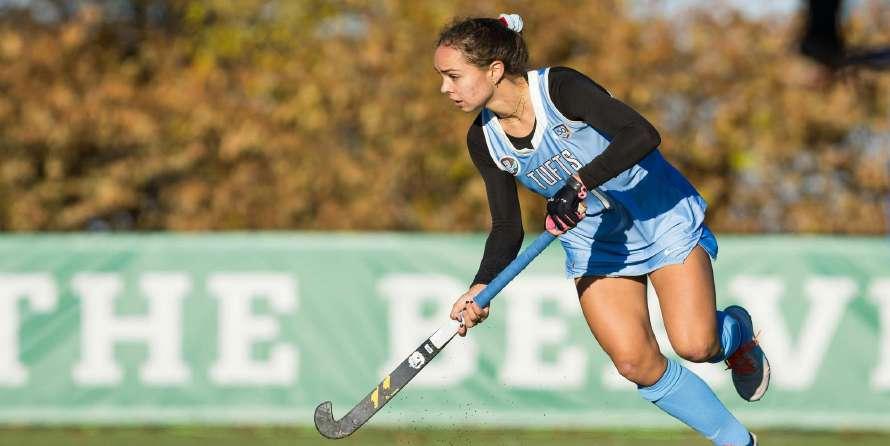
“I pick up on other players’ skills and try and incorporate them into my own game. I’ve learned a lot from people in the years above me, but I also still learn from people in my own grade and even younger players,” she wrote. “everyone I’ve played with here at Tufts has inspired me in one way or another.”
Having started all 39 games during her junior and senior seasons, delGiudice’s presence on the field has been notable. This season alone, delGiudice has racked up 10 goals and two assists for 22 points, including five game-winners. This was almost double her record in 2022, when she put up four goals and four assists for 12 points. This season, delGiudice led the team in goals and points, but most impressively, clocked 1,115
minutes for the Jumbos, more than any other outfield player.
The Jumbos held a formidable 7–1 home record, including a nail-biting 2–1 overtime victory against amherst College in which delGiudice scored the game-winner. a nother game-winner came on the road against Bowdoin College. Tufts eventually fell to amherst in a 3–2 thriller in the neSCaC tournament, a game in which delGiudice scored once again.
In sports, no. 7 is usually saved for a player with both incredible skill and leadership. It’s a number that opponents dread facing and teammates seek for inspiration. delGiudice has embodied this spirit from her first moments on the team. another one of her idols is current university of north Carolina head coach erin Matson,
who won four national titles for the Tar Heels and is considered one of the greatest college athletes ever. at 23, Matson became the youngest division I head coach to win a national championship. like Matson, whose time with her team extended beyond her undergraduate years, delGiudice will continue to anchor Tufts’ midfield as she begins her data science master’s program at Tufts. When asked for advice for her star defensive midfielder going forward, Mattera encouraged delGiudice to keep pushing herself to see how much better she can get. There’s no doubt her presence next season will be critical to the Jumbos’ success, and her mentorship of younger players will lay the foundation for a cohesive squad in the future.
SPOrTS 47 Sunday, May 19, 2024 THE TUFTS DAILY
COURTESY TUFTS ATHLETICS
Andrea DelGiudice is pictured against Rowan University on Nov. 11, 2023.
COURTESY TUFTS ATHLETICS
Emma Joyce plays against SUNY Cortland in the 2023 NCAA tournament.
Introducing the 2024 Tufts Athletics Hall of Fame inductees
Henry Blickenstaff Deputy Sports Editor
Tufts athletics announced on Feb. 21 that seven new athletes as well as one team will form the fifth class of the Hall of Fame. They will be inducted on June 7 in a ceremony at Gillette Stadium.
“This honor means a tremendous amount to me and is a testament to all of the support I have had in my tennis career. My family, coaches, friends, and teammates shaped me into the tennis player and person worthy of such an honor. I was and will always be proud to have played tennis as a Tufts Jumbo,” Julia Browne (la’11), one of this year’s inductees, wrote in an email to the daily.
Browne was a seven-time a ll- a merican across singles and doubles during her Tufts career. She took home the 2010 division III singles title, winning six matches, all of them in straight sets. She went 31–3 in her championship season, and won the ITa arthur ashe award in 2010, which recognizes not only performance on the court but also sportsmanship, leadership and academic excellence.
Beyond her dominance on the court, Browne is grateful to Tufts tennis for introducing her to lifelong friends.
“It has been special to not only have our college memories connecting us but also the new memories we have made as we have moved through new chap-
ters of our lives. I am forever grateful to Coach for recruiting such an amazing group of teammates and creating an environment that allowed us to develop strong relationships with each other,” Browne wrote.
Those connections were present on the court during Browne’s career. When asked what her favorite memory from her career was, she cited a contest against Bowdoin in which she lost her match but witnessed her teammates come back to secure the team victory.
“They fought so hard, and slowly but surely, both of them started to turn around their matches. Between points they would look at each other and cheer. In the end, both of them came up big and won their matches to give us the team victory 5–4,” Browne wrote.
“It remains the most powerful team comeback I’ve ever been part of and an example of how college tennis is most importantly about the team.”
Sailor Betsy Gelenitis alison (la’81) will also be honored in June. a three-year captain, she was Tufts sailing’s first female all-american in 1981. In college, she won two u.S. Women’s Singlehanded Championships in 1979 and 1981. after her college career, she won nine world titles across various disciplines and coached the u.S. Paralympic Team for over 20 years. She is a five-time rolex yachtswoman of the year and a member of the national Sailing Hall of Fame.
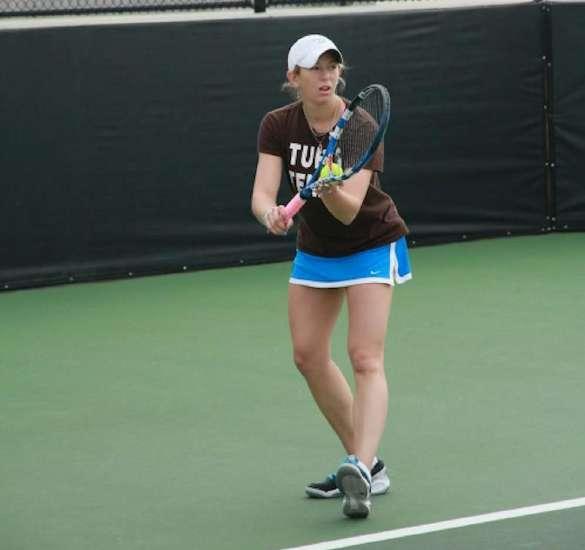

Bill Gehling (a’74) was not only a standout soccer player but also an influential coach and administrator at Tufts. Gehling ranks second in school history with 39 goals and 101 points. He later became the first head coach of the women’s soccer team at Tufts in 1979, and led the program to 165 wins over a 20-year tenure. as athletic director, he saw Tufts athletics win eight national titles in 16 years.
Sprinter Basil Ince ( a’59) was successful both at the collegiate level and also nationally as a representative of his native Trinidad and Tobago. In his junior year, Ince took home first in the 100, 200 and 440meter dashes at the e astern Intercollegiate Championships. The next season, he went undefeated in dual meets in the 100, 200 and 440 outdoors as well as the 600 indoors. at the 1959 Pan a merican Games in Chicago, Ince won silver in the 400 and was a member of the gold medal-winning 4x400 relay team. He later served as a senator in the Parliament of Trinidad and Tobago from 1981 to 1986.
Shawntell Manning (la’96), also a sprinter, was an eighttime a ll- a merican across the indoor and outdoor seasons as well as a five-time regional champion. These five titles
maggie Russell, a name to remember
RUSSELL continued from page 46
“Overall, it wasn’t the season we hoped for at all, but it was great to be able to play with all my closest friends,” she said.
In her senior season, russell scored 460 points, averaging 19.2 points per game. She also recorded seven double-doubles. after finishing her last game, russell played 2,555 total minutes.
Tufts women’s basketball served as an important experience in her life that taught her many valuable lessons.
“The most important lesson I’ve learned is to always be there for your teammates. you never
really know what anyone’s going through,” russell said. “The most important lesson in life is [learning] who you can be to others and how you can support your teammates, who are also pretty much your family, and who you spend all your time with and are your best friends.”
On the court, other players, coaches, commentators and fans could be confident that if the team needed a player to put in just a little more work to score a few more points, make another block or just simply never give up, that player was almost always going to be Maggie russell. Off the court, whether the team won or lost,
whether the morale was high or low, she was always the player to cheer on her teammates or console them if needed.
russell is leaving big shoes to fill but is confident in the program’s future. She offered advice to incoming first-years.
“don’t take any moment for granted and just work as hard as you can while enjoying the people around you,” she said.
That was the mentality that russell played with in her four years, and it’s that mentality which led her to be one of the most successful players in the program’s history. She has left an impressive legacy that will last for years to come.
included indoor and outdoor titles in the 400-meter dash in both 1994 and 1995, as well as a 200-meter dash outdoor title in 1995. She won the Hester B. Sergeant award in 1996 as the most outstanding female athlete at Tufts after winning the nCaa Indoor title in the 400 meters.
Pitcher Jeff Taglienti ( la’97) was the Jumbos’ baseball ace from 1994–97. His 258 career strikeouts and 274 innings pitched are both school records, as is his single-season strikeout mark of 86 in 1997. Meanwhile, his 2.00 career era and 27 career wins rank second and third Tufts baseball history, respectively. He was a seventh round selection by the Boston r ed Sox in the 1997 M l B draft, and he pitched for six years in the minor leagues in the red Sox, Colorado rockies and Cincinnati reds organizations.
david Thompson (e’62) was a two-sport athlete, excelling in both football and track and field. Serving as a captain of both teams, he was an a llamerican and all-east honoree as a tackle in football and won a new england championship in hurdles, while also competing in the broad jump and dash events. He received the Clarence “Pop” Houston award as the
most outstanding male athlete and the Bennett Memorial Scholarship for his sportsmanship. Furthermore, he received national recognition as a recipient of the national Football Foundation award in 1961 for both his athletic and academic achievements.
The 2015 softball team will also be honored in Foxborough. The team went 51–0 en route to their third consecutive d ivision III national championship and fourth straight ne SC aC title. They shut out their opponents in 30 of those 51 games. Senior pitcher a llyson Fournier led the Jumbos, posting an otherworldly 0.26 era over 209 and two thirds innings. She struck out 423 of the 736 batters she faced, allowed only ten extra-base hits all season, and pitched 24 shutouts.
a ll of these athletes have undoubtedly reflected extremely well on the university, but they’ve also learned from their experience as athletes.
“Being a Tufts tennis player taught me about commitment, hard work, and collaboration, all of which have served me well in my life after college,” Browne wrote. “I learned that being part of a team both in my professional and personal lives, is critical for my own happiness and success.”
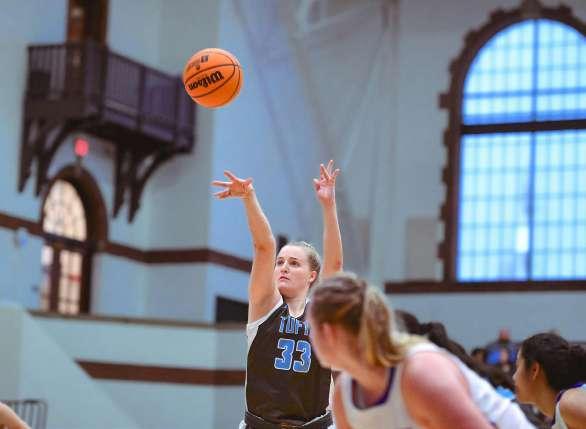
SPOrTS 48 Sunday, May 19, 2024 THE TUFTS DAILY
COURTESY TUFTS ATHLETICS
Maggie Russell shoots in a Jan. 13 game against Hamilton.
COURTESY TUFTS ATHLETICS
The 2023 Tufts Athletics Hall of Fame medals are pictured. This year’s ceremony will be held June 7.
COURTESY JULIA BROWNE
Julia Browne prepares to hit her serve.
Senior Profile: Thalia Greenberg leaves it all on the field
Zachary Gerson Staff Writer
Graduating senior midfielder Thalia Greenberg could not be more proud of her time with the Tufts women’s soccer program. a natural leader on and off the field, Greenberg’s lasting impact on the program will be felt for years to come.
Greenberg’s love for soccer traces back to her earliest years. She started to kick a ball around as soon as she was able to walk, and shortly after, she began playing organized soccer in first grade. Greenberg recounts how she would not be where she is today without her father, who was himself a varsity soccer player at Cornell university.
“He was the one that taught me my love for the game,” Greenberg said. “He was the one that put cleats on me when I was in first grade and had me try out for teams. My dad is also one of my greatest supporters and he’s very knowledgeable about soccer. So his impact on my soccer career has been so valuable.”
Greenberg feels that her time playing high school soccer back home in California prepared her very well for her time at Tufts. She learned the value in leadership and forming relationships with her teammates.
“High school soccer really taught me how to be a leader,
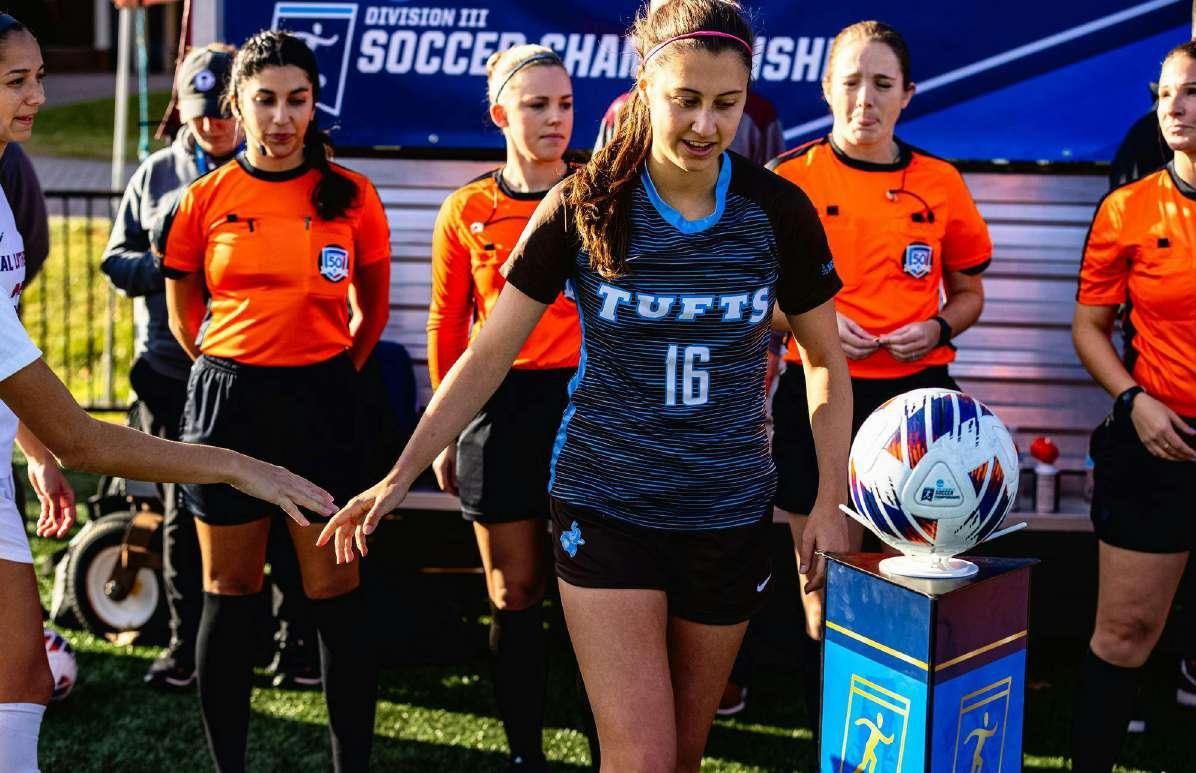
how to cultivate an atmosphere that was accepting and welcoming of all people and also how to empower those that are younger than me to be leaders on the team as well,” Greenberg said. Coming to Tufts, Greenberg carried these lessons with her. In
addition to being a leader, she is also proud of the player she is on the field. She reflects on how her awareness on the field is what has made her the player she is.
“I think the biggest strength of my game is my technical and tactical awareness [and] my vision of the field,” Greenberg said. “I’m definitely more of a technical and tactical player, as opposed to physical strength and speed. So I focus heavily on distributing the ball, making effective plays.”
This style of play was clearly effective for Greenberg, as she was the team’s highest scoring midfielder this season, tallying seven goals and two assists for a total of 16 points in 21 games. In addition, she was honored as a member of the 2023 all-
Senior Profile: Jay Dieterle — leaving Tufts, entering a legacy
Keriann Slayton Staff Writer
September 2020. an eager Jay dieterle arrives in Medford, the lone rookie recruited to play for the Tufts men’s basketball team, and begins the move-in day routine. He discovers his dorm room, says goodbye to his family and walks to 62r Talbot ave. for his mandatory COVId-19 test.
It comes back positive. On just day one, he becomes familiar with The Mods, Tufts’ lonely quarantine housing, before he can even hang a poster above his twin Xl bed. Welcome to college, Jay.
The beginning of the college experience for the Class of 2024 was unconventional, to say the least, but the adversity that dominated dieterle’s first-year experience paved the way for the storybook moments of his senior
year. as graduation approaches, he reflected on his athletic and academic achievements as a Jumbo that created a foundation for future adventures.
Born and bred in Franklin, Mass., dieterle knew he wanted to continue calling new england home during college.
He attended high school at The rivers School along with Tufts teammate Tyler aronson, who graduated in 2023, and the Tufts connection emerged early on in dieterle’s high school career.
“When [ a ronson] was getting recruited by Tufts, I was a freshman in high school, so I had already known the previous coaching staff that recruited me,” d ieterle said. “It was just the familiarity when they started recruiting me as a junior, I’d known them for two or three years at that point. It
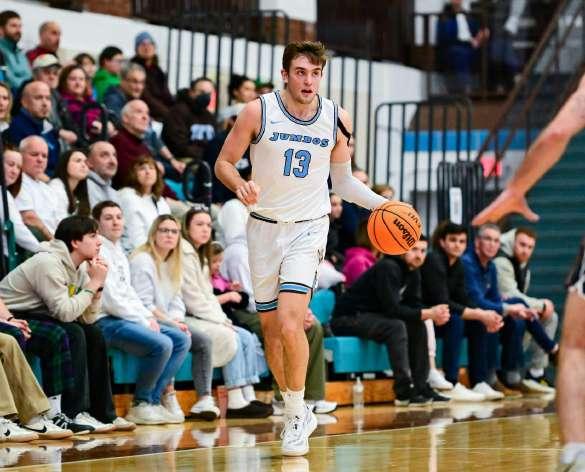
didn’t feel like I was talking to a college coach; I’m more friends with them.”
Though some other neSCaC schools were contenders in dieterle’s recruiting process, the strong relationship with the coaching staff solidified his decision to commit to the Tufts basketball program.
“My final three schools were Williams, amherst or Tufts, which are all pretty similar,” dieterle said. “I think just between that familiarity with the coaches and then being only an hour away from home, it was kind of a no-brainer.”
The pandemic, though the most devastating, was not the only disruption of dieterle’s first year. Bob Sheldon, who recruited dieterle as the head coach of the Tufts men’s basketball team, announced his retirement in October of 2020 after over 30 years at the helm. Matt Malone, his long-time assistant and Tufts’ assistant athletics director for facilities and event operations, stepped in as the interim head coach briefly before the 2020-21 season was ultimately canceled due to COVId-19.
“It was just the cherry on top to a weird freshman year,” dieterle said. “It was obviously tough because my coach had never seen me play in high school, and he had no film of me at Tufts because I didn’t play, so I felt like I was in this weird in-between phase.”
Tufts hired the men’s basketball team’s current head coach Brandon linton, in the sum -
mer of 2021, and when dieterle arrived back on campus that fall, he finally started to feel settled at college.
“I never felt like I adjusted freshman year,” dieterle said. “My sophomore year I started playing well, [and then] I got hurt. Junior year, I started off hurt. every single year has had a different piece of adversity, and I think just trying to persevere through that taught me. It all accumulated [during] senior year, having such a good year as a team and breaking a lot of records that the program has had. I felt like I wouldn’t have done that and the team wouldn’t have been able to do that without the adversity that we go through.”
as campus life ramped back up post-pandemic, basketball kicked into high gear, and dieterle had opportunities to get involved with other organizations at Tufts. Majoring in clinical psychology, he has worked in the Cognitive development lab at Tufts for the past two years, and he has served as the men’s basketball representative on the Student athletic advisory Council during his years as an upperclassman.
“academics was not the priority when I was being recruited,” he said with a laugh. “I was more just like, ‘let me get into a place and then, you know, I’ll figure it out from there.’” His uncle works as a psychologist in denver, which ultimately inspired his interest in the discipline, and he will continue his studies with a master’s in sports psychology
at Boston university next year. He will also serve as a graduate assistant coach for the Terriers’ men’s basketball team to give back to the game that gave him so much since the age of three. Playing basketball at Tufts was so much more than wins and losses for dieterle.
“Men’s basketball does such a good job connecting you with alumni. every time we go somewhere, there’s alumni coming to a game or alumni coming back to watch our practices,” he said. “So you don’t feel like it’s just your team, you can sense that there is that legacy and family … pretty much every team says it, but I feel like it’s hard to do, but we do a good job with it. … The alumni network is something that I love the most about it.”
as a soon-to-be-alumnus himself, dieterle reminisced on his favorite basketball memories. Iconic moments were not hard to come by, as his career included three neSCaC tournaments and two nCaa Tournament appearances, reaching the nCaa Sweet 16 in his senior season.
“I think my favorite memory would definitely be the win at nyu this year,” he said. “It felt like a home game because we had so many fans there, and then all the alumni came into the locker room after, and we were all just losing our minds celebrating and partying. It was just so fun because it wasn’t just our team celebrating, it felt like we had a bunch of people behind us that were celebrating, too. So, that feeling I will never forget, ever.”
SPOrTS 49 Sunday, May 19, 2024 THE TUFTS DAILY
COURTESY TUFTS ATHLETICS
Jay Dieterle plays against Middlebury on Feb. 17.
COURTESY TUFTS ATHLETICS
Greenberg is pictured before a Nov. 30, 2023 game against Cal Lutheran.
see GREENBERG, page 50
star midfielder reflects on her soccer career at Tufts
GREENBERG continued from page 49
neSCaC Second Team as well as a member of the neSCaC a ll- a cademic Team in both 2021 and 2022. These honors are a testament to Greenberg’s hard work and dedication to the game that she loves.
Greenberg’s play was a major factor in the program’s run to the nCaa division III Tournament semifinals, which she feels is her proudest achievement with the program. Going into the tournament, the Jumbos were underdogs, and the team embraced that mentality.
“We were underdogs — we had nothing to lose,” Greenberg said. “I felt like a lot of pressure was lifted off of us because we didn’t think that we would end up here. … We were just having
fun and playing soccer because we never wanted it to end, and we just wanted to enjoy every moment with each other.”
The tournament run is a memory that Greenberg and her teammates will hold onto for years to come. She could not have asked for a better way to end her soccer career.
“It was incredible being [the] underdog and being able to make it so far to the point that we got on a plane and went to Virginia,” she said. “It was an amazing way to … end my soccer career and to do it with my teammates.”
Greenberg loves her teammates just as much as she loves the game. She recounts how her teammates are the ones who really shaped her experience and made her years at Tufts unforgettable.
“My teammates are some of my best friends here and they have expressed their unconditional support both on and off the field, and they’ve just had such a great impact on me,” Greenberg said. “My soccer teammates have definitely helped shape my experience here at Tufts and they have made me into the person that I am today.”
Through all the highs and lows, Greenberg remembers how her teammates were always there for her and how they always stuck together, which helped her to form strong bonds with her teammates.
“My soccer teammates are family to me,” she said. “To have this team environment — where especially within our Final Four run, [we came] to practice each day and just [had] so much joy …
playing for each other — was just an incredible feeling.”
With her time with the program coming to an end, Greenberg is pleased with how the women’s soccer program has grown throughout her time here.
“Our program has definitely changed over time here in just amazing ways, and it has grown and it has advanced,” Greenberg said. “especially with us going to the Final Four, I feel like we’ve gotten a lot more credibility. everyone is always excited to play Tufts, and I feel like that just affirms it as well.”
Throughout her soccer career, Greenberg has learned important lessons which she hopes to pass down to younger players.
“One lesson that I’ve learned from my time here is to just really enjoy what you’re doing
and make sure you really emphasize your passion and your love for the sport — and don’t let anything get in the way of that,” Greenberg said. “Sports are extremely tough, physically and mentally. If you can find the balance between where you’re pushing yourself, both physically and mentally, but you’re also doing it [with] love for your teammates and for the sport that you play, I think that that is one of the most fulfilling aspects.” although she is sad to leave, Greenberg is extremely optimistic about the future of the program. Her impressive career, headlined by leadership and strong play, will serve as an example for many. Her impact on the women’s soccer program cannot be overstated.
Senior Profile: Swimmer Tim Chou bridges athletic and civic leadership
Madeline Mueller News Editor
Genuine kindness and care. a supportive and available presence. Character and natural leadership. These attributes are just a few ways that senior Tim Chou has been described by his teammates and coaches. as a member of the men’s swimming and diving team, Chou has become not only an exceptional student-athlete but has also served as a leader for civic engagement within the team and in the greater Tufts community.
as part of the Class of 2024, he navigated a first year without a competitive season, contributing to the new normal for team culture after the COVId-19 pandemic. Throughout his career he regularly scored points in regular season meets as well as neSCaC championships. However, where Chou has stood out to his peers and coaches is in his leadership on the team. In addition to time spent training and competing, Chou served as a Tisch College civic life ambassador on the team as well as a leader for Team IMPaCT, a mentorship program where college sports teams are paired with children with serious illnesses or disabilities. His leadership both in and out of the pool led the coaching staff to give Chou the coaches’ award this year, alongside teammates senior Jerry yang and sophomore armaan Sikka.
“Over 4 years Tim has become a leader on our team through his consistent behaviors – both athletic and personal, as well as his composure in training, competition, and social settings,” head coach adam Hoyt wrote in an email to the daily. “[He] delivers a high work ethic, an open mind, a supportive and available presence, and positivity on our team. This consistency makes Tim stand out and thus we wanted to celebrate the contribution he made to our team through the Coaches award.”
Chou felt encouraged by his coaches to discuss and partici-

pate in civic engagement work on the team.
“[The] coaches have been instrumental to my development, as a person, not just as an athlete,” Chou said.
Chou helped lead events for Team IMPaCT. The Tufts swim and dive team just had their first signed participant graduate from the program after three years; Chou and other members of the team joined in on a pool party to celebrate their mentee’s achievement.
as a civic life ambassador, he also organized volunteer events for the team in partnership with Tisch College, engaging with the local community through events such as Community Sports day and the Malden river cleanup.
“I think his high level of engagement in civic life and community involvement speaks volumes about his character and natural leadership in a really positive way,” avery newcomer, fellow civic life ambassador and swimmer wrote in an email to the daily. “I most admire Tim’s genuine kindness and care for
other people and the community that surrounds him.”
However, Chou’s civic engagement work was not restricted to members of the swim team.
In his sophomore year, Chou enrolled in the Tufts With rwanda Fellowship, an experimental College course. after taking the course, he was inspired to participate as a leader; this year, he is coordinating the course alongside newcomer.
“The Tufts with rwanda Fellowship is a yearlong program through Tufts Hillel, the Cummings Foundation, and exCollege, that is centered on genocide education, building international relationships, and empowering participants to become global ambassadors for their community,” newcomer wrote. “We will use what we learn abroad to ignite action within our own community in the hopes of decreasing and eventually ending mass atrocity and continuing education.”
Chou was first led to the course during his sophomore year when it was coordinated by
another member of the swim and dive team, something he is mirroring for his teammates now.
“That experience and learning about what my teammate was doing has shaped my own experience, which has been invaluable,” Chou said. “It felt like [the course] was out of my comfort zone, but now I’ve led it myself my junior year, and now I’m leading it again my senior year.”
newcomer has appreciated the opportunity to lead the program along with Chou.
“I feel really grateful I’ve been able to be Tim’s co-coordinator,” she wrote. “He’s been a constant pillar of support and leads by example, handling road bumps calmly and with dignity.”
Chou’s growing understanding of the history of r wanda has led him to focus on ways to engage in the region outside of educating his peers.
Chou and fellow senior Cora Cunningham were recently awarded a $10,000 grant through the Tisch College Projects for Peace program; the pair will be working with
the n GO Move up Global to implement their project, which focuses on a potential healthcare and education-focused intervention around clean water and disease in the rural Musanze district of r wanda.
Chou’s favorite part of his time on the swim team has been a family-like team atmosphere, and he credits his teammates from the Class of 2024 for taking a major role in shaping the team’s attitude and goals during the return to competition.
“We didn’t have our season [because of] COVId our freshman year,” he said. “We’ve come far within the past three years in terms of cohesivity, getting back into the tenacity needed to be competitive. … My teammates, especially my classmates in the senior class have [developed] together.”
The team has its sights set on a neSCaC championship win, a goal that has been getting closer each year. The men’s and women’s teams both finished second at the championship meet this year.
SPOrTS 50 Sunday, May 19, 2024 THE TUFTS DAILY
TUFTS ATHLETICS
COURTESY
Tim Chou is pictured in the Feb. 2 meet against Hamilton.
In photos: Tufts in bloom
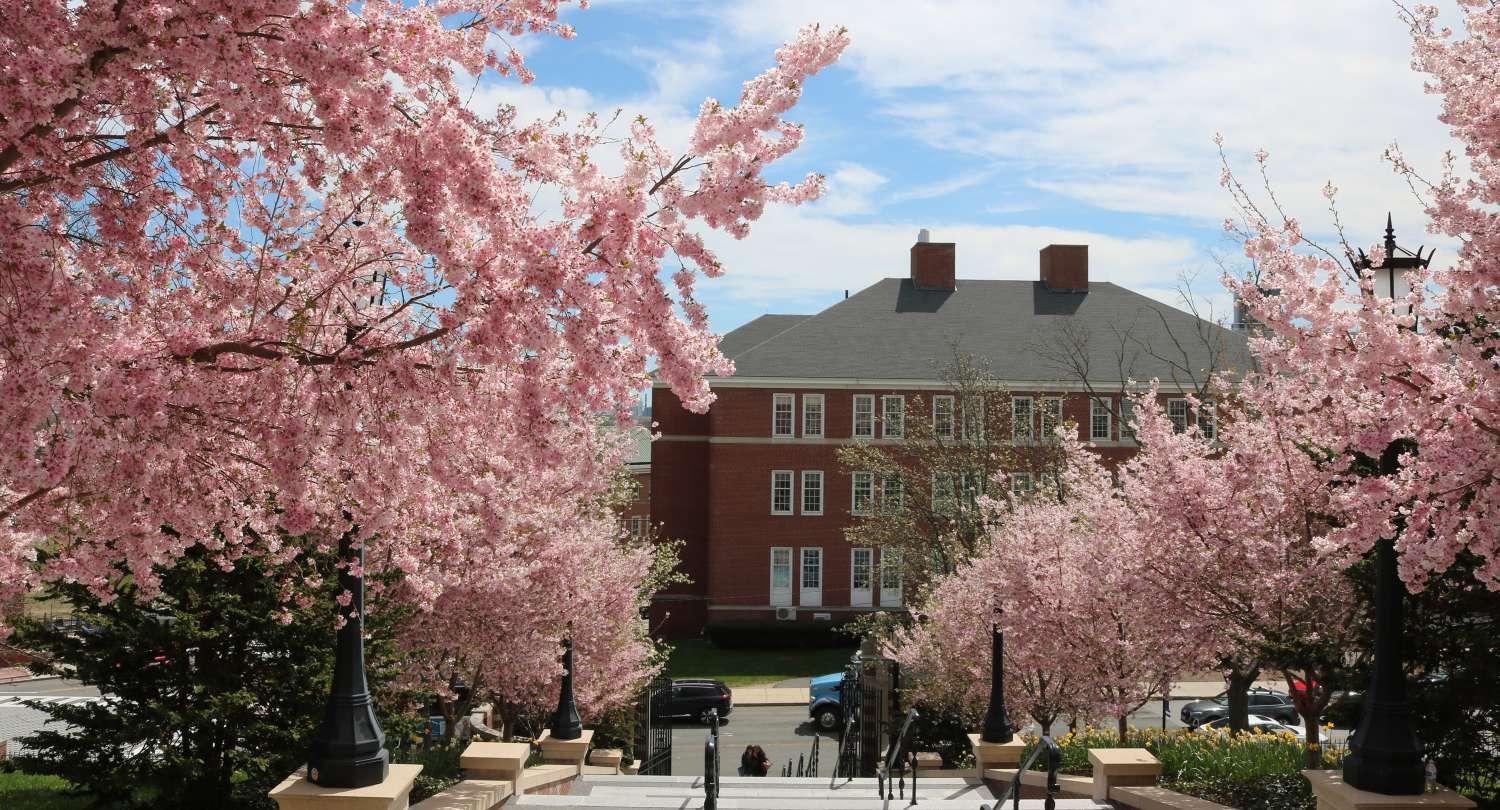
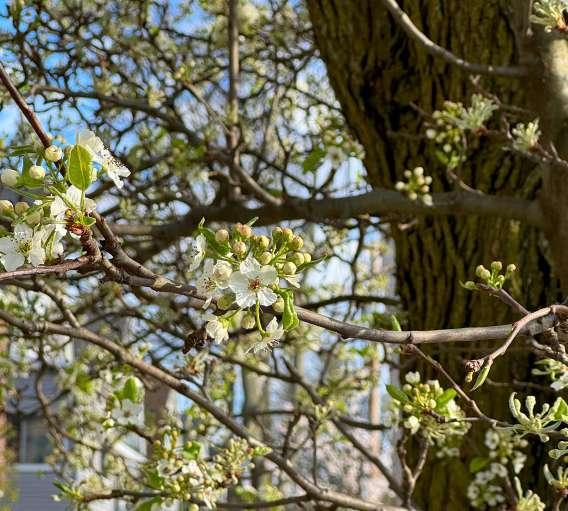
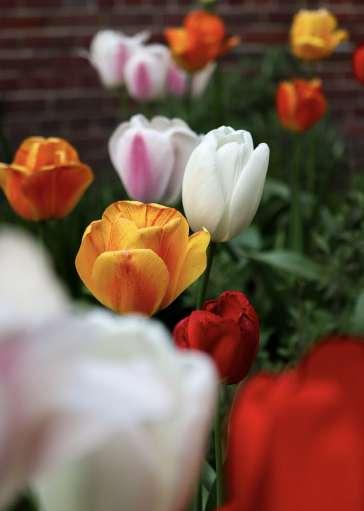
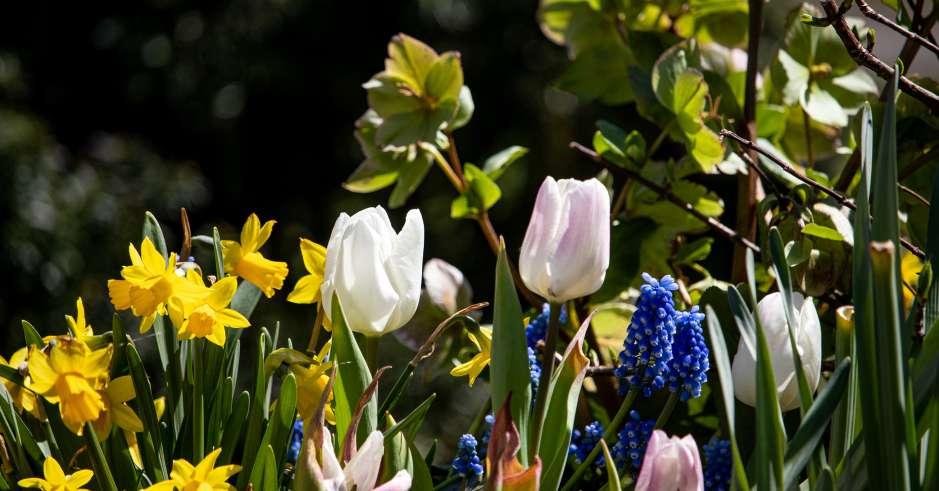
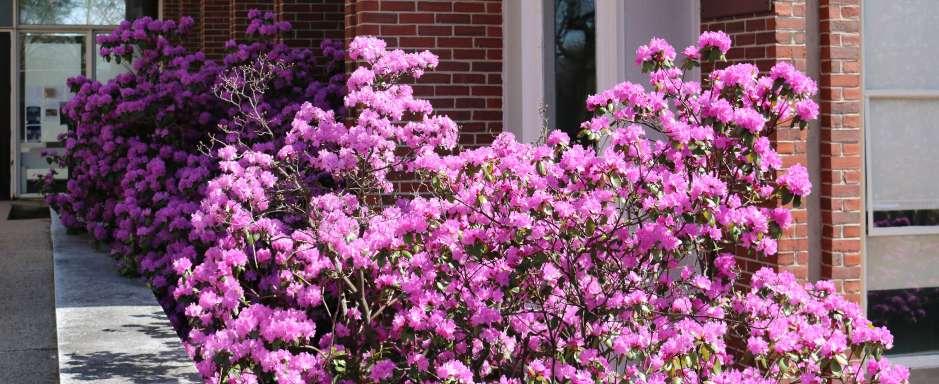
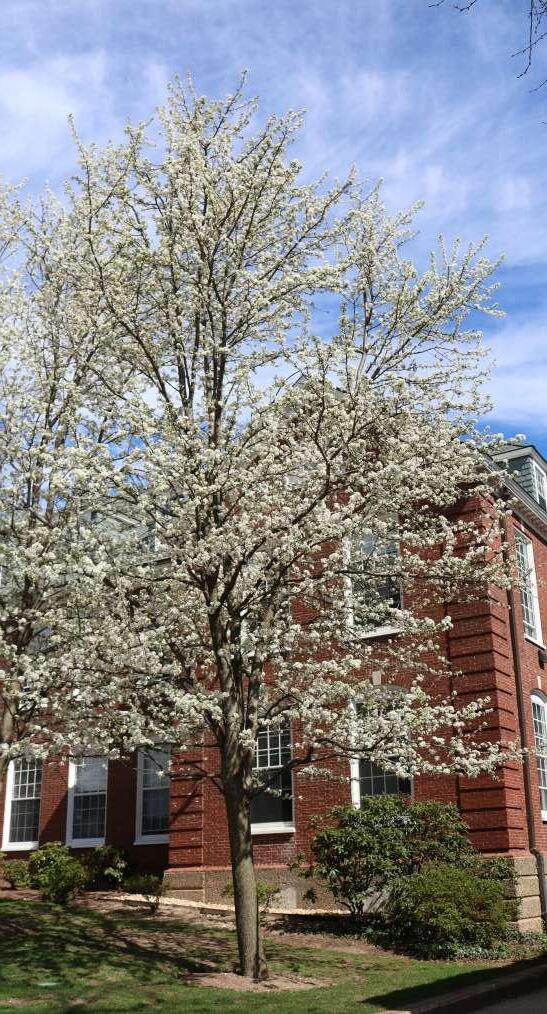
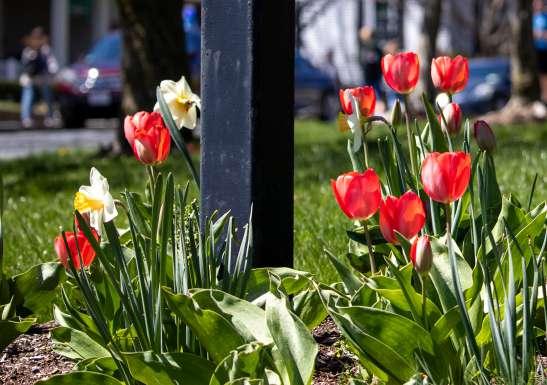
PHOTOS 51 Sunday, May 19, 2024 THE TUFTS DAILY
PHOTO CREDIT: VERONIKA COYLE, ARI NAVETTA AND CHARLENE TSAI
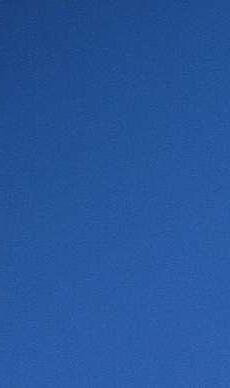
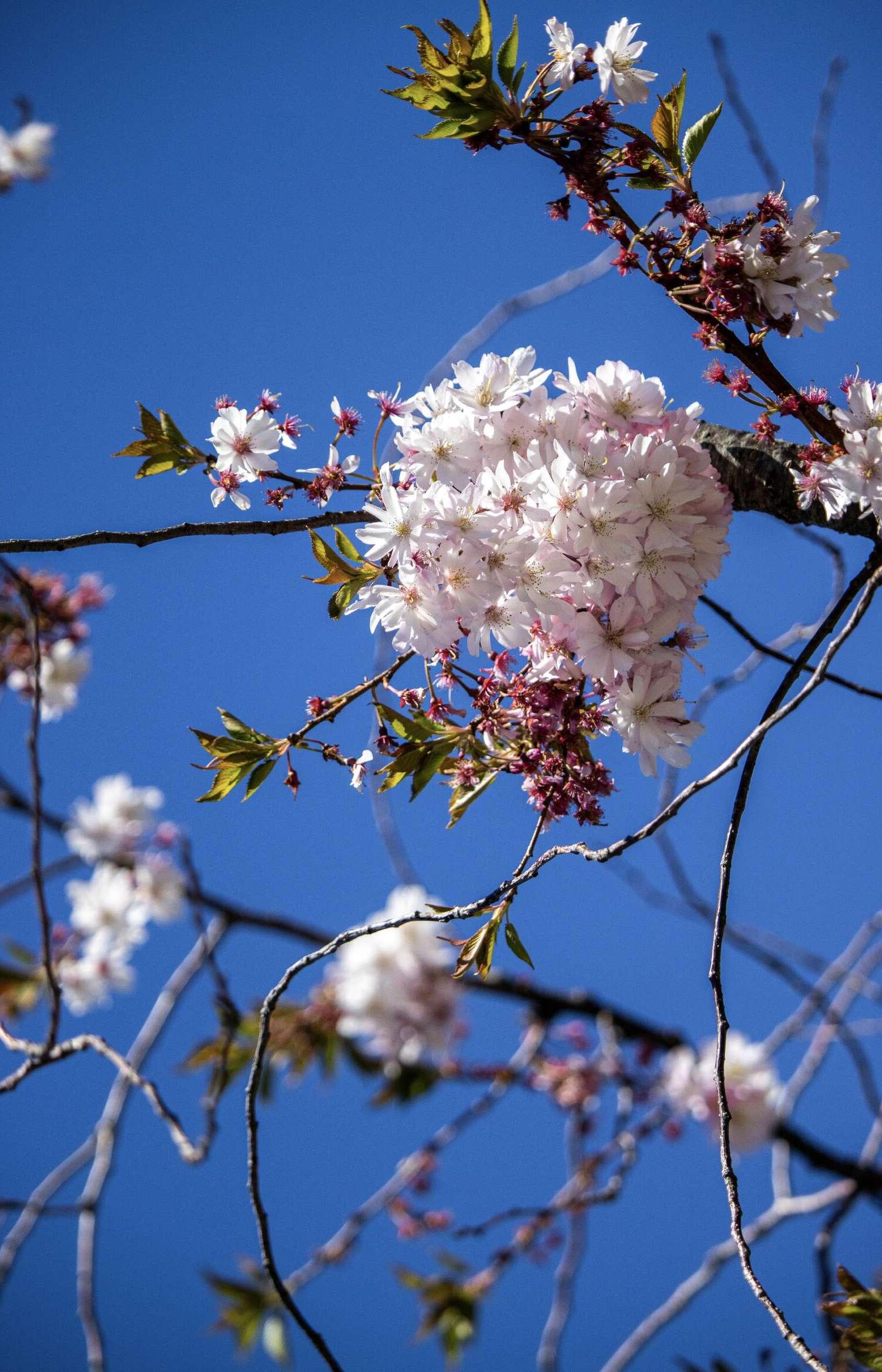
–Mary Oliver “
Tell me, what is it you plan to do with your one wild and precious life?”
COMMenCeMenT 2024 52 Sunday, May 19, 2024 THE TUFTS DAILY





























 Almer Yu Staff Writer
Almer Yu Staff Writer


































































































